
Public Engagement
A core mission of the Sainsbury Wellcome Centre is to contribute to society through a better understanding of brain function. We engage with a variety of audiences including school and college students, the local Fitzrovia community, and groups currently under-served by university engagement and in particular scientific branches of study.
Everyone at the Sainsbury Wellcome Centre is encouraged to take part in public engagement activities with the goal of generating mutual benefit and enhancing the quality and impact of our research. Support is provided through training opportunities and Public Engagement Network meetings.
What is the Public Engagement Network?
The SWC Public Engagement Network (PEN) is open to all students, researchers and staff members at the SWC and the Gatsby Computational Neuroscience Unit (GCNU). The Network is for those who have an interest in, or experience of, public engagement.
Network members meet frequently to share, reflect and develop ideas for engagement activities and discuss upcoming opportunities. Members also receive regular emails outlining available opportunities and ways to get involved.
If you are a student, researcher or staff member at SWC or GCNU and would like to join the Network or learn more about public engagement opportunities, please contact our Communications and Engagement Team.
Ongoing activities
November 2021 to present – In2research
SWC is delighted to be supporting In2Research, a STEM programme developed by social mobility charity In2scienceUK that empowers undergraduate students from under-represented backgrounds to progress to postgraduate research.
- In the 2021-2022 academic year, four mentors from SWC and GCNU were selected to take part. The researchers were paired with mentees to provide guidance on career skills and research placement opportunities.
- In the 2022-2023 academic year, two mentors from SWC and GCNU were selected to take part and two SWC/GCNU applicants were selected to host summer placements.
- In the 2023-2024 academic year, three mentors from SWC were selected to take part and four SWC applicants were selected to host summer placements.
- In the 2024-2025 academic year, four mentors from SWC were selected to take part and four SWC applicants were selected to host summer placements.
As part of the inaugural year, SWC was pleased to host an In2Research Away Day where the participants met face-to-face for the first time and developed their networks and skills. To mark the successful completion of the first year of the new STEM programme SWC also hosted a Celebration Event where In2research students presented posters on their research projects and networked with peers, mentors, and supporters.
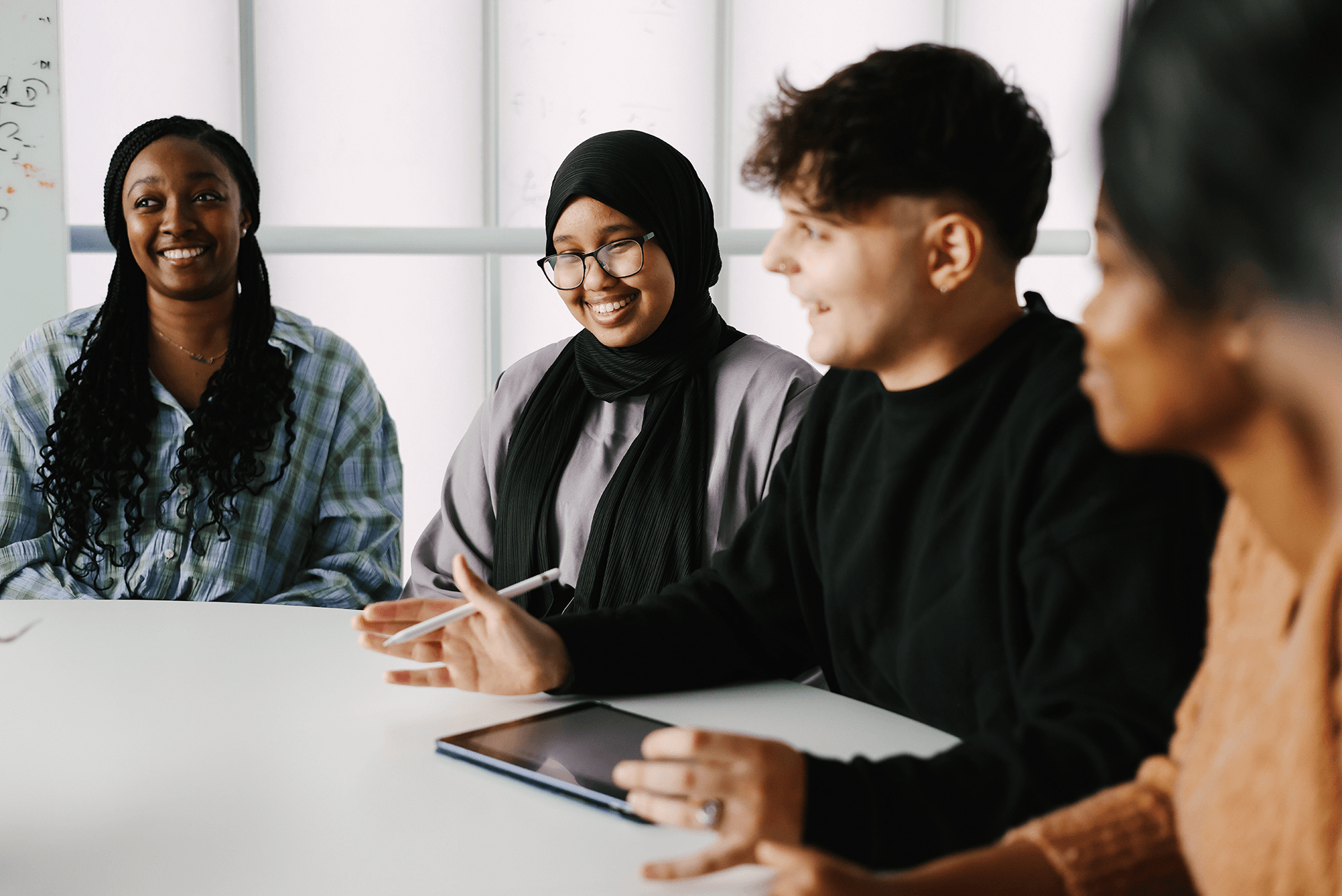
Image credit: Amanda Summons Creative
Past activities
December 2025 - The SWC Lecture - The science of reading: From neuroscience to the classroom
We were delighted to host Professor Stanislas Dehaene, Chair of Experimental Cognitive Psychology at the Collège de France in Paris and Director of the NeuroSpin centre, for the 2025 SWC Lecture.
Stanislas’ talk explored how learning to read is a powerful milestone that transforms the developing brain. His research shows that the brain learns to read by reusing circuits evolved for recognising faces and objects, adapting them to rapidly identify written words. New evidence from humans and monkeys is uncovering the neural codes that underlie reading, and helping to explain why dyslexia can take different forms. He also highlighted how insights from the science of learning are being applied in classrooms and guiding evidence-based education reforms in France.
We were pleased to welcome colleagues from across UCL, educators, and members of the local Fitzrovia community to the SWC. Illustration by Petra Korlević.
November 2025 – Exhibition
We were delighted to host "The art and legacy of Santiago Ramón y Cajal" travelling exhibition for its final stop, following a successful trip through Manchester, Bristol, York and Edinburgh. Organised by the Society of Spanish Researchers in the UK, the exhibition opened with an event on 7 November, featuring talks from Dr José R. Alonso, University of Salamanca, and Professor Zoltan Molnar, University of Oxford, who spoke about Santiago Ramón y Cajal's life and work.
The exhibition was open to the public on Fridays and weekends from 7 - 30 November, offering a fascinating insight into the life and work of Santiago Ramón y Cajal, widely regarded as the “father of modern neuroscience.” It showcases his transformative contributions to the field, bringing his legacy closer to the UK public.

October 2025 – In2Research alumni event
On 14 October we hosted a panel discussion and networking event for In2research alumni and In2careers members. The panel included SWC PhD student Shanice Bailey, SWC Scientific Coordinator Svenja Nierwetberg, SWC Senior Research Fellow Oli Gauld, and SWC alum Matthew Phillips, Product Engineer at Electric Twin, and Mehran Ahmadlou, Group Leader at University of Oxford. The panel discussed their PhD journeys and careers in research and industry. Audience questions included “what skills do you need to do a PhD?” and “how do you keep going when things get hard?”
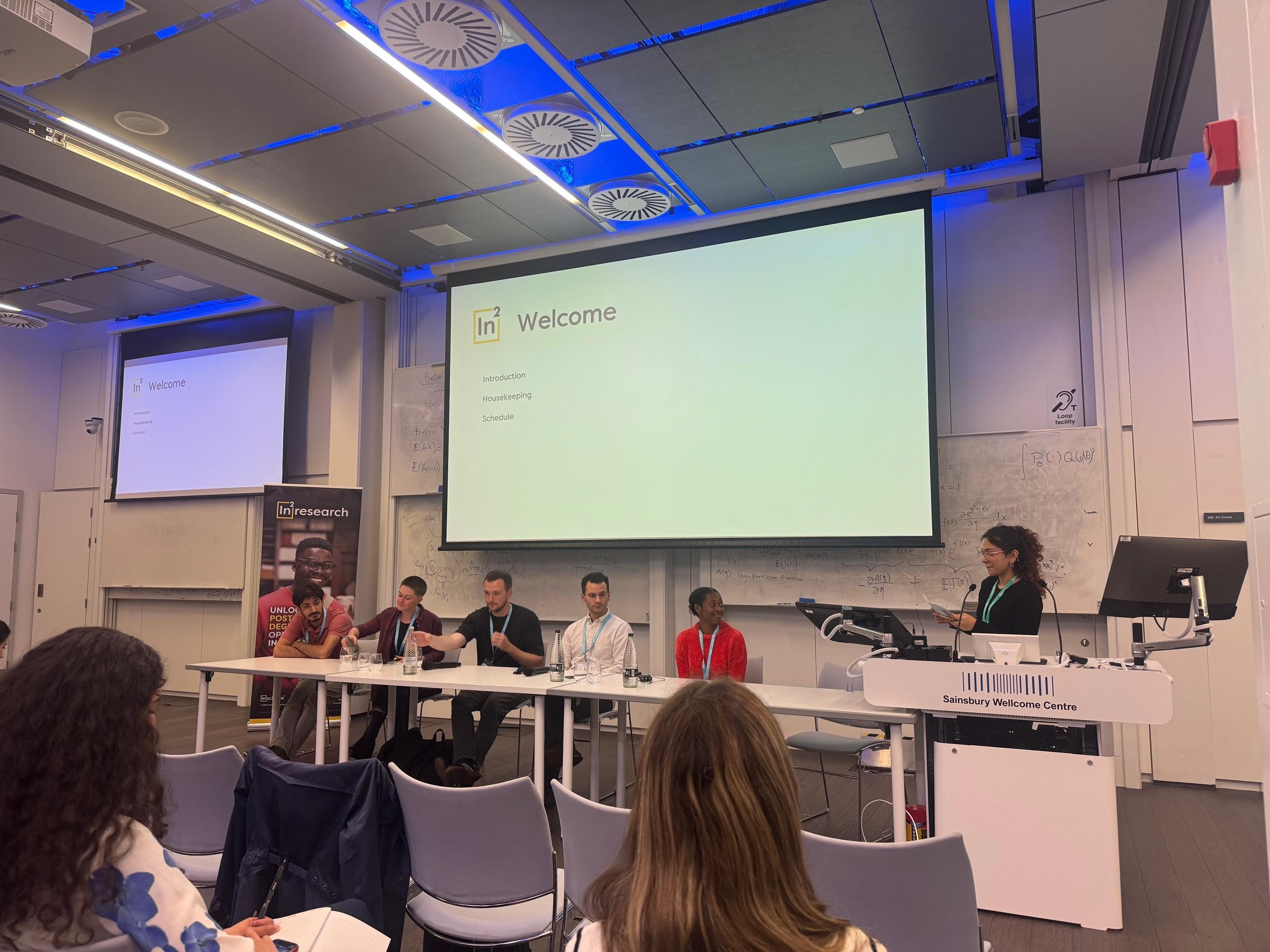
August 2025 – In2STEM placement
From 11-15 August, two college students from the In2scienceUK In2STEM programme joined Deren Aykan in the Hofer lab to learn more about careers in research. In addition to shadowing Deren in her role as Senior Research Technician, the students gained insights into how researchers approach questions about the brain and behaviour. Throughout the week, they observed the different methods, tools, and techniques we use at the Sainsbury Wellcome Centre to advance our understanding of neuroscience
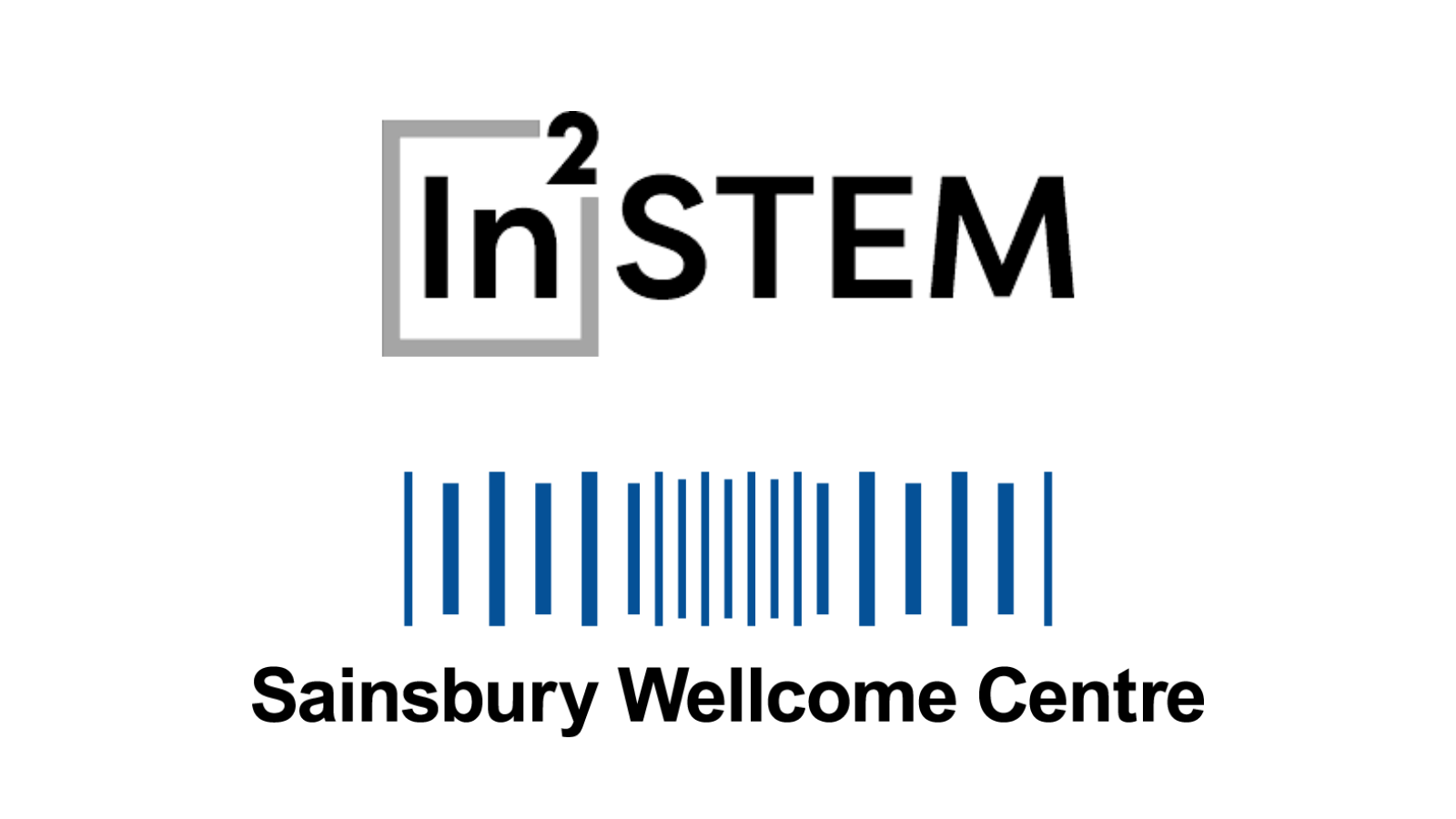
August 2025 – Bridging the Future summer school
SWC PhD student Sumiya Kuroda volunteered as a teaching assistant at the Bridging the Future summer school in August, together with Antonin Blot (SWC alumni), Marcelo Moglie, and Basma Husain from Francis Crick Institute. This programme at University College London is designed for young people who are passionate about science, technology, engineering, or mathematics and is open to students from refugee, asylum-seeking, and forced-migrant backgrounds. Sumiya delivered lessons on neuroscience, by demonstrating how neurons work through live cricket experiments — recording their electrical activity and stimulating their muscles.
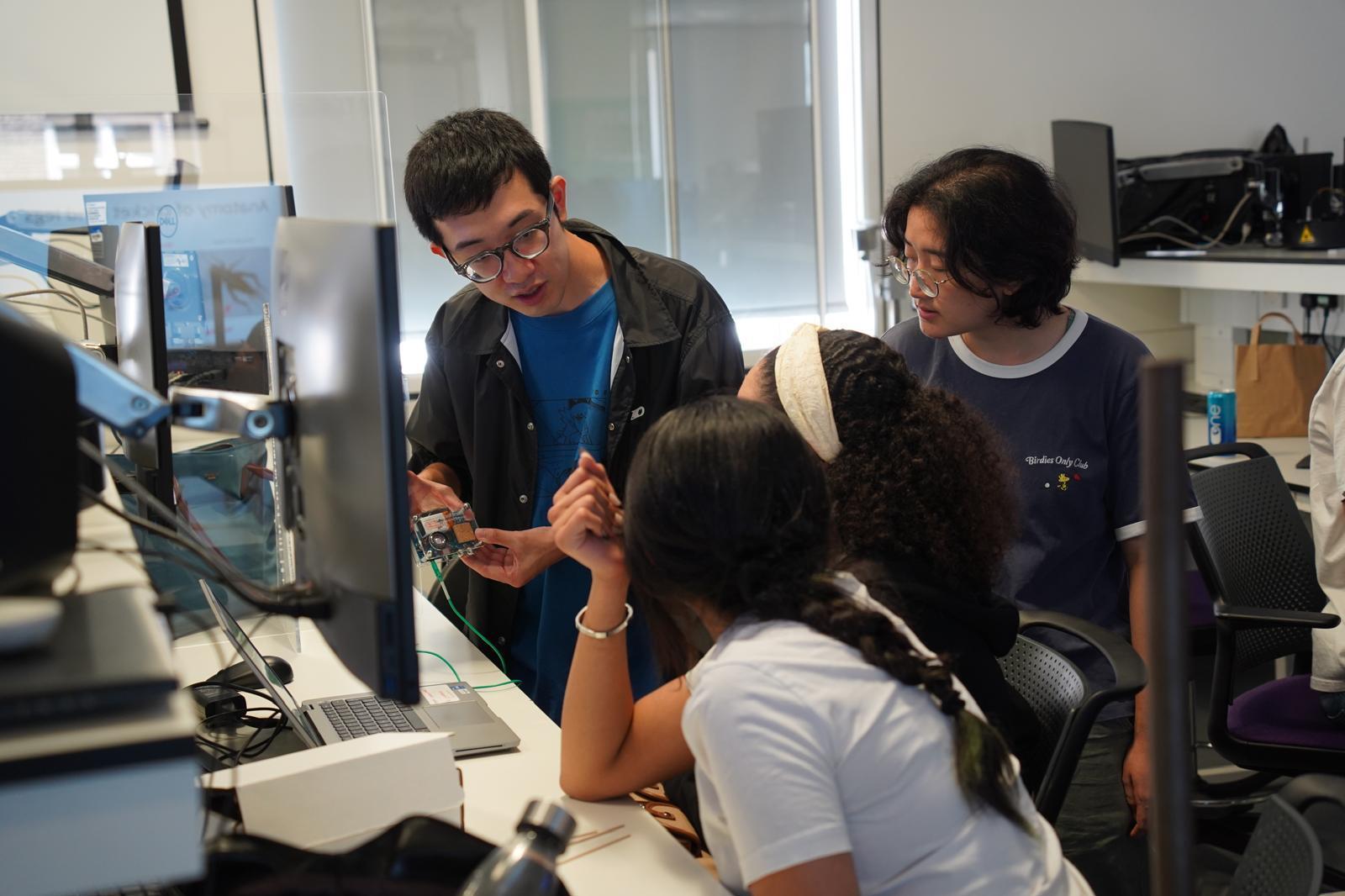
Summer 2025 – Neuronauts
From 28 July to 8 August, 18 secondary school students (aged 14-17) from across London took part in the Neuronauts 2025 summer camp at SWC. First launched in 2022, this year’s programme was delivered by a dedicated team of PhD students and early-career researchers from SWC and the larger UCL community. Over the two weeks, participants learned about electrical engineering, computer science, artificial intelligence, and performed computer-vision experiments with live fruit flies, provided by the Jepson Lab. They also toured the labs and met staff and students working at SWC. During the second week, the students worked together on group projects, including an EMG-powered robot arm! The summer school concluded with a showcase presentation to the SWC and GCNU community. Find out more about Neuronauts.
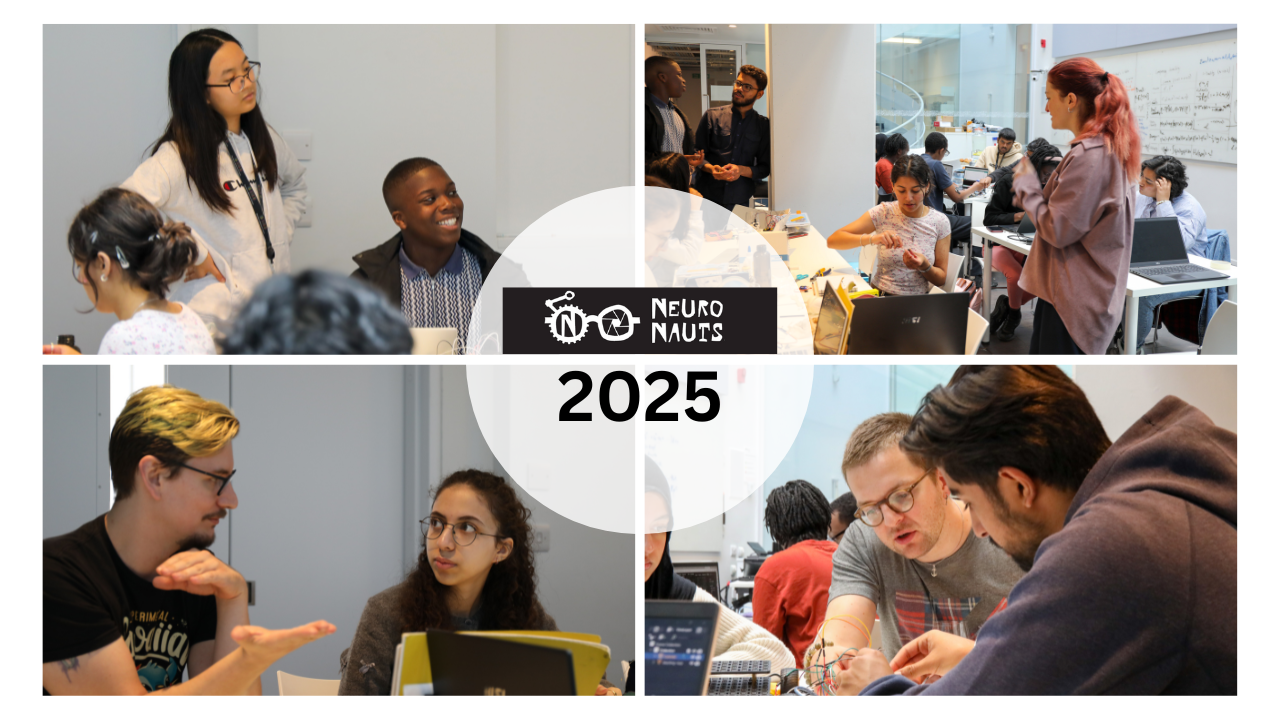
July 2025 – TReND, CaMinA
We were delighted to support the 2025 Computational Neuroscience and Machine Learning Basics (CaMinA) course, in partnership with TReND – a charity dedicated to enhancing scientific capacity across Africa. Following the success of the 2024 and 2023 programmes, this year marked the third iteration of the course. From 7th-23rd July, over 25 students and faculty working in Africa gathered at the University of Zambia, joining more than 20 international researchers (and one stray cat) for an intensive programme covering the fundamentals of computational neuroscience and machine learning. Among the instructors were SWC PhD student Tom George and two other SWC affiliates - Kim Stachenfeld and Svenja Küchenhoff (Behren’s Labs) - who shared their expertise. In addition to a deep dive into computational neuroscience, the course fosters essential connections that help the field flourish across the continent. Many past participants have gone on to secure placements in prestigious master’s and PhD programs worldwide as well as in our own Gatsby Bridging Programme.
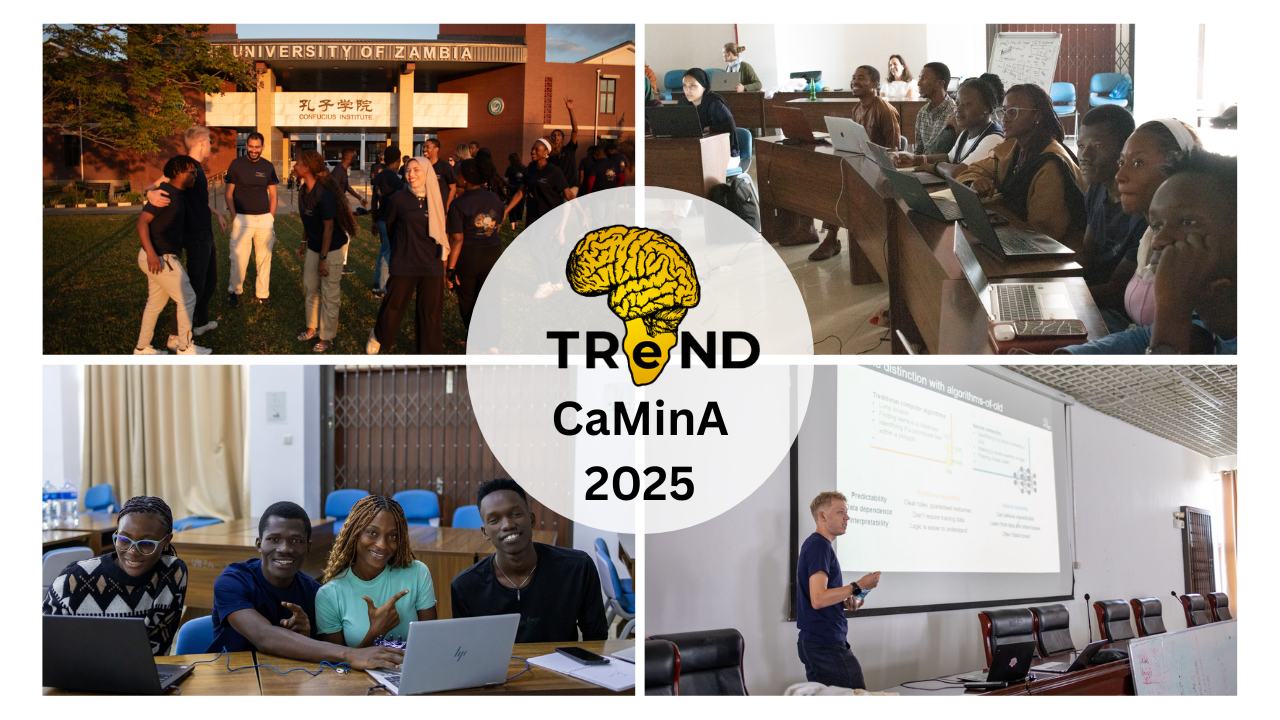
July 2025 – BrainCamp Kosovo
The eighth BrainCamp Kosovo took place from 6-12 July, 2025. Founded and organised by SWC PhD alumni Egzona Morina, the camp aims to introduce neuroscience education and career opportunities to young people in Kosovo. The programme was organised in partnership with the Xheladin & Xhufe Morina foundation, the ATOMI Institute and the Innovation Centre Kosovo. Over the course of the week, participants engaged in lessons on neuroscience, covering the history of neuroscience, neuroanatomy, cell types, daily responses, neuroscience and disease, animal models, AI and coding in neuroscience, neuroprosthetics and neuroethics. There was also an interactive day and debate, and a BrainCamp quiz. Five SWC volunteers taught on the course: Roshni Patel, Laura Porta, Sara Mederos, Athina Apostolelli and Shohei Furutachi.
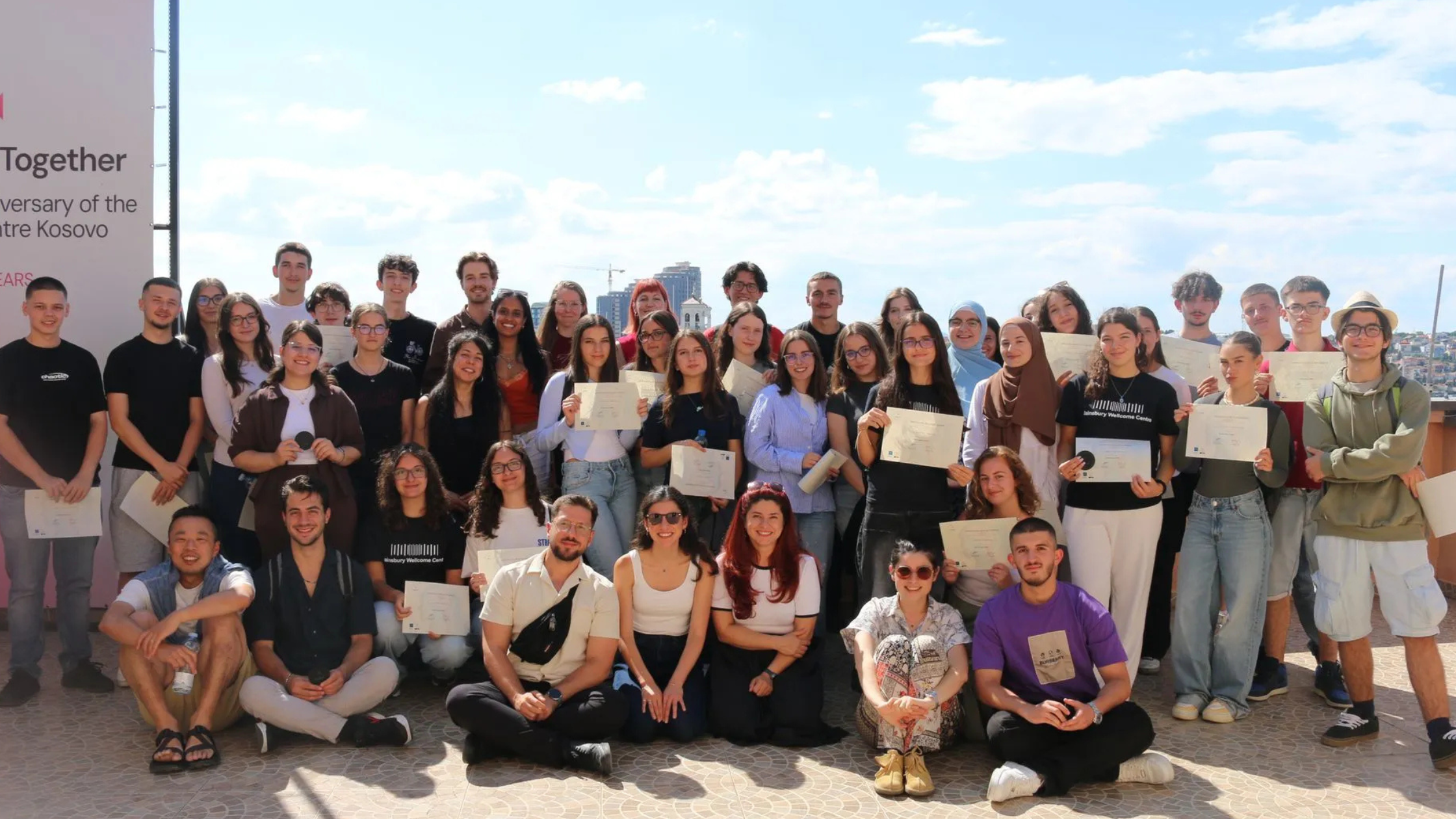
July 2025 – Camden STEAM work experience
On Wednesday, 9 July, we hosted 14 A-Level students at SWC and the Gatsby Computational Neuroscience Unit, as part of a Camden STEAM work experience week across the Faculty of Life Sciences at UCL. Following opening talks, the students took part in a live demonstration of how our brains and muscles are controlled with electricity. They also toured the advanced microscopy facilities, engineering workshop, and got a glimpse of one of our crab habitats, a.k.a. ‘crabitat’. Throughout the day, the students discussed neuroscience careers with a diverse range of staff, from PhD students to technicians to clinical research fellows.
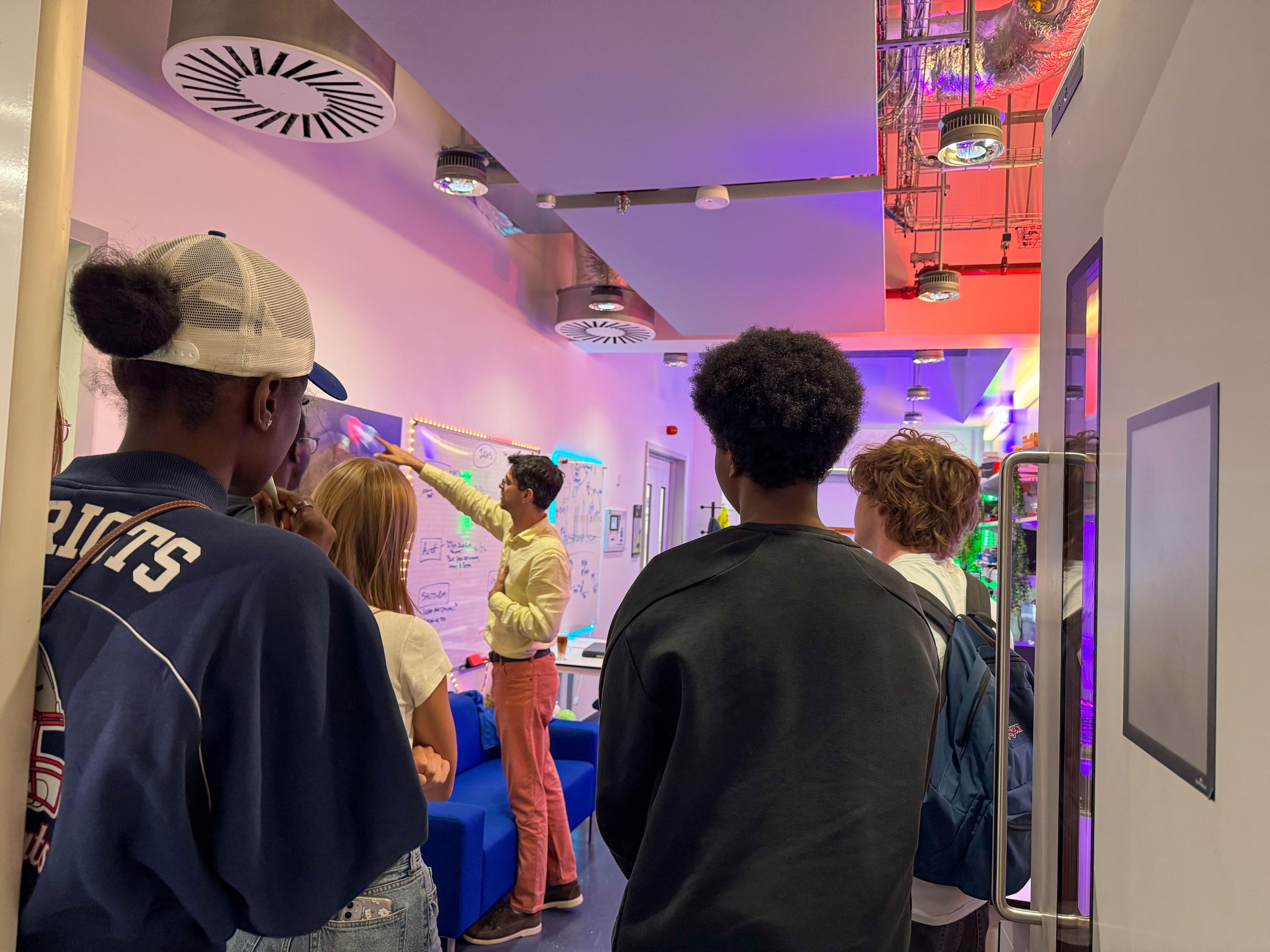
July 2025 – Bringing neuroscience and the 3Rs to life in Rhydywaun School in Wales
Supported by a grant from the NC3Rs, we were delighted to visit Rhydywaun Comprehensive School in South Wales on 9 July. Following a series of short talks on experimental and computational neuroscience and the 3Rs, over 60 students took part in two hands-on workshops. The first workshop focused on how researchers care for laboratory animals, with a special focus on enrichment practices and refinement. The second workshop focused on computational neuroscience and replacement. It began with a demonstration of the Human-to-Human Interface, where the “controller” wore EMG electrodes on their forearm to capture muscle activity, and the “receiver” (a teacher volunteer) had electrodes placed near their ulnar nerve, allowing their arm to be moved involuntarily. The students also took part in an interactive exercise, where they successfully cooperated to simulate a neural network model. The winning teams were awarded neuroscience books signed by Nobel Laureate John O’Keefe. All students captured their experience by writing a postcard to their future selves on what they took away from the session.
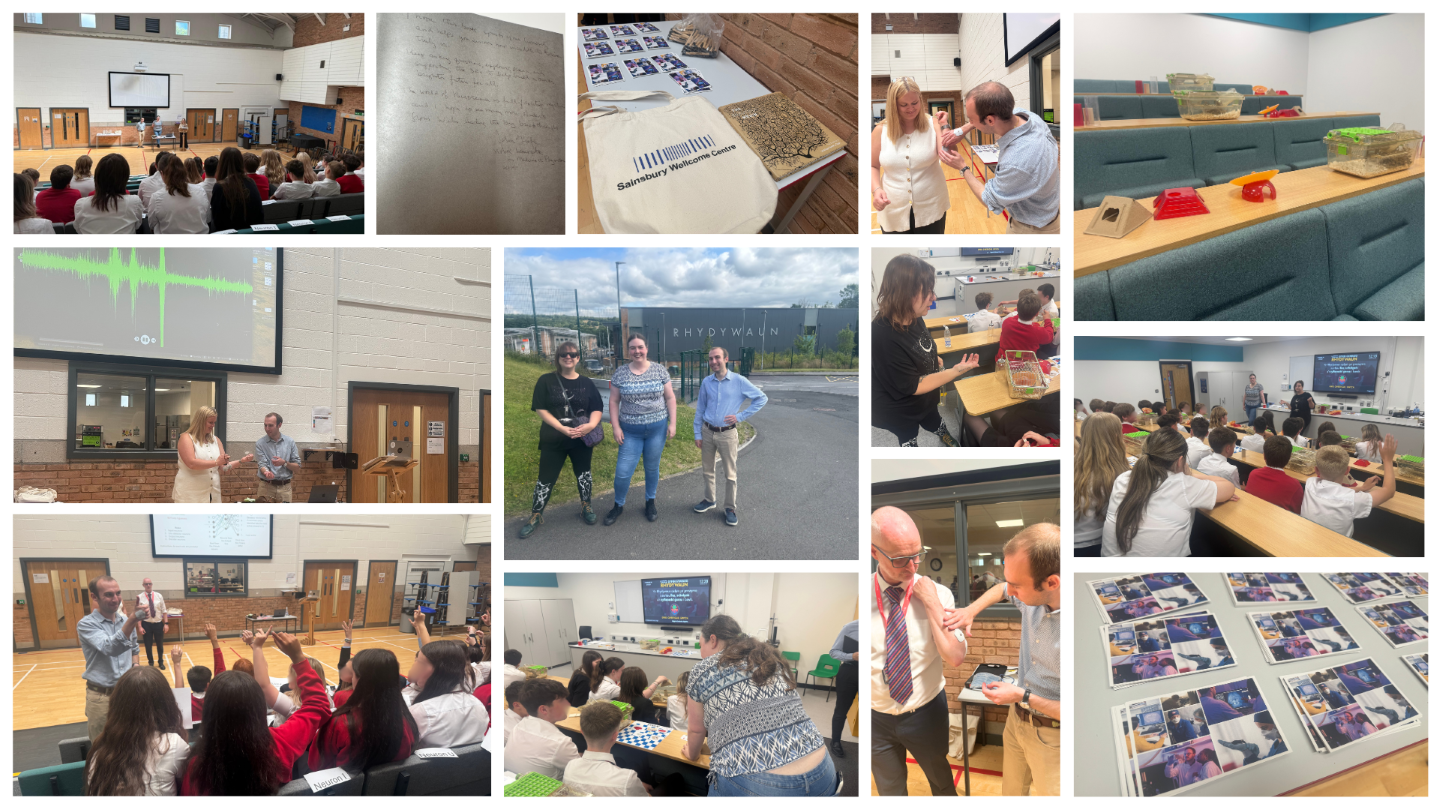
July 2025 – Reimagining Scientific Imagery
Artist Mary Yacoob was commissioned by UCL’s Faculty of Life Sciences to create a series of artworks in collaboration with scientists. The resulting large-scale cyanotype prints were unveiled at an event on 1 July 2025, hosted at the Sainsbury Wellcome Centre. The evening included talks from the artist and researchers, offering insight into the creative process and inspiration behind the works. Among the collaborations were pieces developed with Dr Isabell Whiteley, Imaging Specialist at SWC, and Clémentine Dominé, PhD Student at the Gatsby Computational Neuroscience Unit. The event also featured a panel discussion exploring how we interpret data, the nature of collaboration, and the shared ground between art and science.
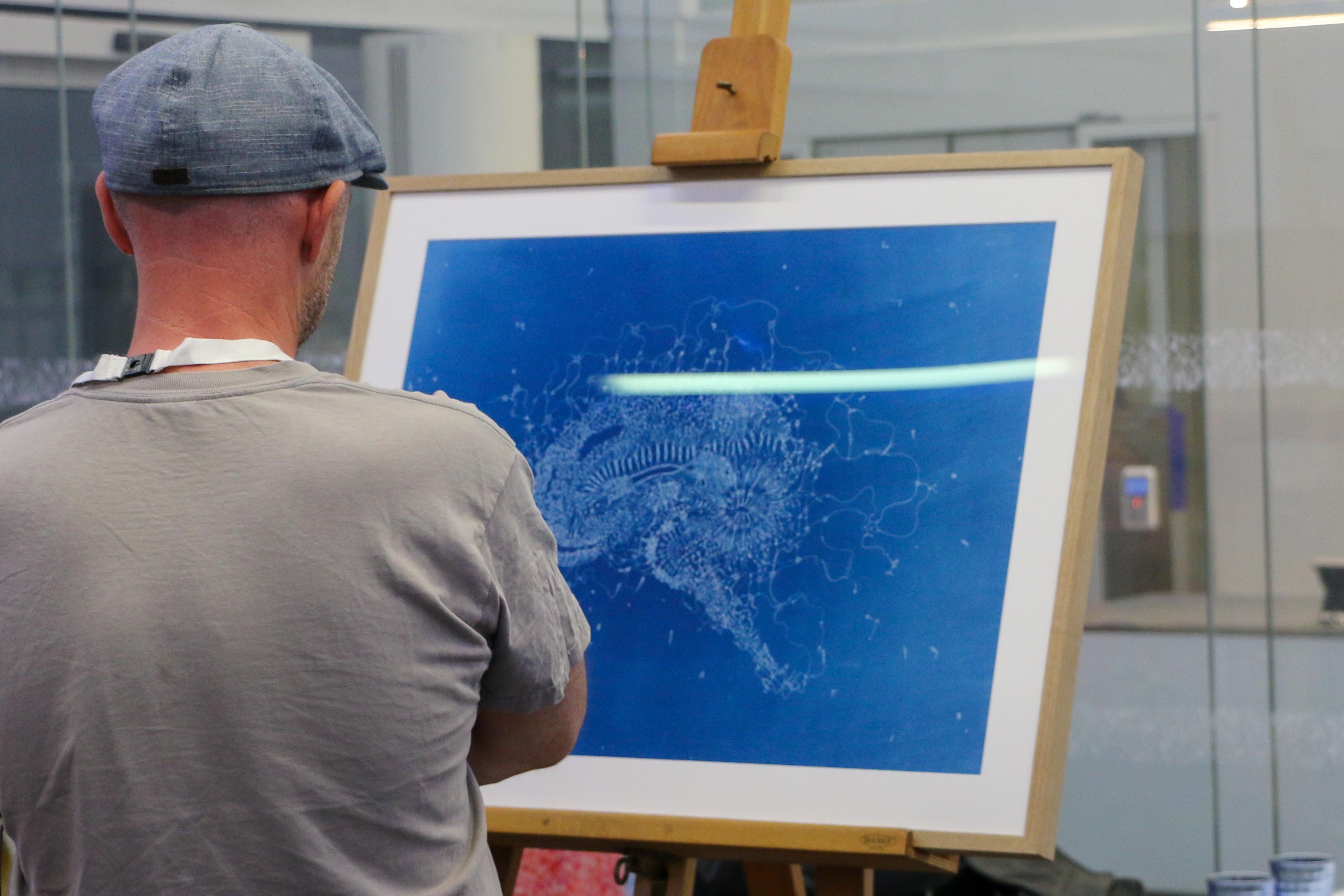
June 2025 – The Big Bang Fair
From 17-19 June, we exhibited at The Big Bang Fair, an annual science event in Birmingham. We met hundreds of STEM educators from schools around the UK and had some great discussions about nurturing the next generation of neuroscientists and the varied careers available to young people. Many thanks to all our volunteers, including Simon Townsend, Max Townsend, Jessica Broni-Tabi, Svenja Nierwetberg, Shanice Bailey and Chantelle Day.
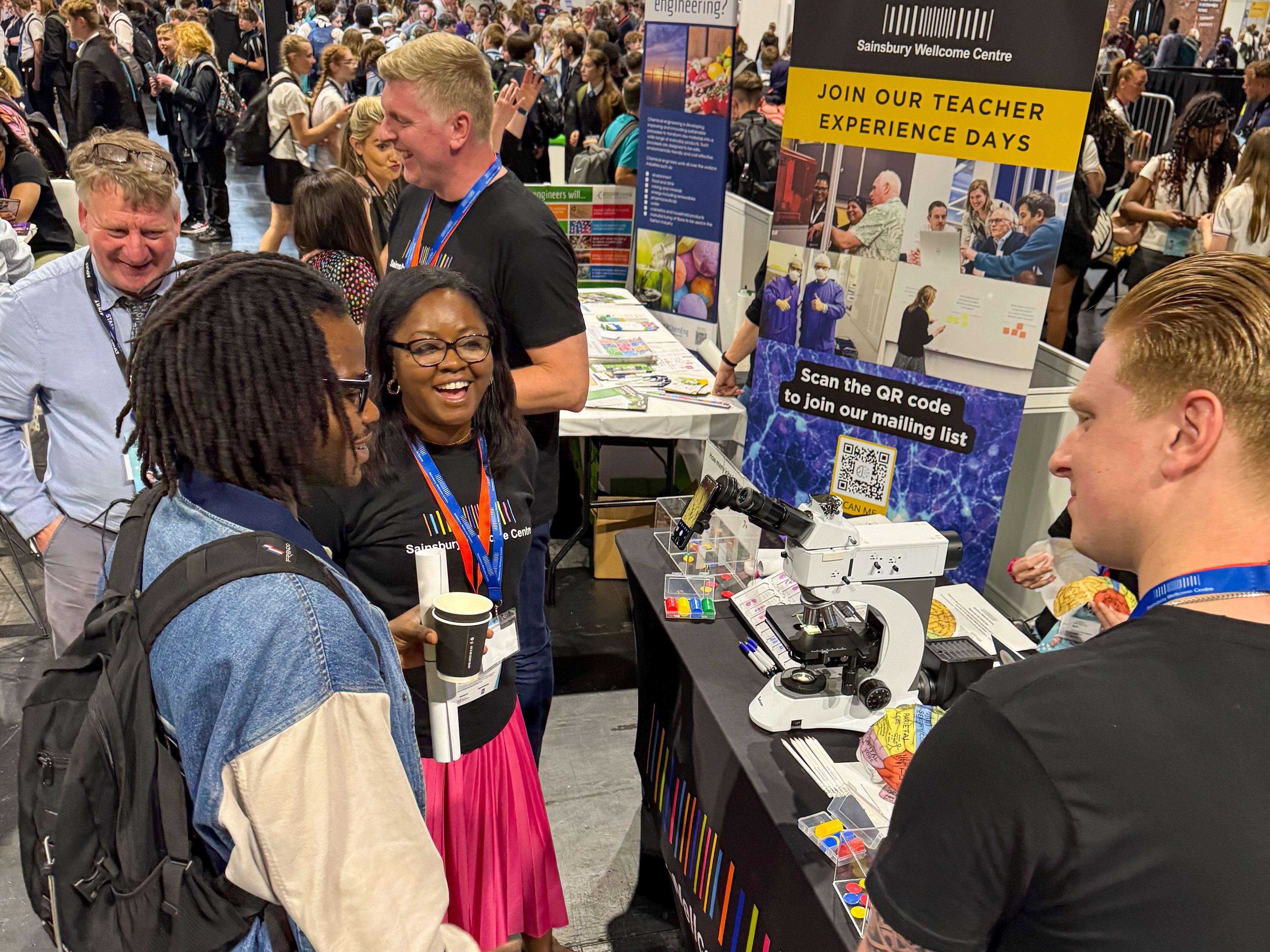
As part of the fair, we also ran our Brain Hat Competition - congratulations to Hastings High School for their winning entry! (Pictured below). We look forward to welcoming them to SWC for an exclusive tour of our labs.
Want a brain hat of your own? Access free teaching resources.
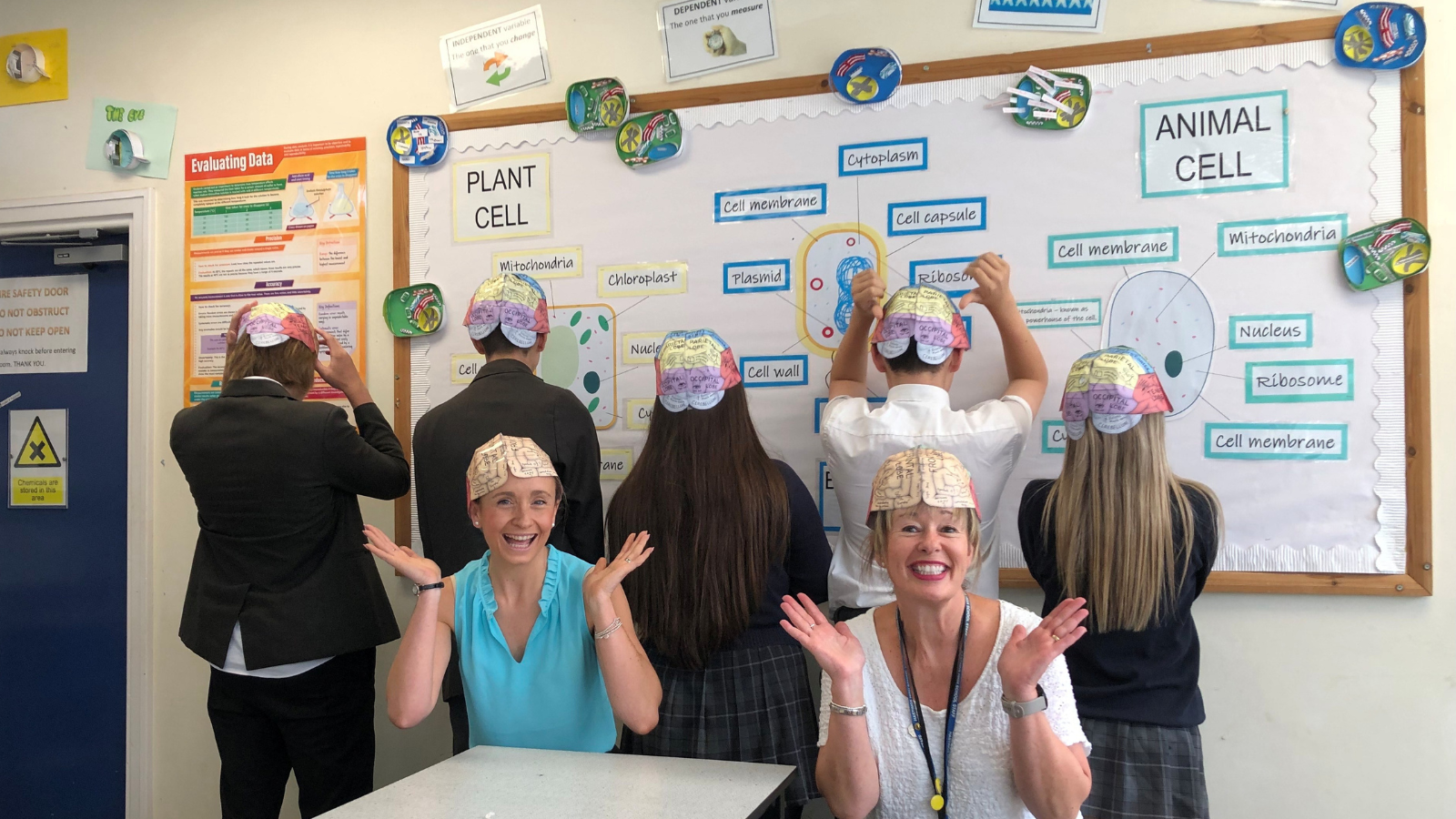
June 2025 – Fitz&Sits
We were proud to sponsor a Fitz&Sits seat to provide a welcoming space for people to sit, reflect, and connect. ‘The Junction’, designed by Yaobin Wang and Zixin Ye was positioned at the heart of Fitzrovia over summer 2025, serving as both a landmark and a wayfinding point.
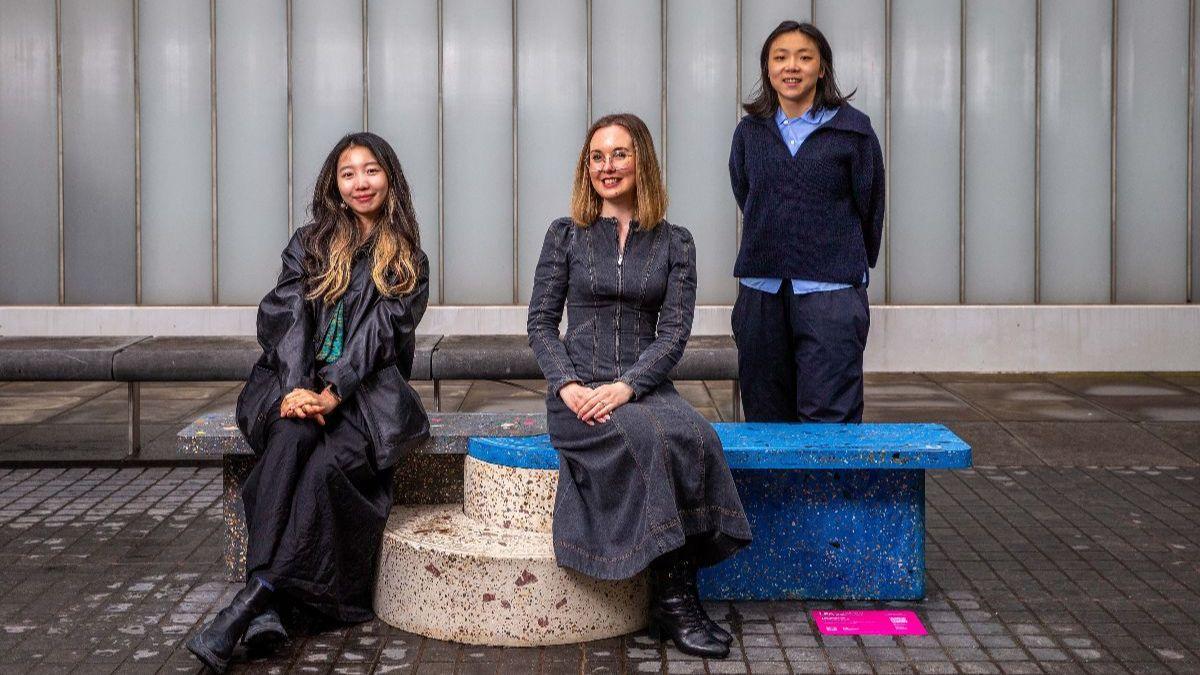
We were also excited to use the space to host ‘The Travelling Drawing Club’ — an art workshop for the public. Find out more about Fitz&Sits and the public art event
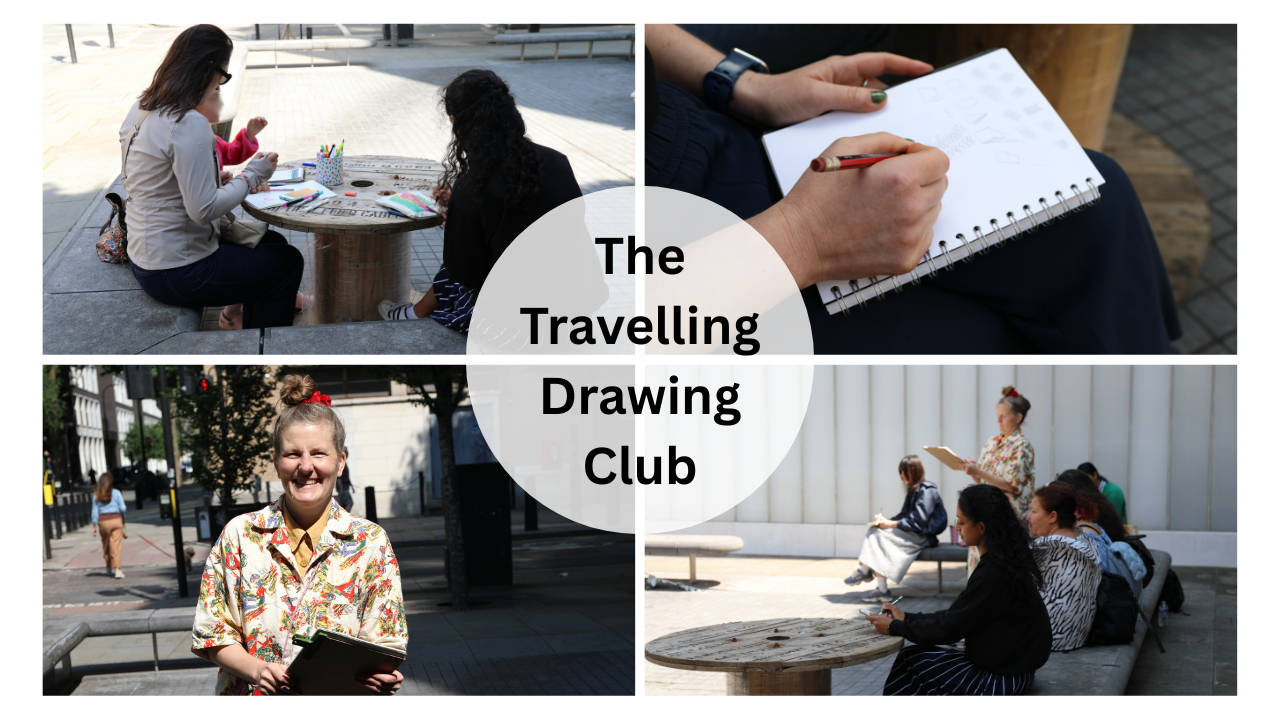
June 2025 – In2STEM London Induction
On Saturday 14 June, we were pleased to host an induction day for two cohorts of In2STEM participants. After a welcome talk and icebreaker, In2science staff delivered a presentation on the In2STEM Programme followed by an interactive workshop session on networking and confidence building. The inductions concluded with an alumni panel discussion and networking session.
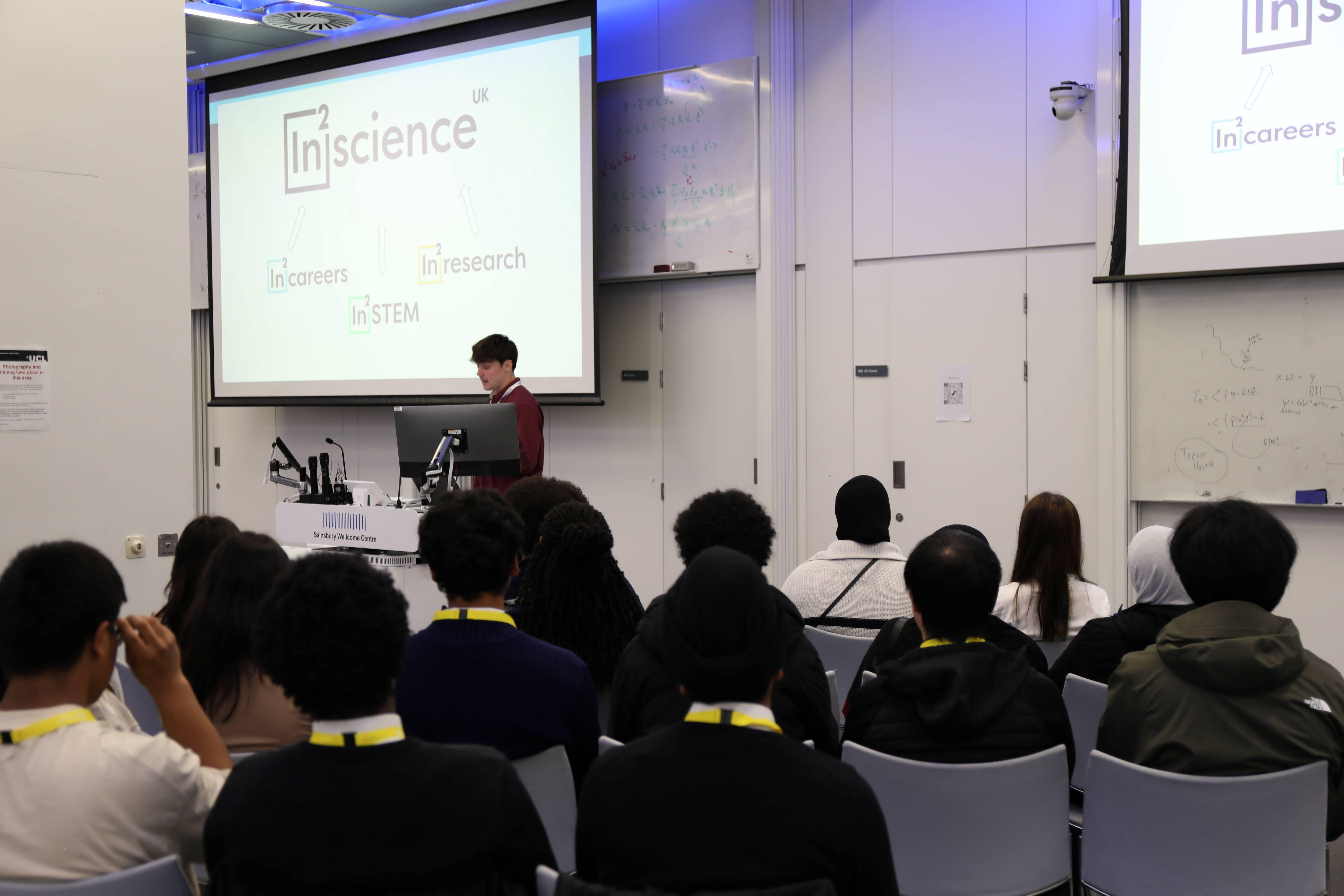
May 2025 – Film screening and panel discussion
On 13 May, we partnered with Headway East London to co-host a film screening of ‘The Magic of Chaos,’ a short documentary by award-winning filmmaker Kit Vincent about brain injury, community, and new identities. After the screening, a Q&A brought together voices from lived experience and neuroscience to explore pressing questions. With contributions from SWC Group Leader Julia Harris, clinical rehabilitation expert Professor Andrew Bateman, Clinical Lead/Director of Operations (Headway East London) Claire Farringdon Douglas, Headway member Dave Mercer, and Film Director Kit Vincent, the panel was a dynamic conversation about identity, freedom, and the future of brain injury rehabilitation. The event not only raised awareness but planted seeds for deeper collaborations. "Creativity is having the freedom to make your mark." - Dave Mercer. Find out more about The Magic of Chaos.
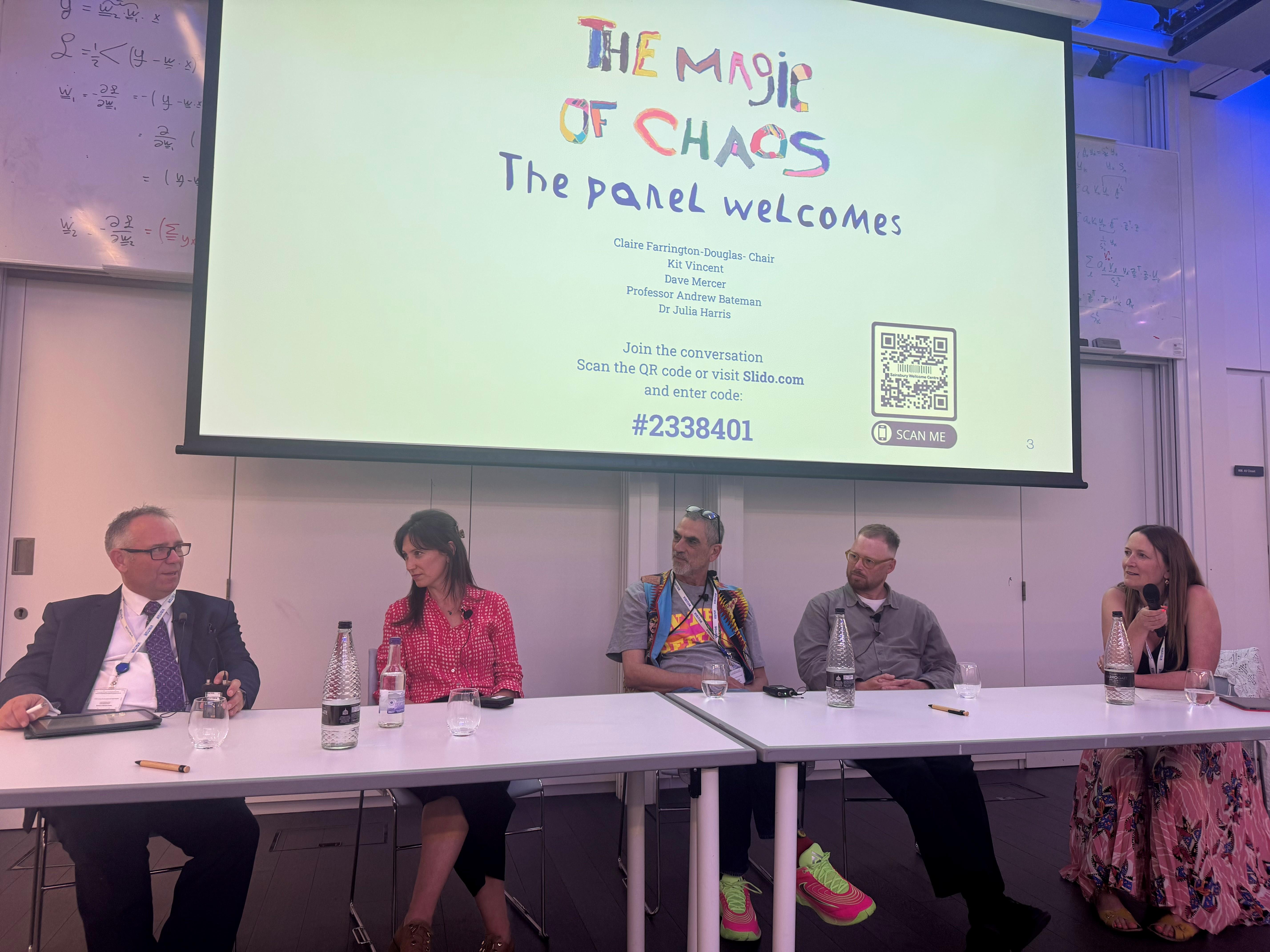
May 2025 - Brain hemispheres and lateralization at William Perkin High School
SWC researcher Simon Weiler and Laboratory Manager Yiota Iordanidou visited William Perkin High School on 2 May to lead sessions on 'All the Small Things' for Year 8 students. Following an introduction to neuroscience, the students tested their ability to work their brain hemispheres separately using a drawing task and a ruler drop task. The students then heard about brain hemispheres, their connection, and lateralization.
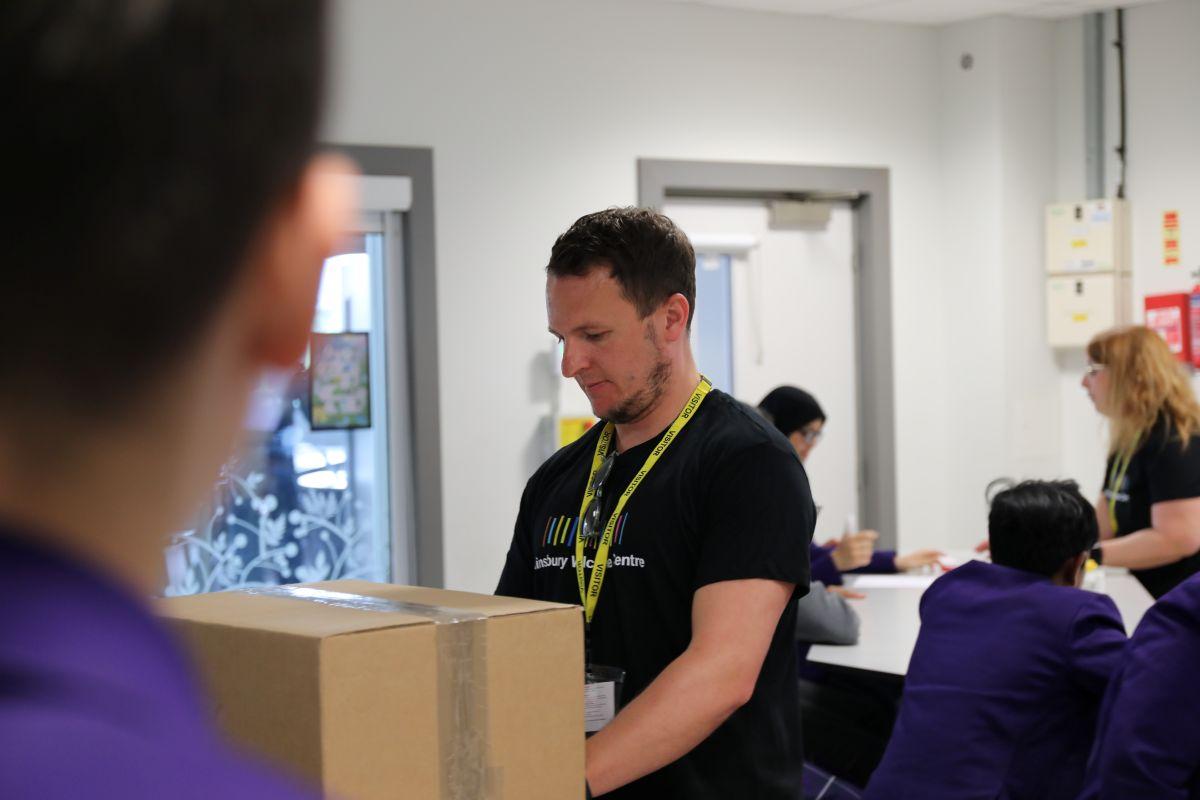
April 2025 – KNUST visit
SWC Histology Research Scientist Jessica Broni-Tabi visited Kwame Nkrumah University of Science and Technology, Kumasi (KNUST) during a trip to Ghana, sharing hands-on advice as well as insights into SWC’s research and histological techniques. The visit strengthened ties between KNUST and SWC and opened discussions around sustainable lab practices and future collaboration.
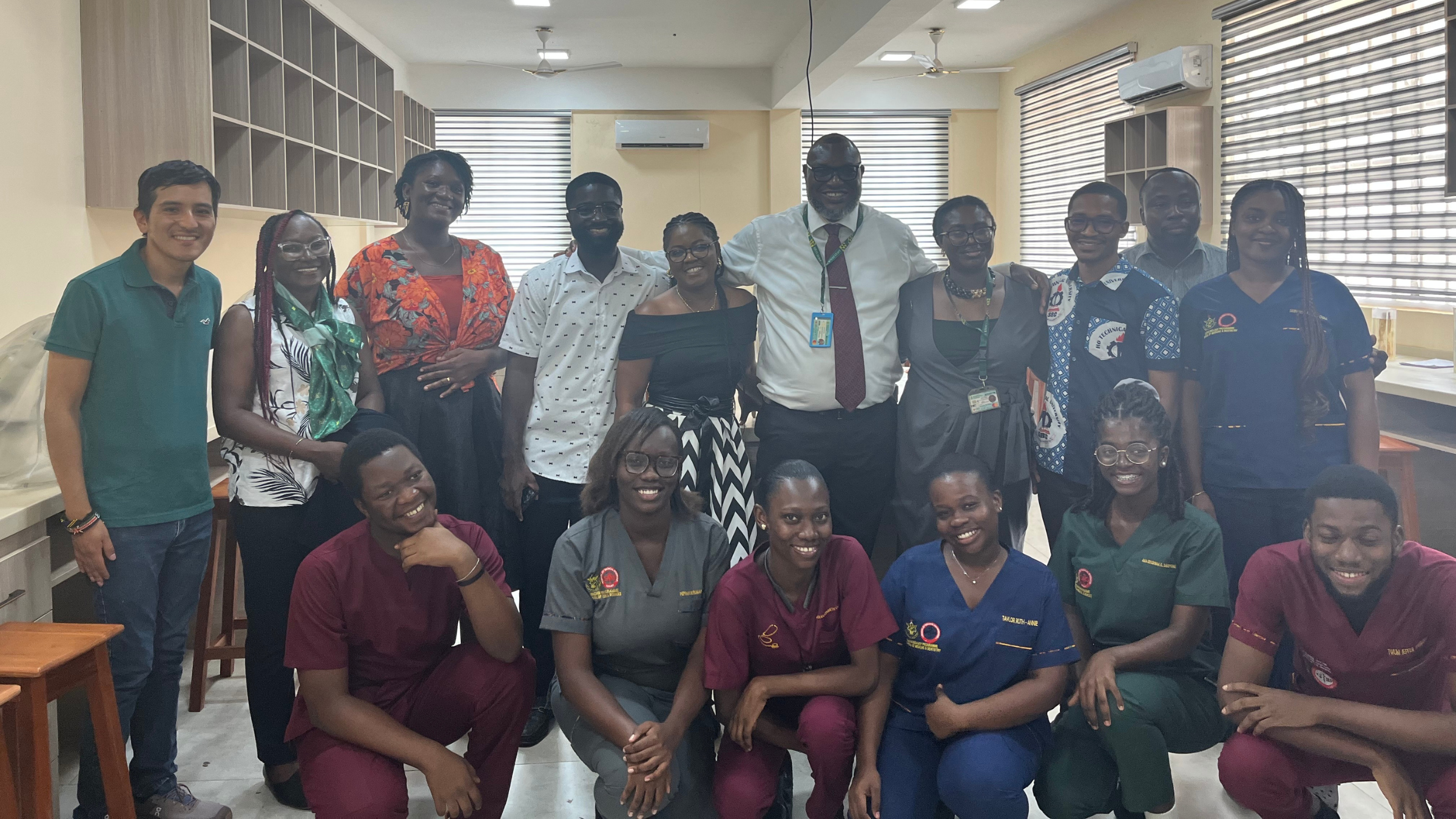
April 2025 – Careers evening at secondary school in North Finchley
On 3rd April 2025, Christophe Galichet, Research Operations Manager at the Neurobiological Research Facility at SWC, took part in a careers evening at St Michael’s Catholic Grammar Secondary School in North Finchley, London. He spoke with over 20 students aged 14-16 about his journey into neuroscience from a PhD at the National Institute for Medical Research (NIMR), to studying the hypothalamus-pituitary axis at the Francis Crick Institute and his current role at the Sainsbury Wellcome Centre.
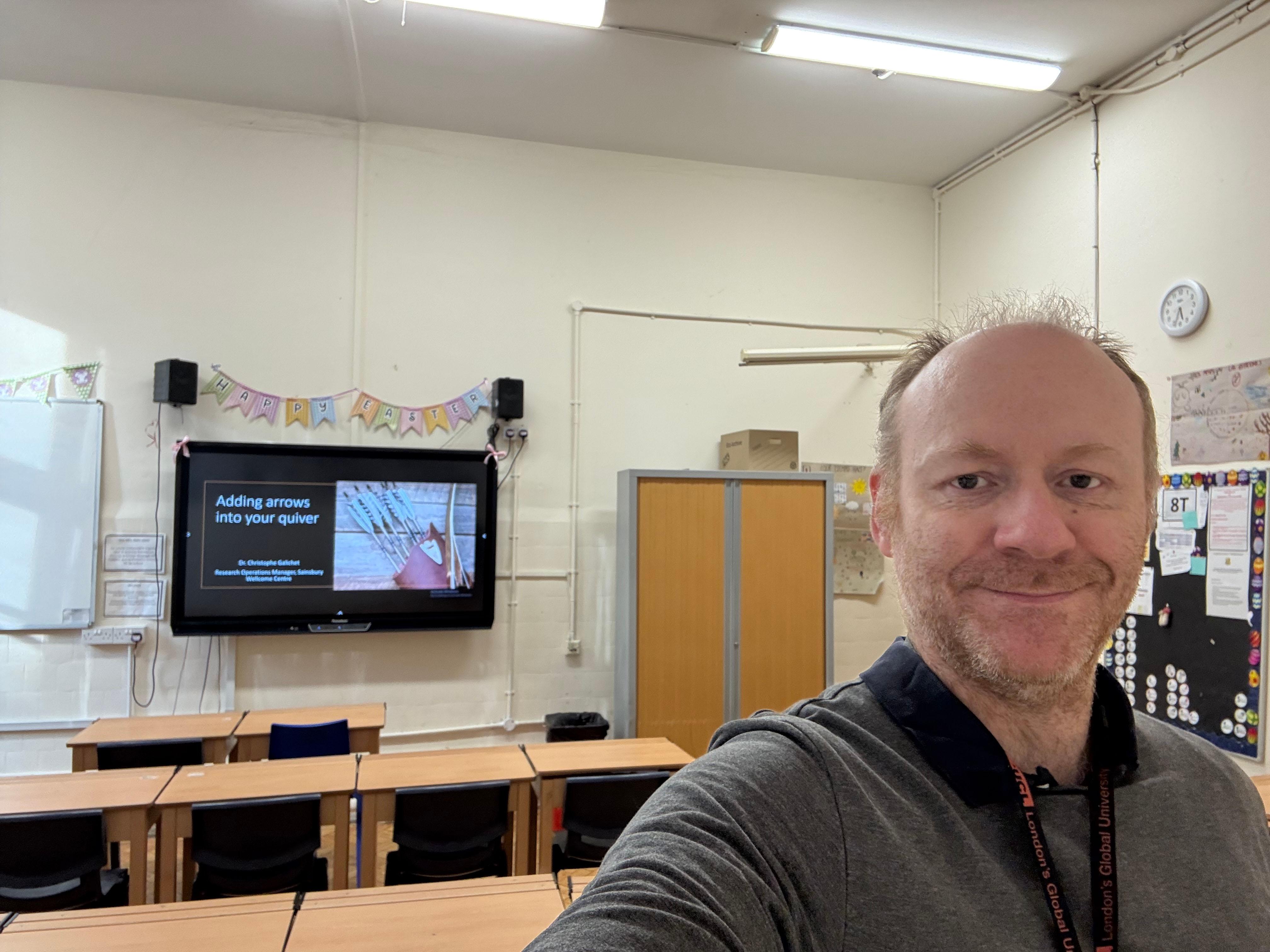
February-April 2025 – Build a Brain
A new 12-week course 'Build a Brain', developed and run by No Black Boxes in partnership with Camden Learning, Google, and the Sainsbury Wellcome Centre, equips students with the knowledge, equipment and tools to build their own robot, learning about everything from electrons to AI along the way. Their robot is modelled on the ultimate black box – the brain. Volunteers from the SWC and the Gatsby Computational Neuroscience Unit took part in the course as teaching assistants throughout the sessions. The course finished with a showcase event on 2 April at the London AI Campus in Camden.
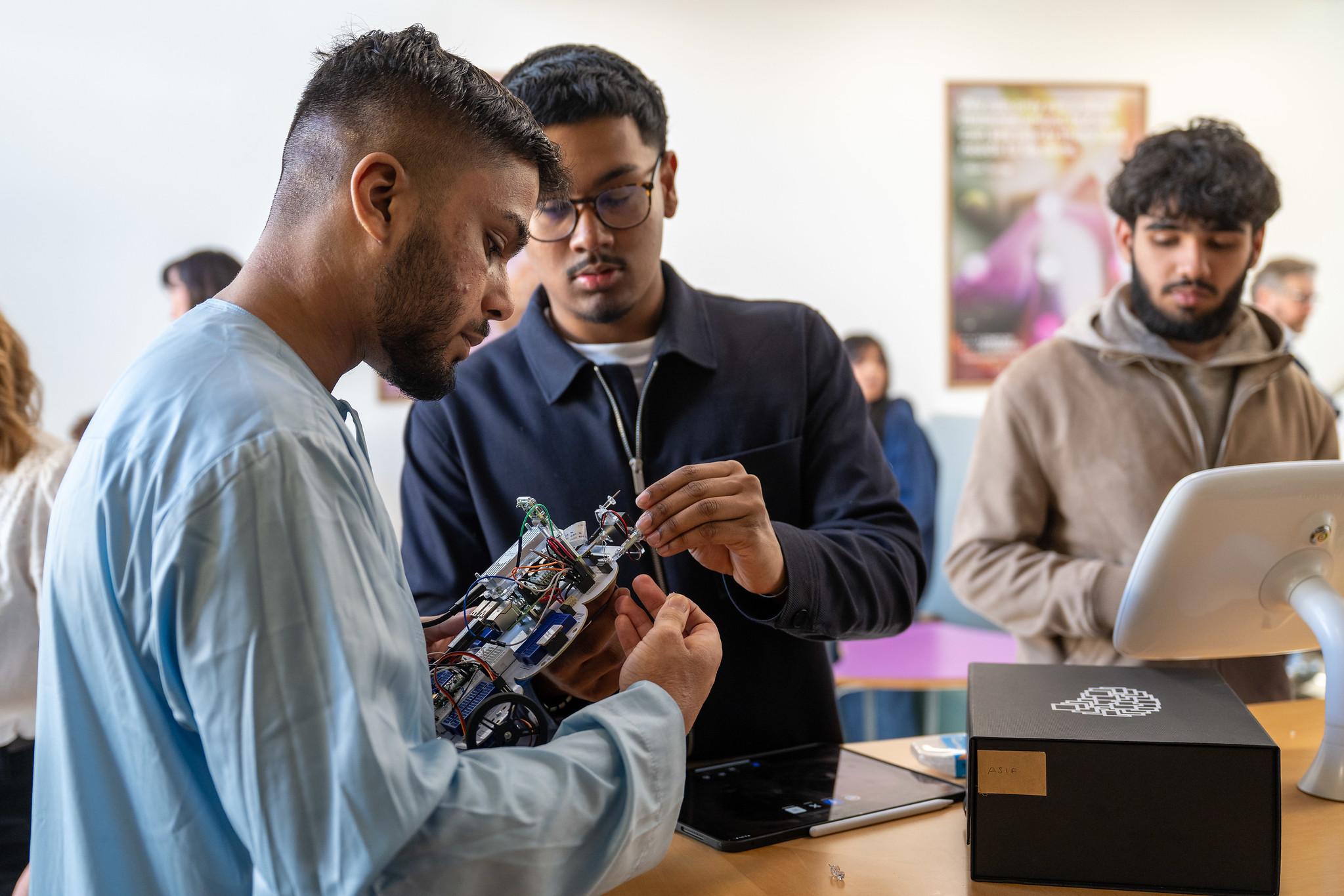
October 2024 – March 2025 – Neuronauts School Club
Led by SWC postdocs Svenja Nierwetberg and Dammy Onih, and supported by SWC PhD student Shanice Bailey and UCL Group Leader Pip Coen, the 2024/25 Neuronauts School Club invited 12 London secondary school students to the SWC. First organised in 2023, the School Club is part of the Neuronauts programme at SWC which is built on the principles of increasing accessibility, excitement, and career prospects in science.
Students met every other Saturday, focussing on coding and electrical engineering. They learnt to use Python (a high-level, general-purpose programming language) as well as Arduino (a microprocessor) to build simple web applications or devices. Working in groups, the students collaborated on a range of projects, which were entered into the Big Bang Competition.
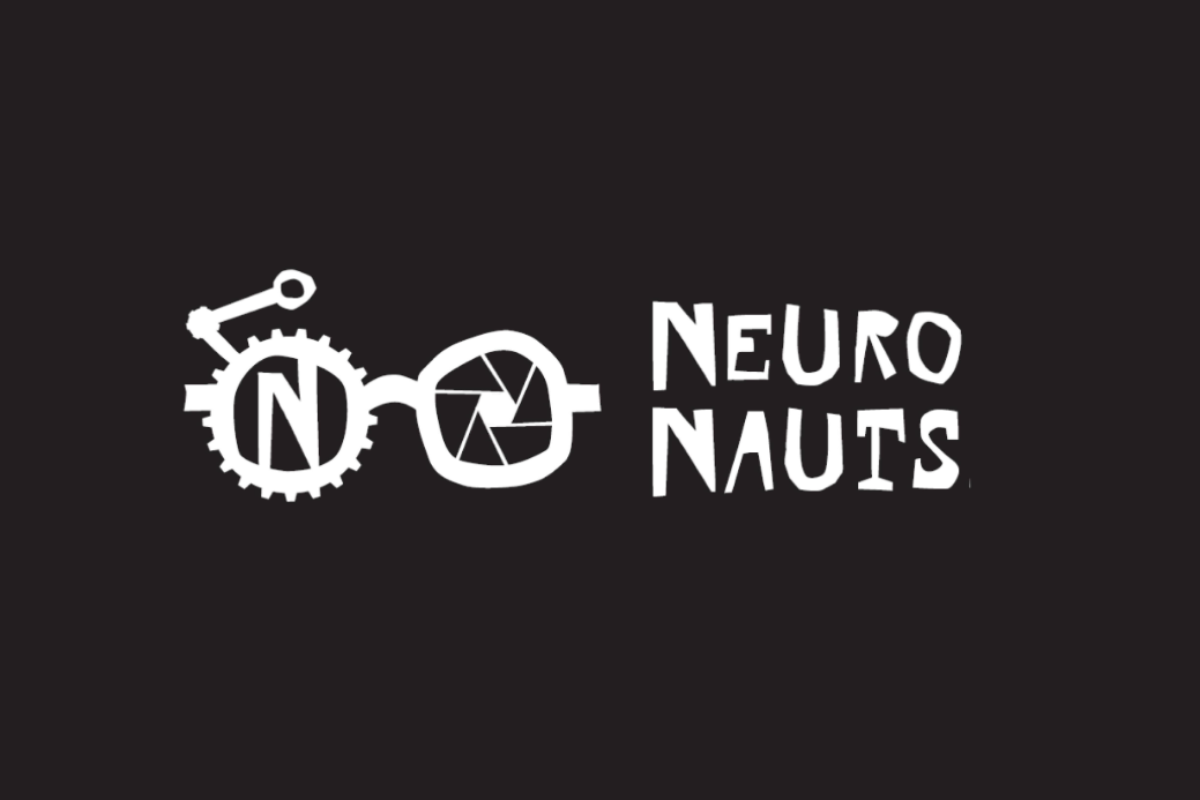
March 2025 – Teacher and Career Leaders visit
On 10 March, we hosted eight local teachers and careers leaders at SWC, in association with the Central London Careers Hub. Following opening talks, the teachers and careers leaders toured the microscopy facilities, engineering workshops and met with research technicians and PhD students to discuss careers and working in neuroscience. In the afternoon, the teachers and careers leaders took part in a workshop alongside SWC staff and students to co-create ‘escape room’ style activities for use in schools and colleges.
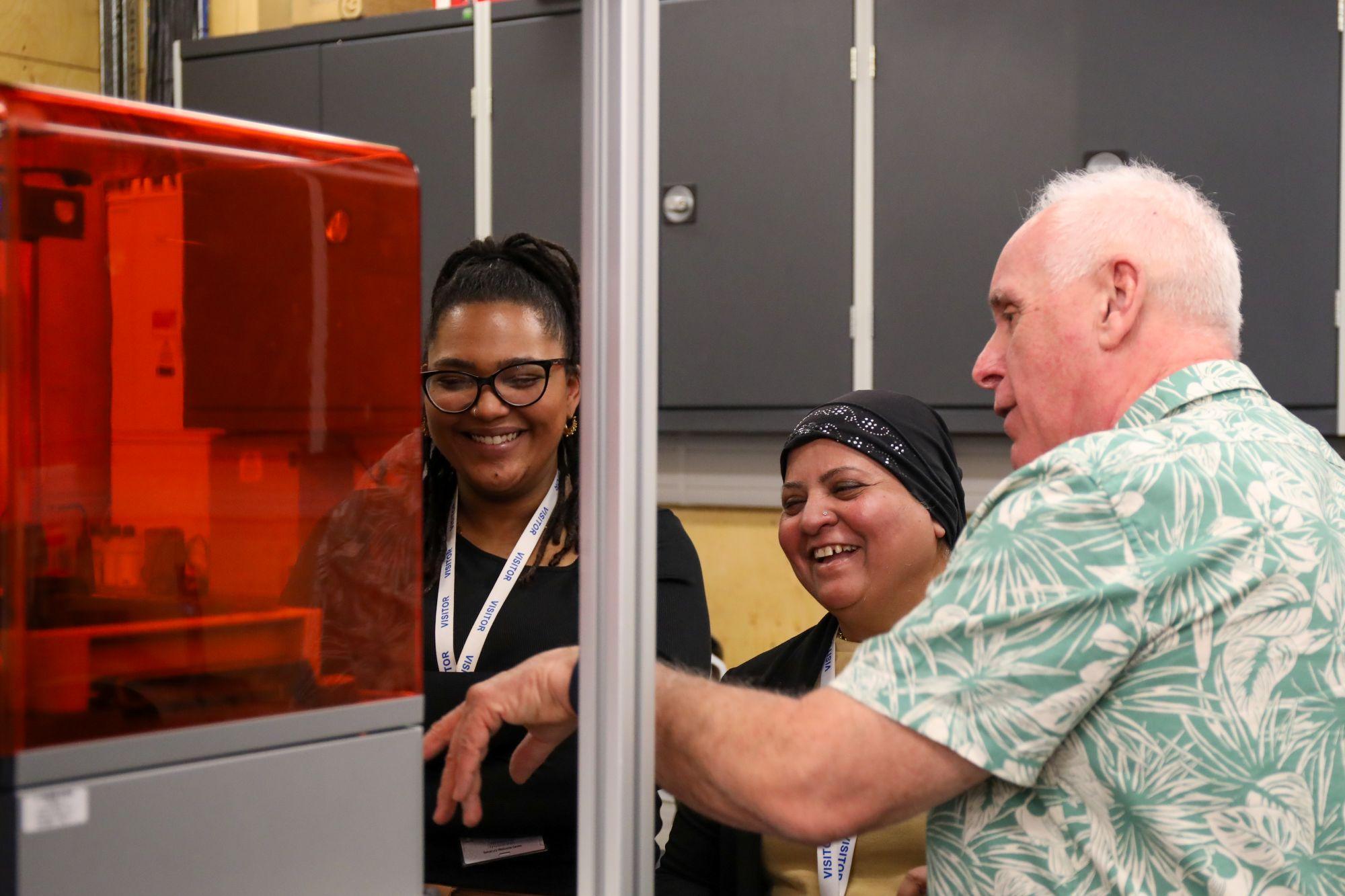
March 2025 – Visit to Grazebrook Primary School
To kick off British Science Week on 7 March, SWC Group Leader Julia Harris together with Microscopy Specialists Peter Gordon and Isabell Whiteley took part in a workshop at Grazebrook Primary School, for 60 year 3 pupils aged 7-8. The theme was "How do we use tricks of light to see tiny things". They set up four practical stations that the children rotated around: (1) learning how we bend light to change focus; (2) looking at samples under a microscope and drawing them; (3) making a fluorescent solution and exploring things that are naturally fluorescent; (4) making a jar of orbeez invisible so that they could see what was hidden amongst them. The children thoroughly enjoyed the workshop and were excitedly telling their parents what they had learned afterwards.
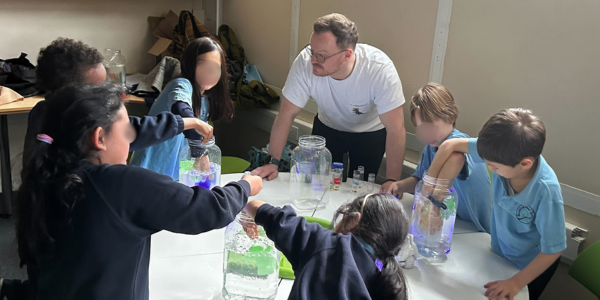
February 2025 – Université Paris-Saclay visit
On 9 February, 34 Master's students studying entrepreneurialism at École CentraleSupélec (the engineering school of Université Paris-Saclay) and 2 accompanying professors visited SWC. The aim was to get a better understanding of the world of science, technology and business development. Through talks by current and former SWC staff, the students learned about neuroscience research, how spin-out companies are formed, and how they might interact with scientists.
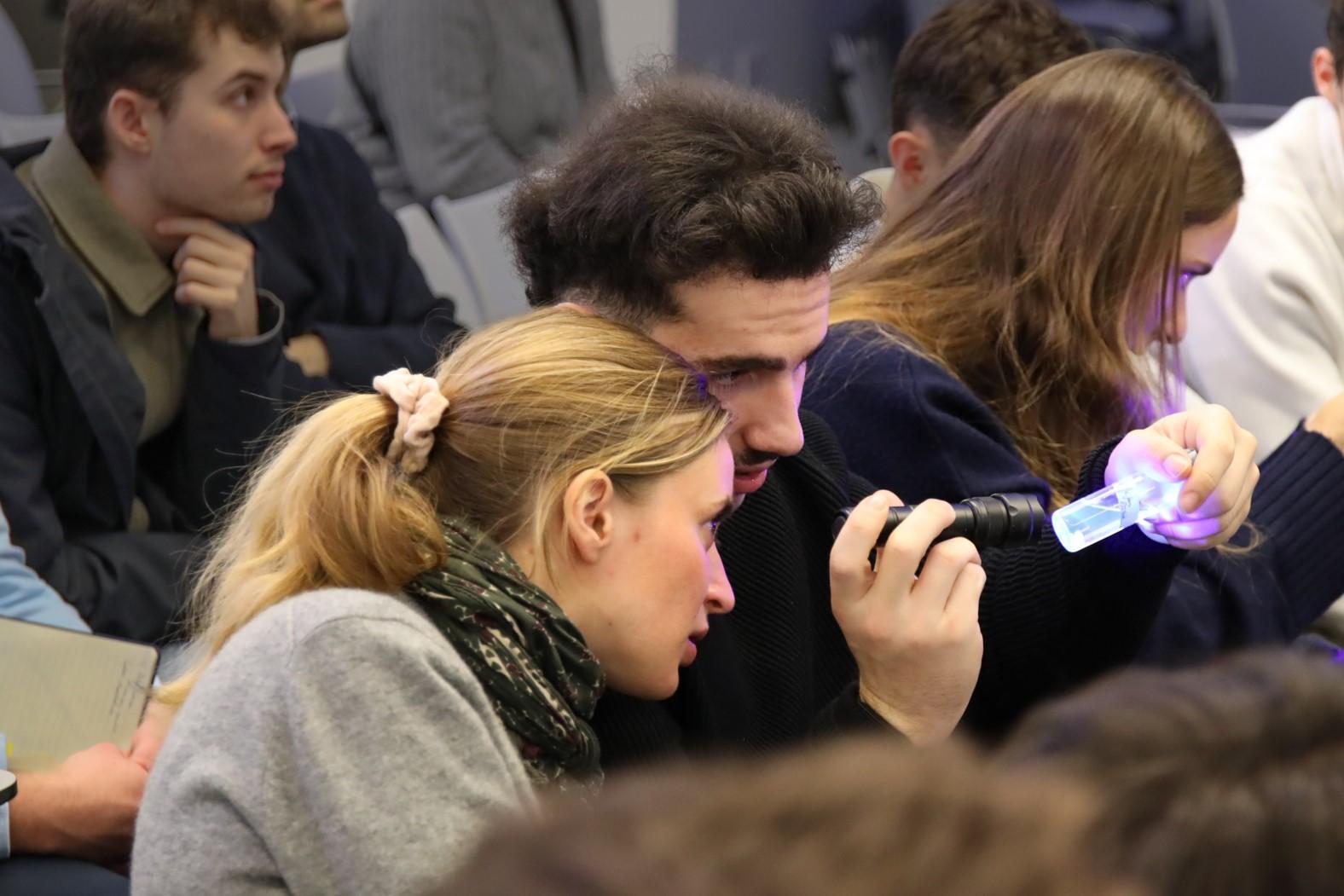
January 2025 – School visit to Ysgol Gyfun Gymraeg Rhydywaun, Wales
On 28 January, SWC staff Eleni Amaniti and Elena Ghirardello gave talks to A-level and GCSE biology pupils at Ysgol Gyfun Gymraeg Rhydywaun, Wales. They discussed the research at SWC as well as careers in science and animal care. The students also observed a live demonstration of how our brains and muscles are controlled with electricity, as their teachers used a human-human interface device.
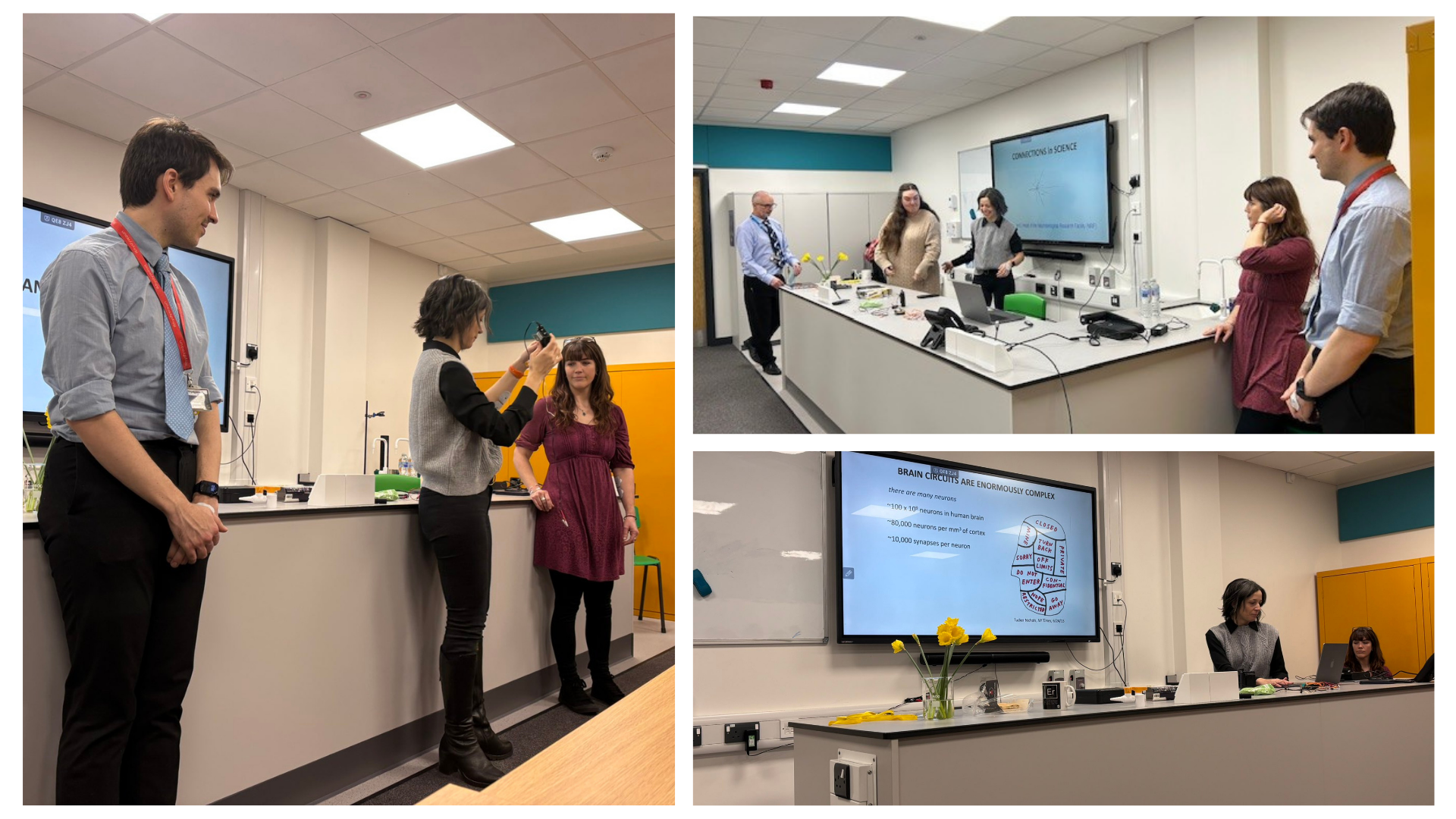
December 2024 – The SWC Lecture by Blaise Agüera y Arcas
We were delighted to host Blaise Agüera y Arcas, VP and Fellow at Google Research and Google’s CTO of Technology & Society, for this year's annual SWC Lecture. His talk explored new perspectives on life, evolution, and the origins of intelligence – and their computational underpinnings. Blaise also discussed breakthroughs in Artificial Life research, including systems that evolve self-replicating behaviours, and the implications of these discoveries.
We were pleased to welcome colleagues from across UCL, members of the local Fitzrovia community, participants and alumni from the In2research programme, teachers from William Perkin High School, BNA scholars and students from the new London AI Campus recently launched by Google. The lecture was live-illustrated by Alex Cagan.
November 2024 – Exhibition installation
We were delighted to install five interactive street displays in the vitrines outside our building on Howland Street in November 2024. These new exhibitions offer a glimpse into our research at SWC including our work on understanding how the brain makes decisions, how we learn and why we sleep. Read more about the new Street Displays.
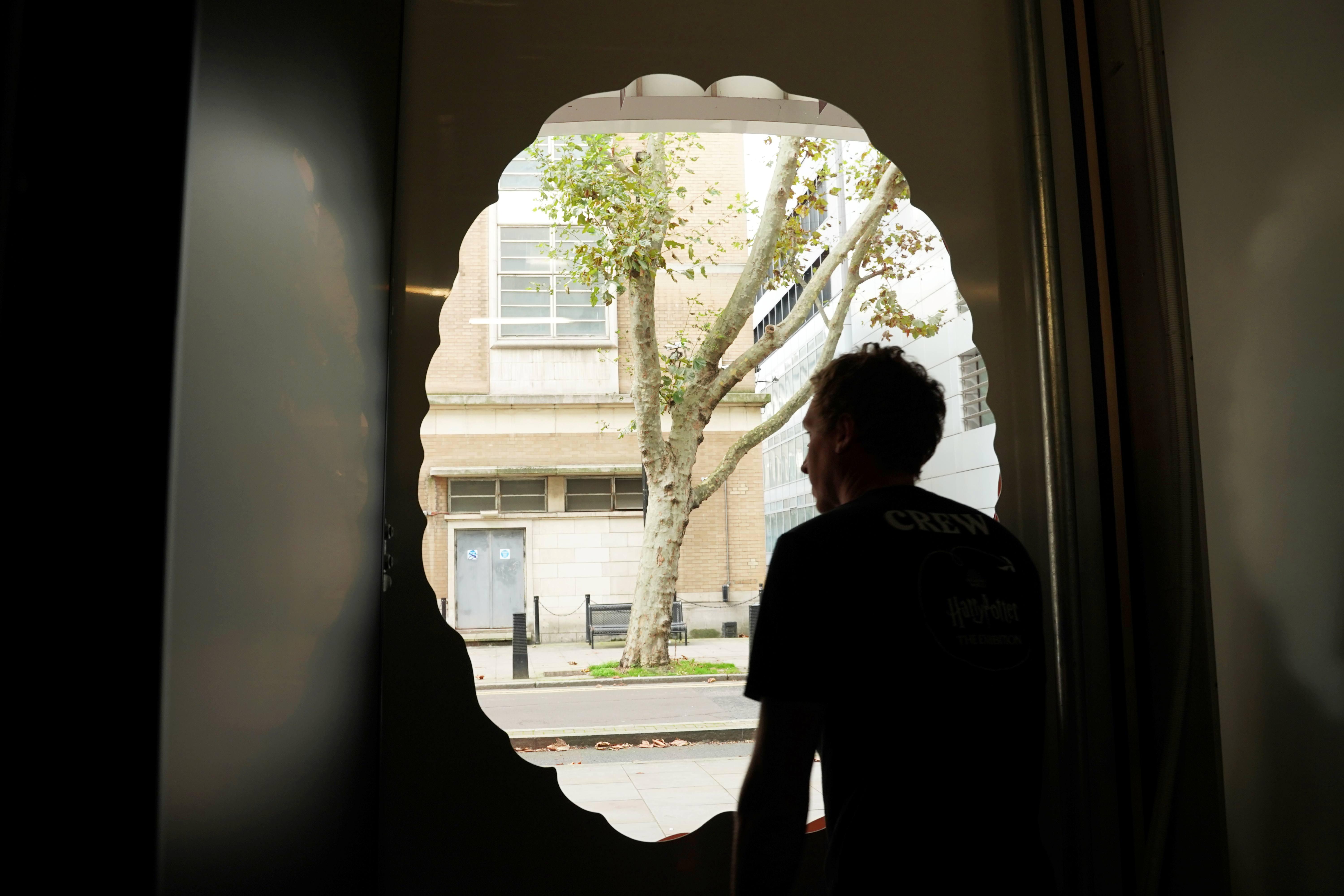
October 2024 – Neuroverse panel event
On 22 October we hosted a thought-provoking panel discussion, created and moderated by Carolina Soares (SWC alumna) and Clara Lenherr, founders of the Neuroverse podcast. Supported by the SWC, the popular podcast covers topics in both neuroscience and philosophy.
The event delved into one of the most relevant questions of our time: Will computational models and machine learning ever be able to replicate or fully capture the brain's complexity?
Carolina and Clara together with panellists Jai Bhagat (SWC PhD student), Aaditya Singh, Clémentine Dominé, and Pierre Glaser (Gatsby Unit PhD students) explored the possibilities and limitations of artificial intelligence. Each brought a unique perspective from their respective experience and research into both neuroscience and computational techniques.
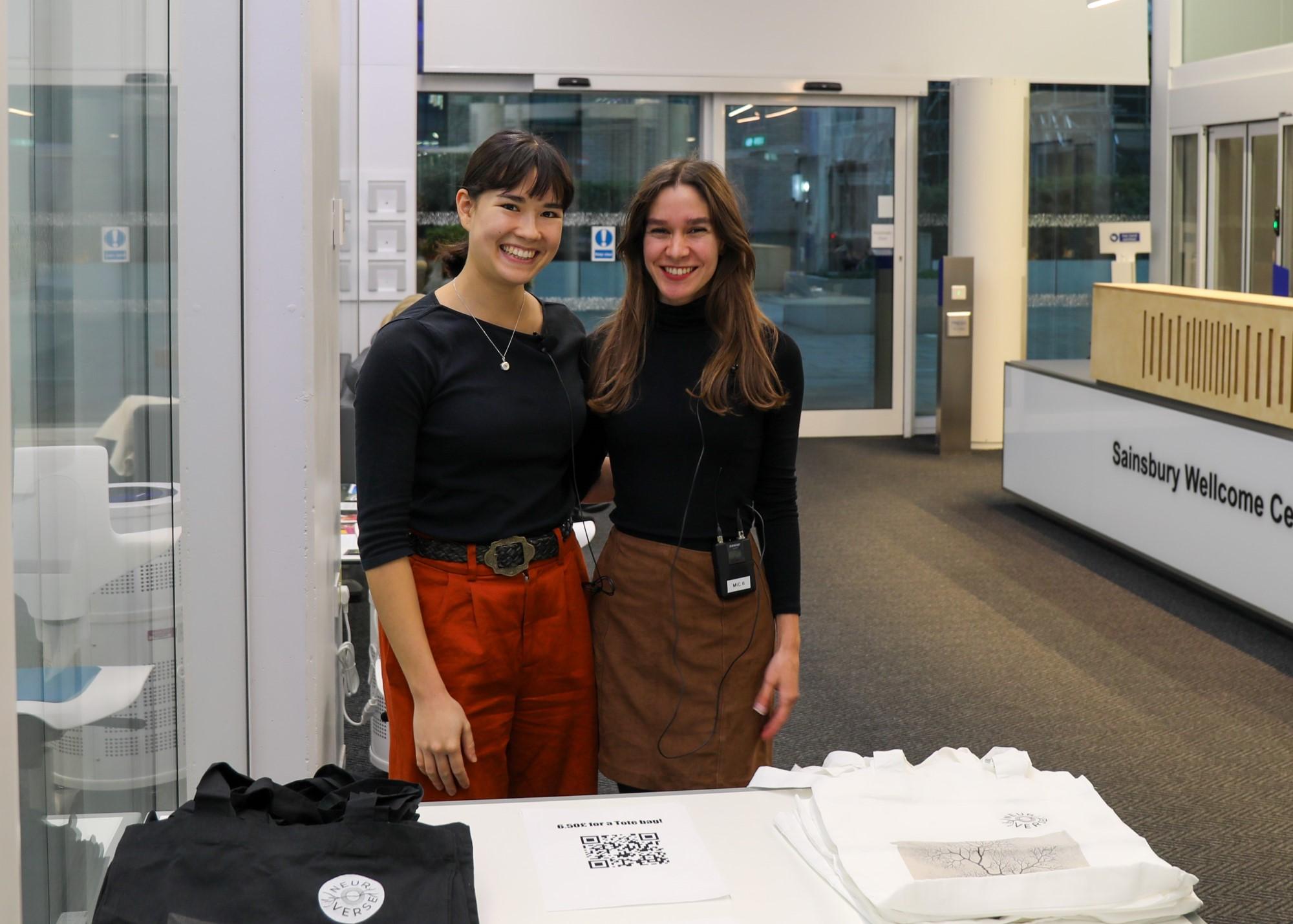
October 2024 – Teacher Experience Day
On 18 October a group of secondary school teachers visited SWC to learn about animal research in neuroscience and careers in animal research. During the visit, the teachers took part in discussions, an interactive husbandry and care workshop, and laboratory tours. There were also talks covering neuroscience and careers, equipping teachers with knowledge they could take back to their students.
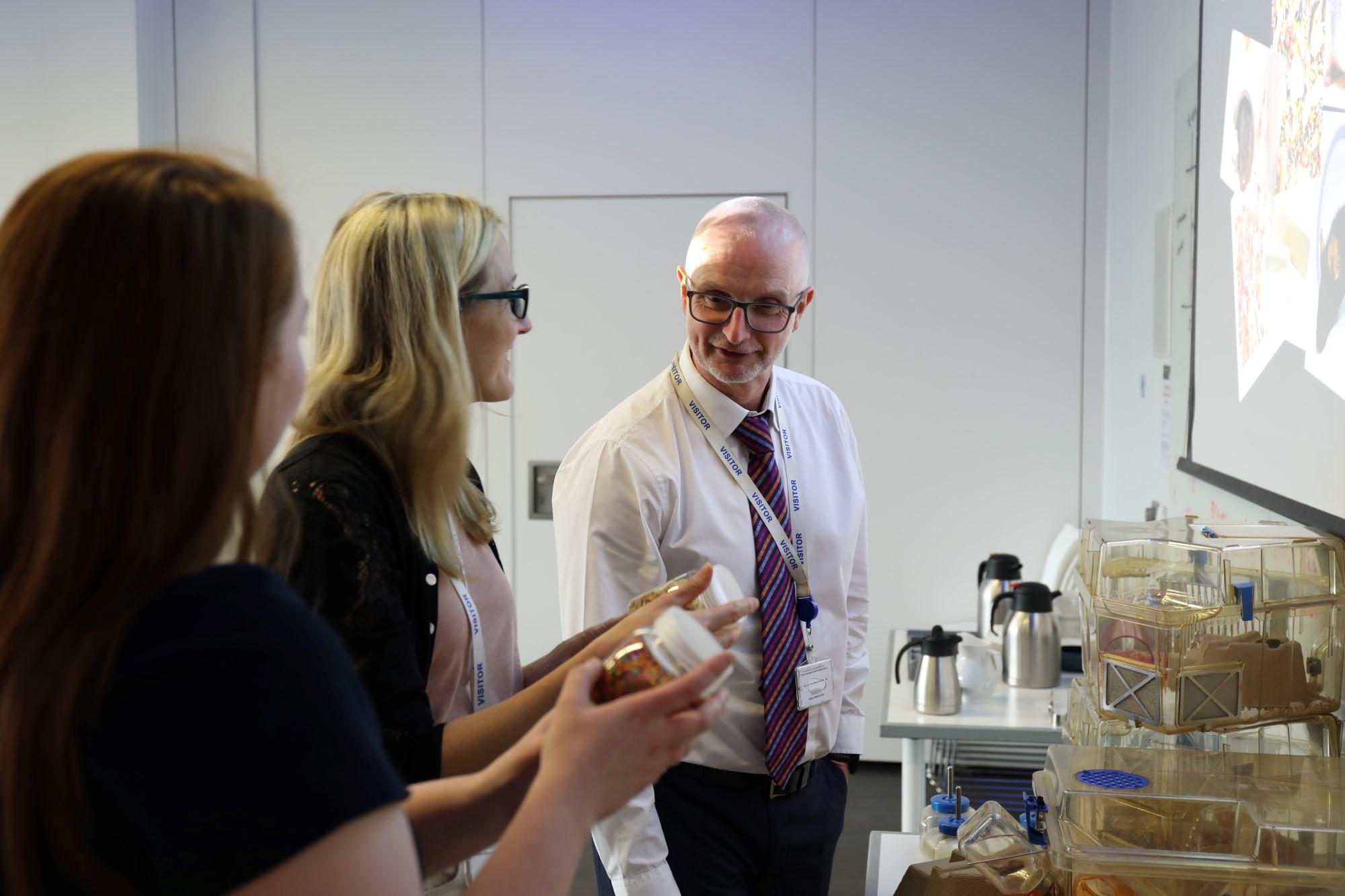
October 2024 – Careers in Neuroscience event
We were delighted to host a Careers in Neuroscience event at SWC in partnership with the British Neuroscience Association (BNA) on 10 October. Five panellists shared their career journeys and advice for those considering working in industry and academia. Insightful and honest, the speakers answered questions on everything from pay and working cultures, to leaving academia, to the importance of building a network. Our panellists were: Dr Rebecca McKelvey, Education Partnership Lead at Google DeepMind and founder of In2scienceUK, Dr Ruth Weir, Head of Entrepreneurship at UCL, Dr Keri Tochiki, Accenture, Dr Sophie Morgan, Senior Science Editor in the Neuroscience team at Nature Communications and Sandrine Geranton, Associate Professor, Department of Cell and Development Biology at UCL.
October 2024 – Biology Week
During Biology Week 2024, held from 7 - 11 October, we created and shared career profiles of SWC staff as part of our ‘Journeys in Neuroscience’ article series. Designed for young people exploring career options in science, the articles provide insights into the day-to-day work of various roles and highlight the diverse range of career paths and opportunities available in neuroscience.
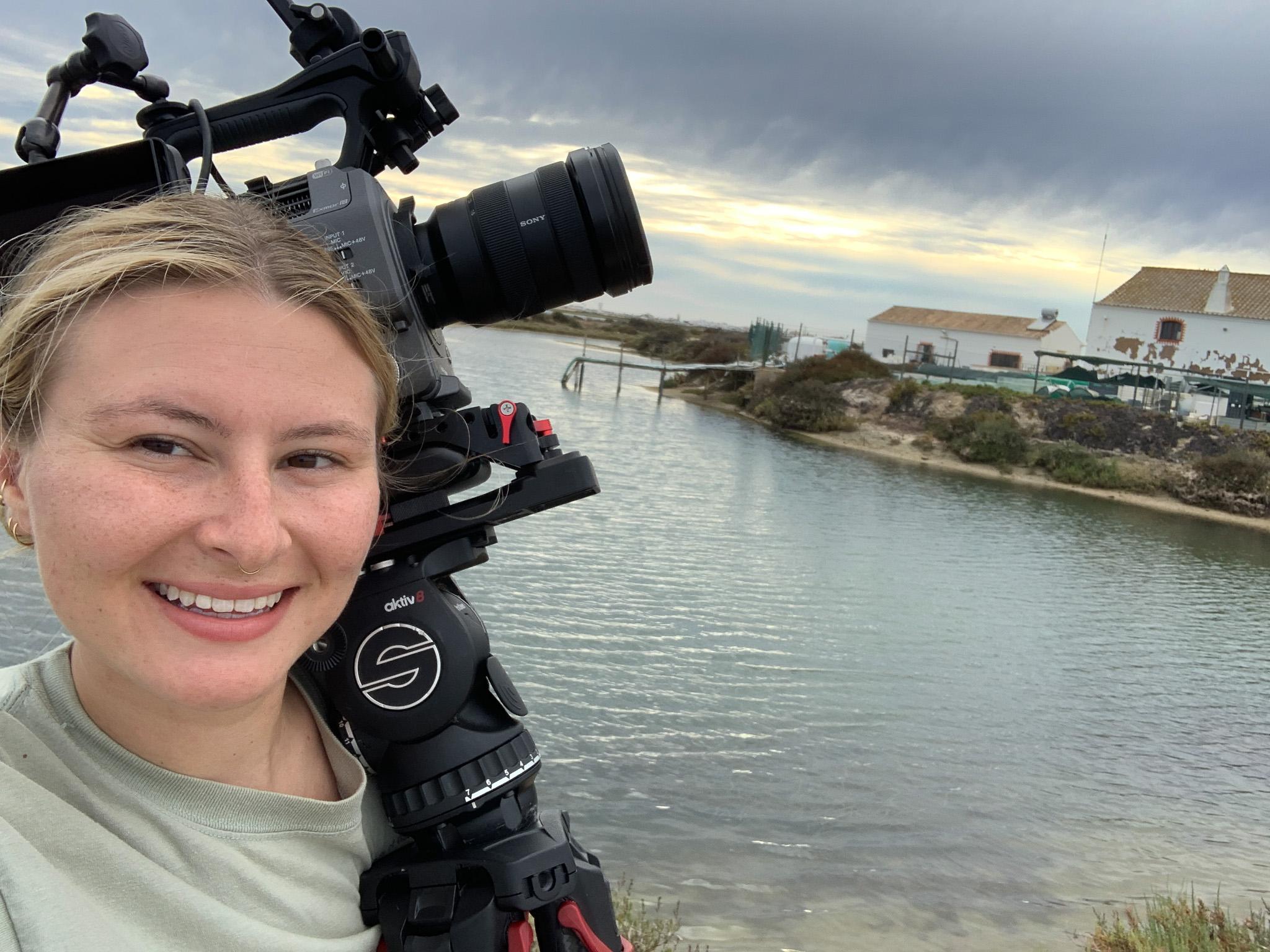
September 2024 – London Academy of Excellence (LAE) Tottenham
On 25 September, SWC PhD students Shanice Bailey and Svenja Nierwetberg gave talks to pupils from Dukes Academy, Mulberry Academy Woodside, Parkview School, Gladesmore School and LAE Tottenham. They also spoke with pupils and viewed their posters about the brain, awarding prizes for the best designs. The ‘Celebration of the Brain’ day at LAE Tottenham was the culmination of a year-long Brain Project at the schools.
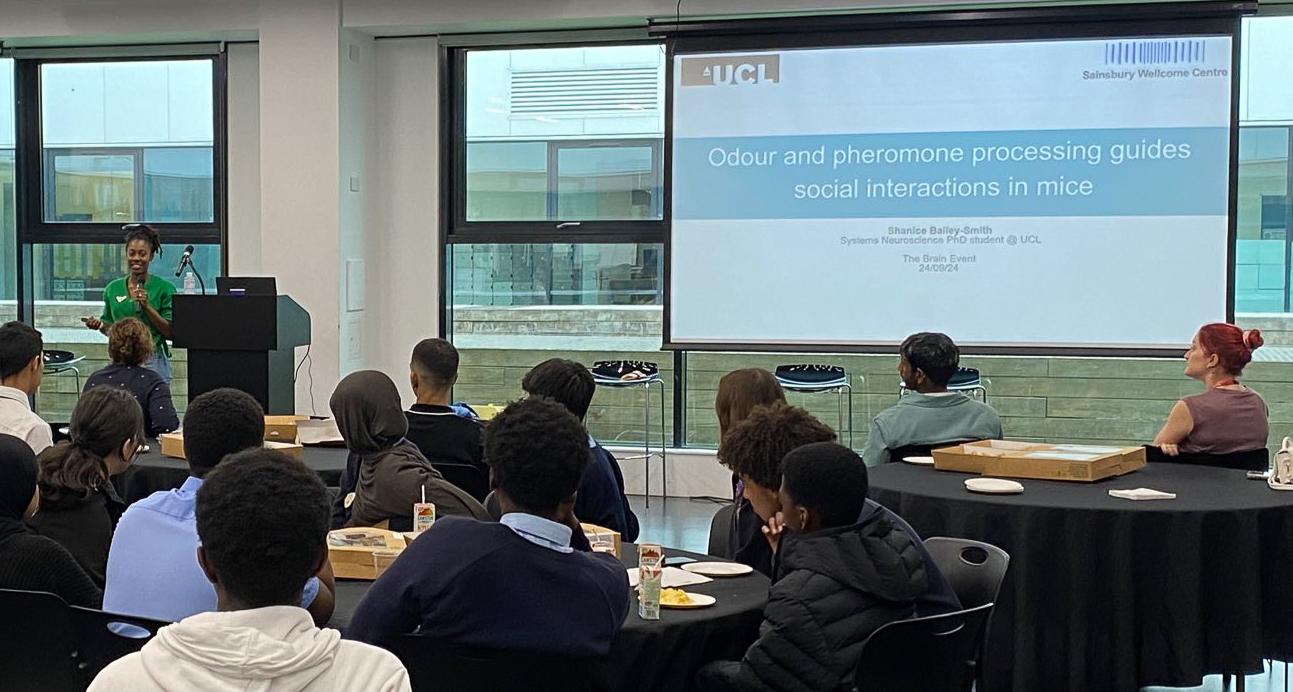
August 2024 – Nuffield Research Placements
Two students joined SWC Research Software Engineer Laura Porta for two weeks from 29 July to 9 August as part of the Nuffield Research Placement scheme. Both are interested in computer science and are applying to undergraduate courses at University. During the placement, the students worked on a project centred on image processing, which involved manipulating three-photon imaging data using Python. They wrote a report and prepared a scientific poster which they presented at an event held by the Nuffield Foundation.
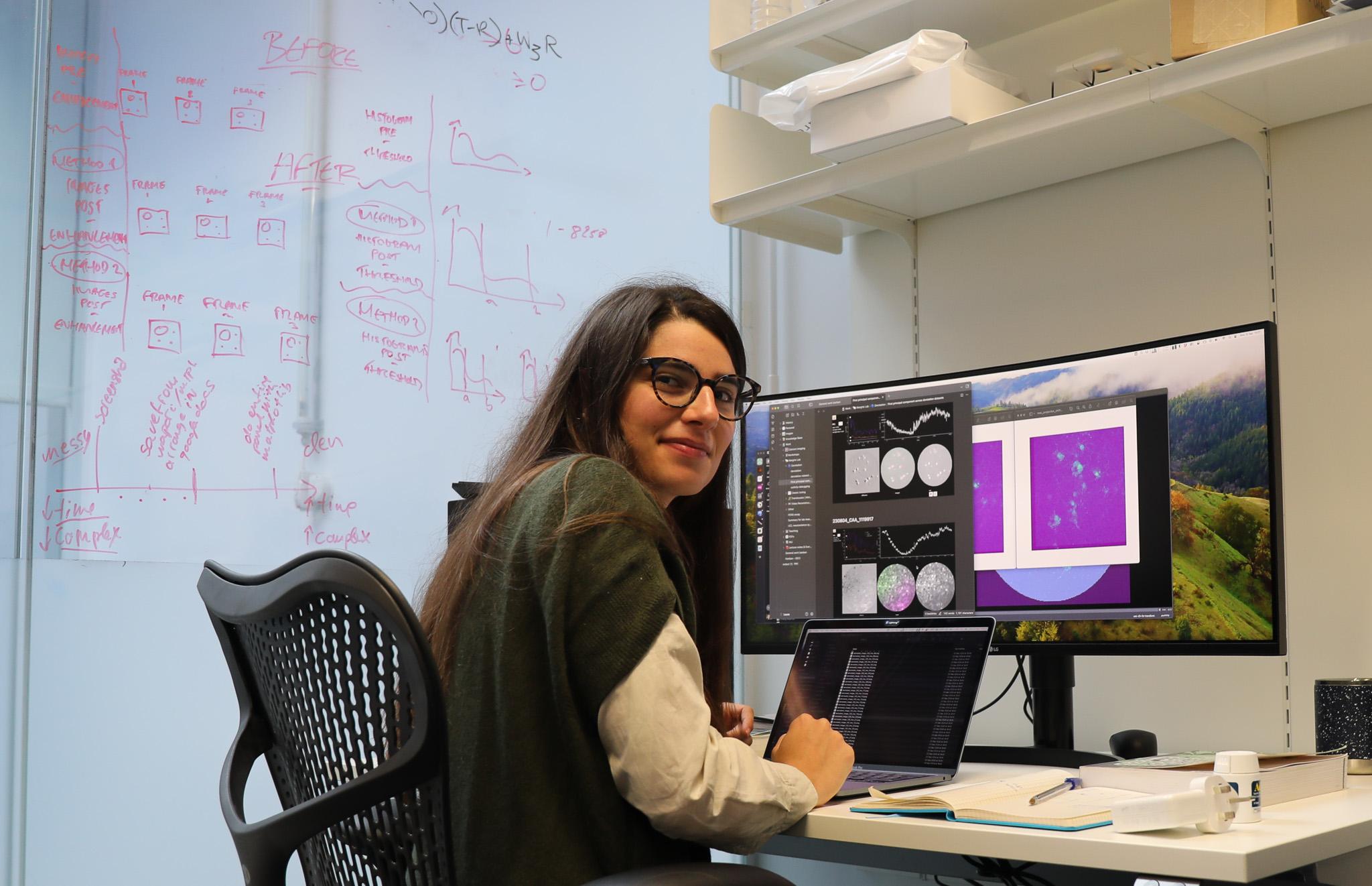
Summer 2024 – Neuronauts
From 29 July to 9 August, 18 secondary school students (aged 14-17) from London participated in the Neuronauts 2024 summer camp. Launched in 2022, this year’s course was run by the Neuronauts team of SWC and GCNU PhD students, SWC affiliates and UCL colleagues. Participants learned about neuroscience, coding and software design, culminating in a group project. They also had a chance to visit the labs and meet some of the scientists at SWC. Find out more about Neuronauts.
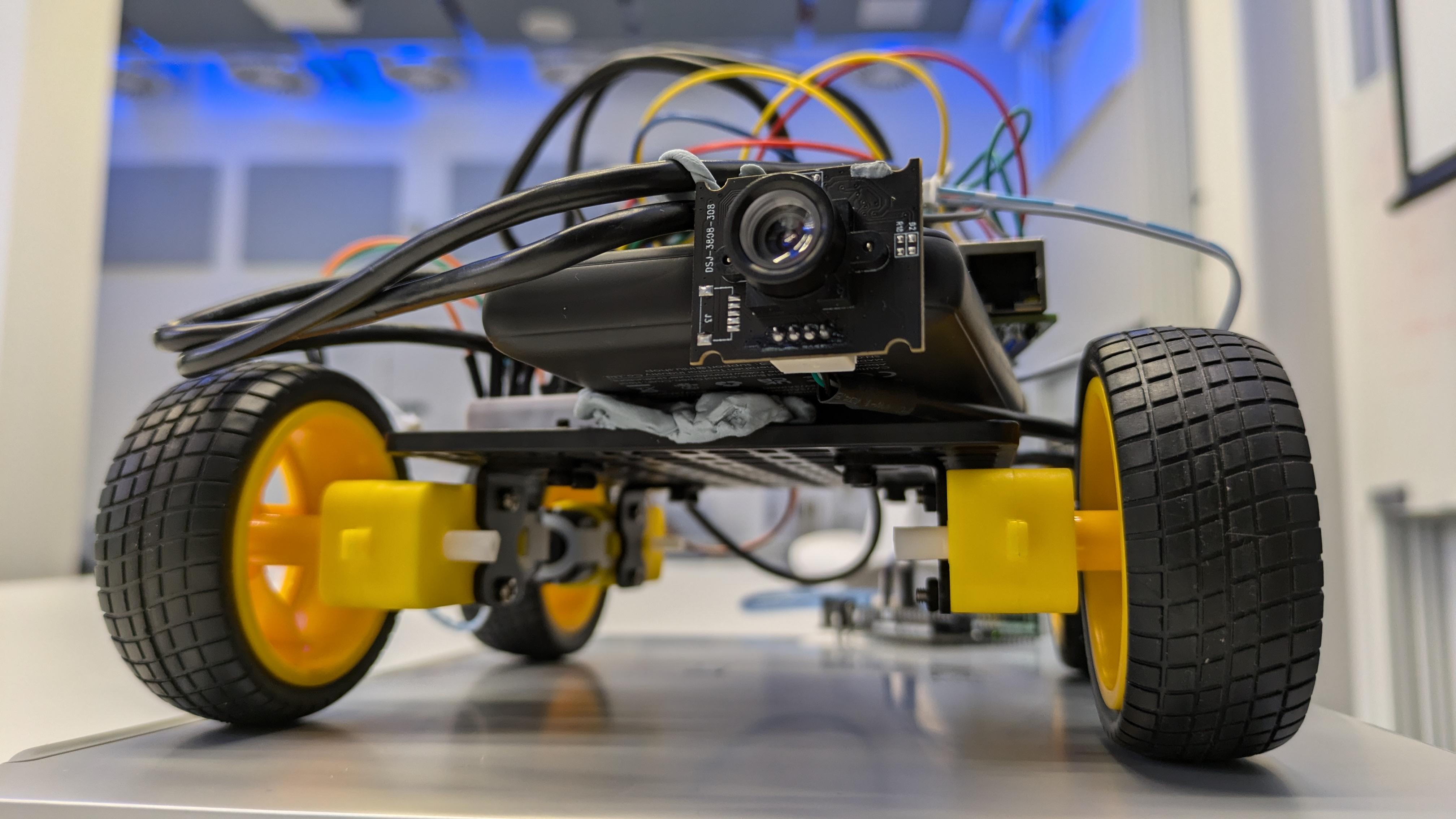
July 2024 – TReND, CaMinA
We were delighted to support the 2024 Computational Neuroscience and Machine Learning Basics (CaMinA) course, in partnership with TReND – a charity dedicated to enhancing scientific capacity across Africa. From 8th-24th July, over 30 students and faculty working in Africa gathered in Kigali, Rwanda to join nearly 20 international researchers for an intensive three-week programme. Among the instructors were SWC PhD student Tom George and two other SWC affiliates - Kim Stachenfeld and Devon Jarvis - who shared their expertise. The course offers students a deep dive into computational neuroscience, fostering essential connections that will help the field flourish across the continent. Many past participants have gone on to secure placements in prestigious master’s and PhD programs worldwide. Read the story
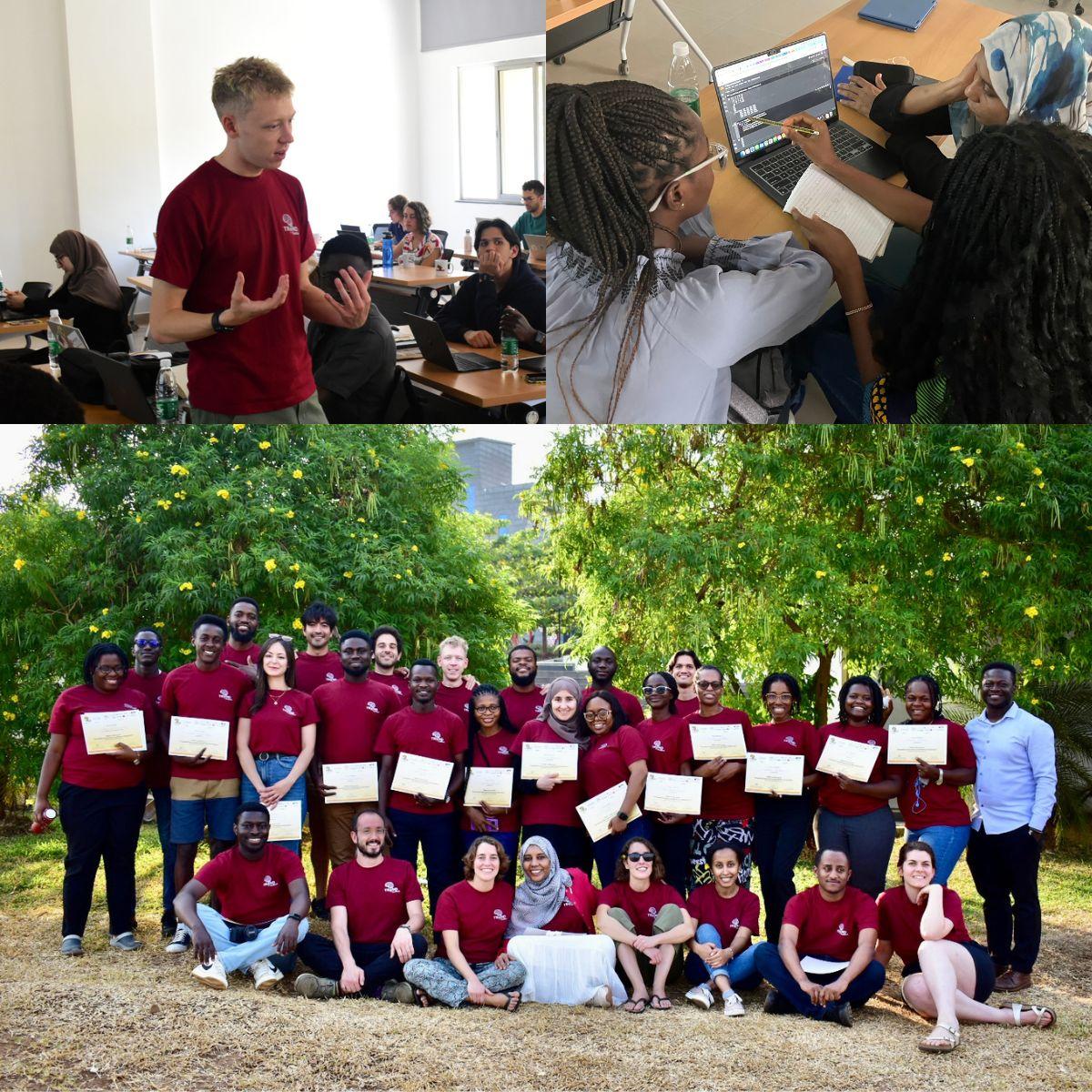
July 2024 – BrainCamp Kosovo
The seventh BrainCamp Kosovo took place from 15-19 July, 2024. Founded and organised by SWC PhD alumni Egzona Morina, the camp aims to introduce neuroscience education and career opportunities to young people in Kosovo. This year’s event expanded on previous editions, bringing together 59 high school students from Prishtina, Prizren, and the ATOMI Institute. Over the course of the week, participants aged 14-18 engaged in lessons on neuroscience, covering topics such as cell types and their functions, neural communication, and artificial intelligence. Using EmotiBit, a wearable mini-computer with sensors, students also conducted biofeedback experiments. The event was supported by additional SWC teaching volunteers, including Sarah Olesen, Joseph Cohen, Emmett Thompson, Francesca Pozzolo, and Orsolya Folsz.
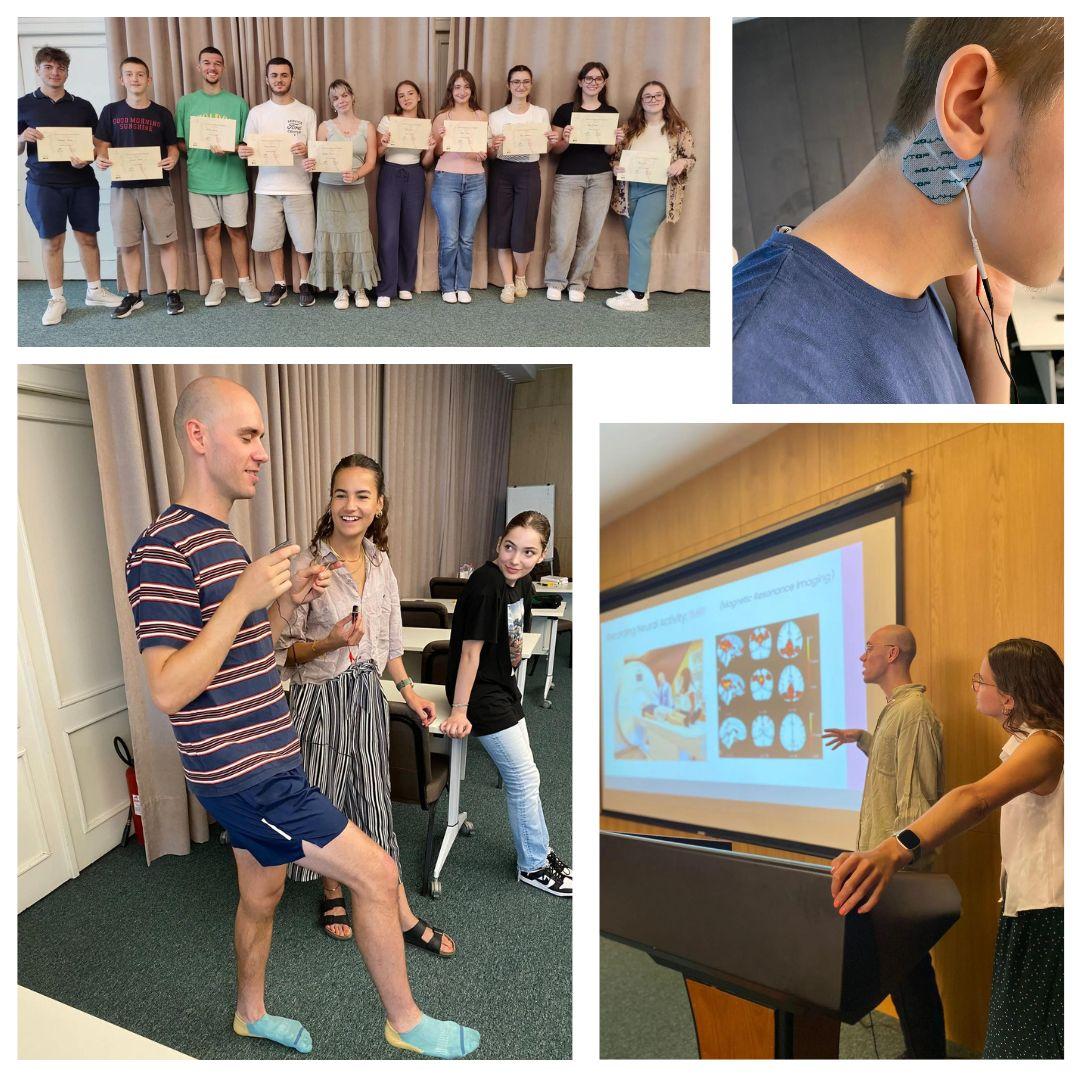
July 2024 – Camden STEAM work experience
On Wednesday 10th July, we hosted nine Year 12 students at SWC and GCNU, as part of a Camden STEAM work experience week across the Faculty of Life Sciences at UCL. Following opening talks, the students observed a live demonstration of how our brains and muscles are controlled with electricity, using a human-human interface device. They had chance to tour the microscopy facilities, learn about neural and behavioural data processing at the Neuroinformatics Unit, and got a glimpse of animal experiment setups. Throughout the day, the students discussed neuroscience careers with a diverse range of staff, from PhD students, to engineers, to laboratory managers.
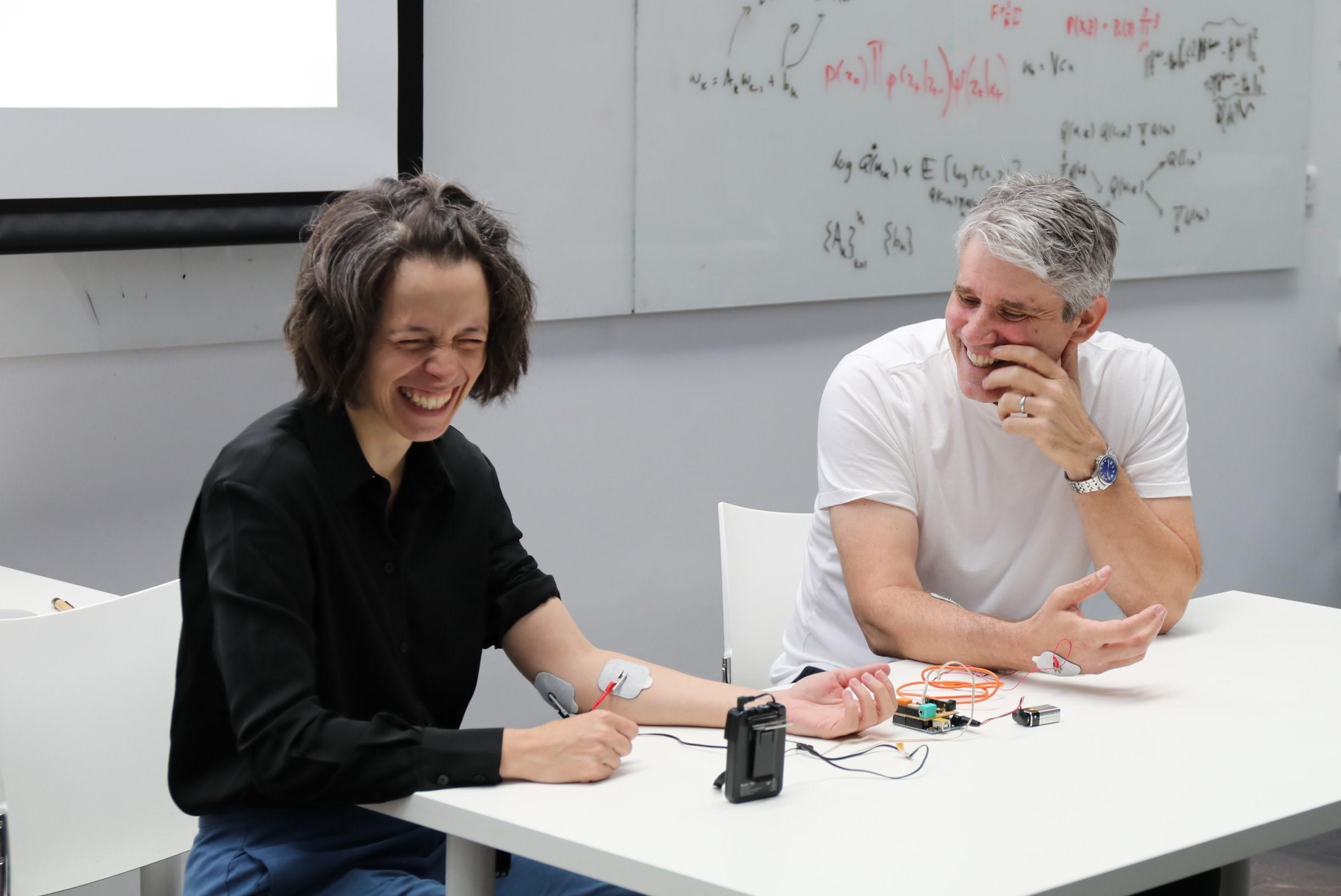
May 2024 - FEM BIOBIO students visit from Chile
On Friday 24 May, 17 secondary school students (aged 14-17) visited from Chile to hear from Gatsby and SWC researchers on their work, tour the Microscopy facilities, learn about neural and behavioural data processing at the Neuroinformatics Unit, and get a glimpse of animal experiment setups. The students, affiliated with the FEM BIOBIO programme, also provided feedback on post-it notes to share what they took away from the day.
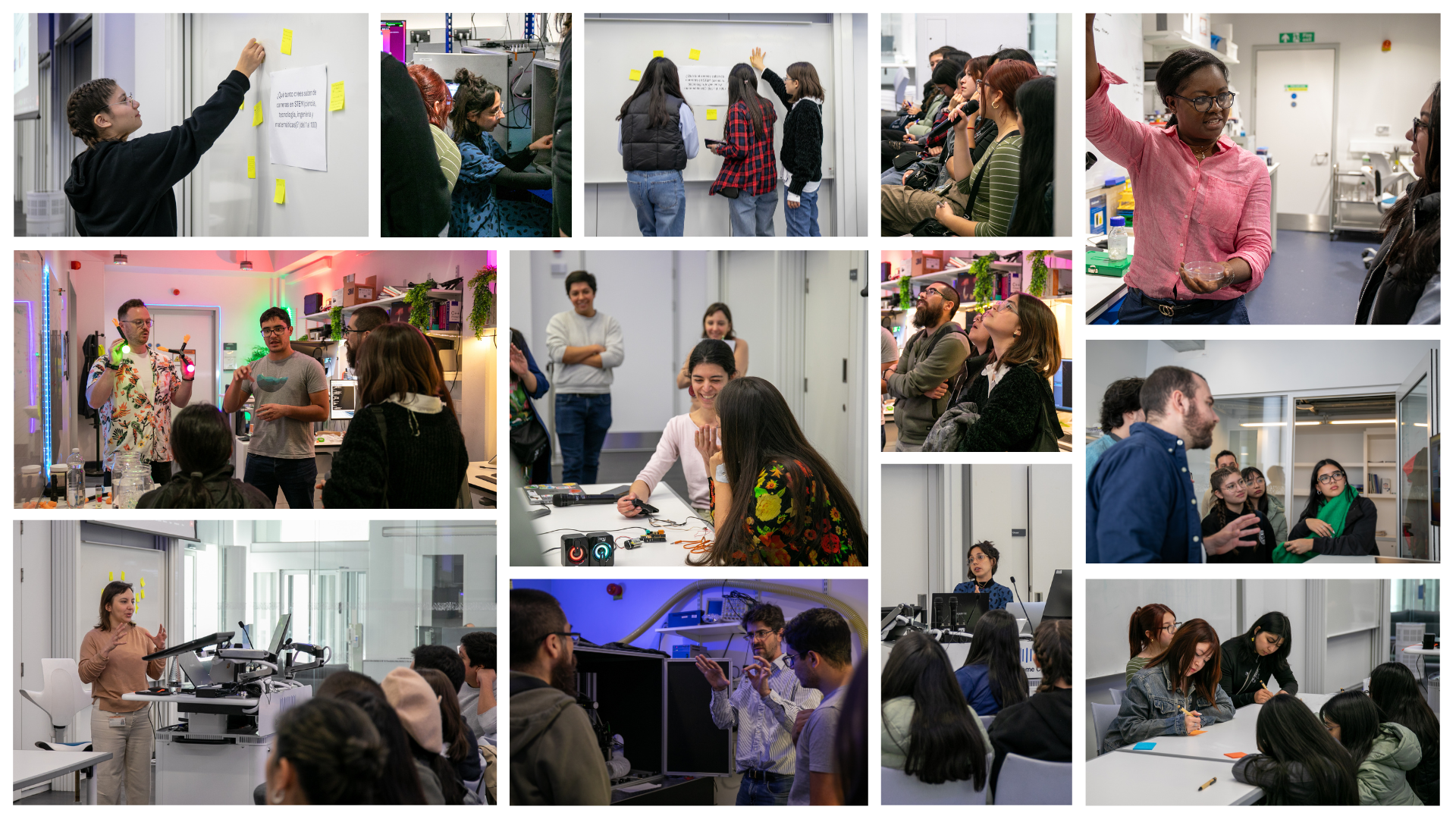
May 2024 - Careers Live broadcast for teachers
We were delighted to partner with the Central London Careers Hub on our first Careers Live broadcast on 23 May. Our Head of Research Communications and Engagement April Cashin-Garbutt shared more about career pathways in neuroscience; advice on school subjects and tips for gaining relevant experience. She also outlined plans for our in-person Teacher Encounter day at SWC on 15 July. Watch the recording
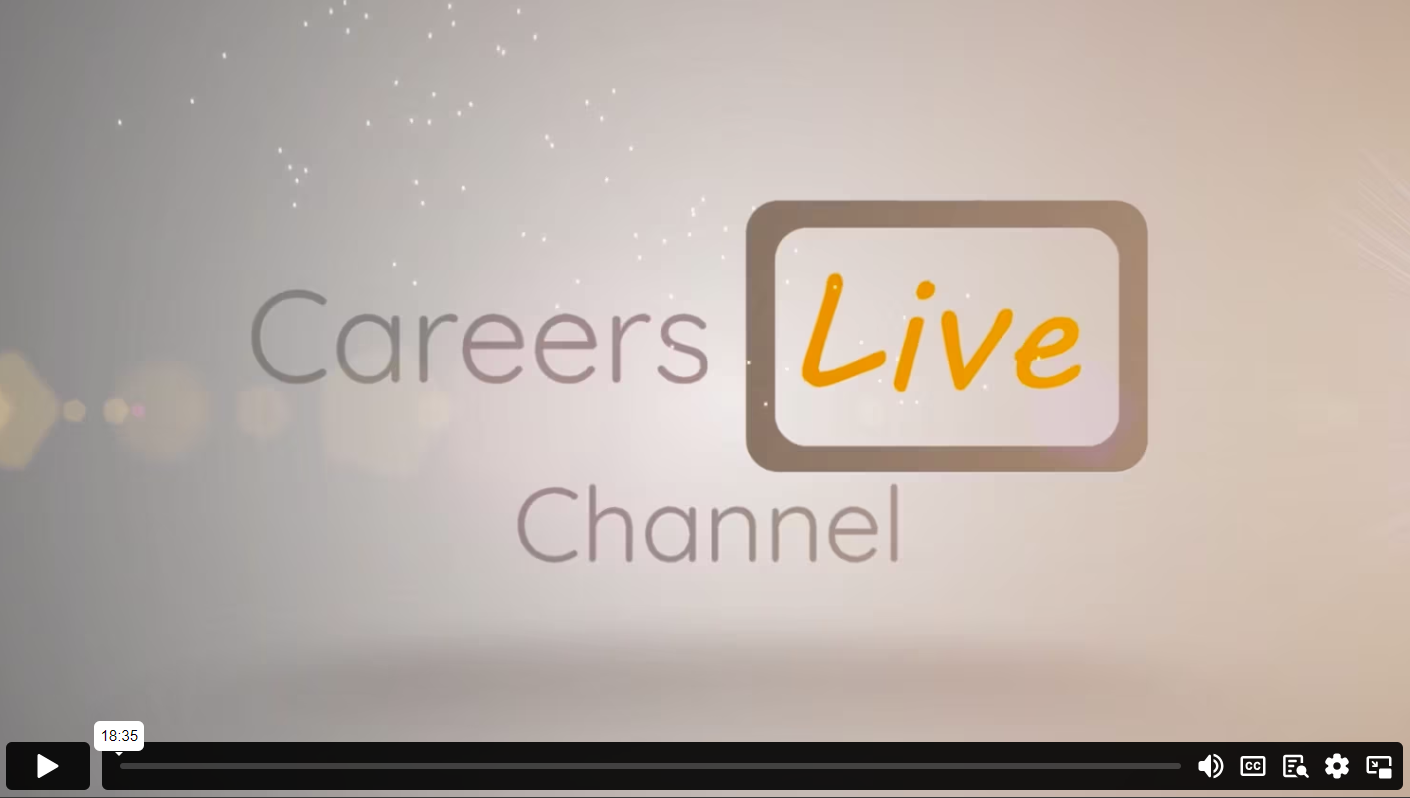
May 2024 - Peter Gordon and Tom George give Pint of Science talks
On Tuesday 14 May, SWC Microscopy Specialist Peter Gordon and PhD student Tom George gave talks in Chiswick and Fulham, respectively, for the Pint of Science festival. Senior Research Fellow Konstantinos Koukoutselos and PhD student Joanna Chang (Clopath Lab) helped organise the events.
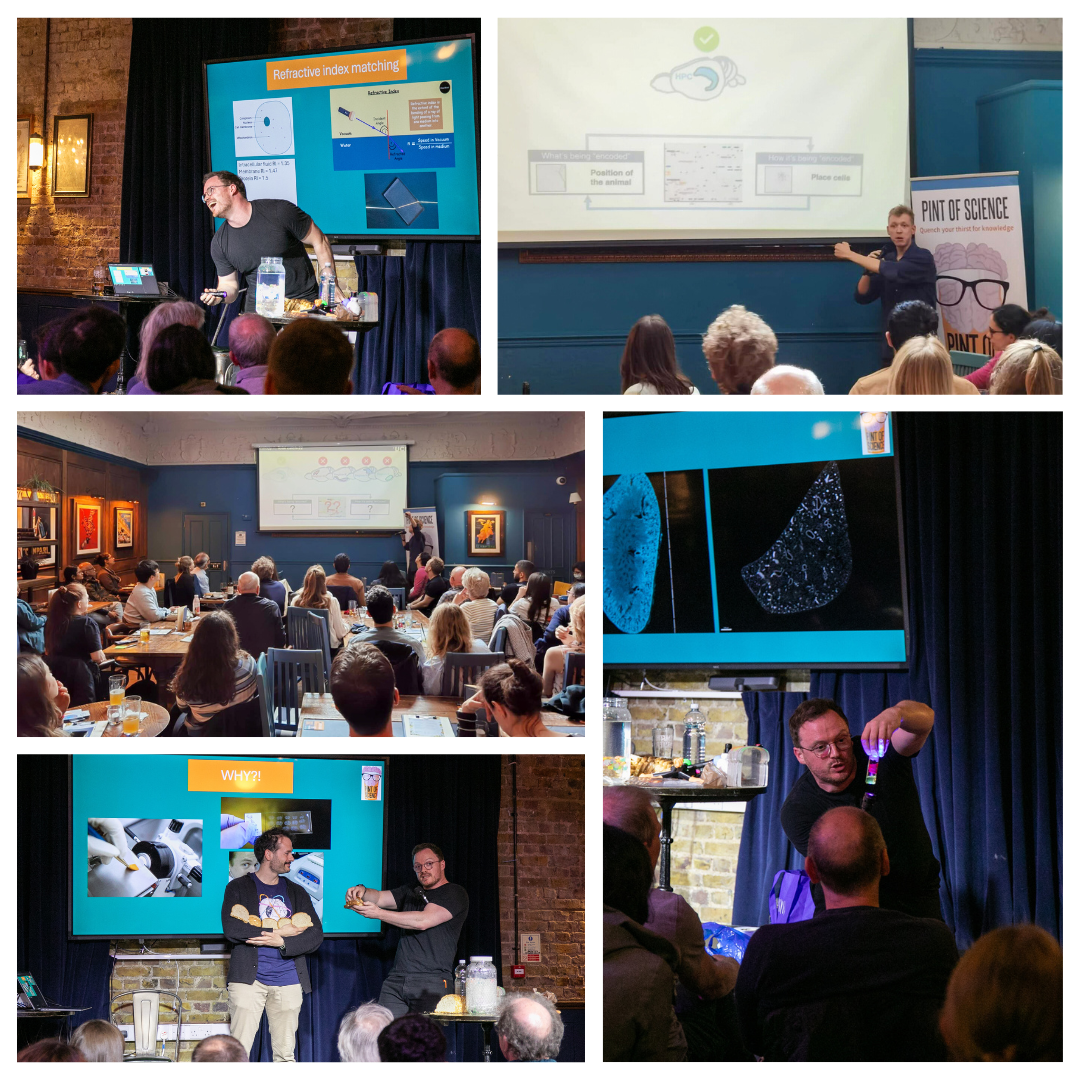
May 2024 - Building joysticks at William Perkin High School
SWC researchers Jesse Krichefski, Hannah Davies, Tadej Bozic, and PhD student Masahiro Nakano visited William Perkin High School on 3 May to lead sessions on Engineering for Year 7 and 9 students. Following Jesse's talk on Gadgets and Tools in Neuroscience, the students worked in teams to build joysticks for a mouse behavioural experiment.
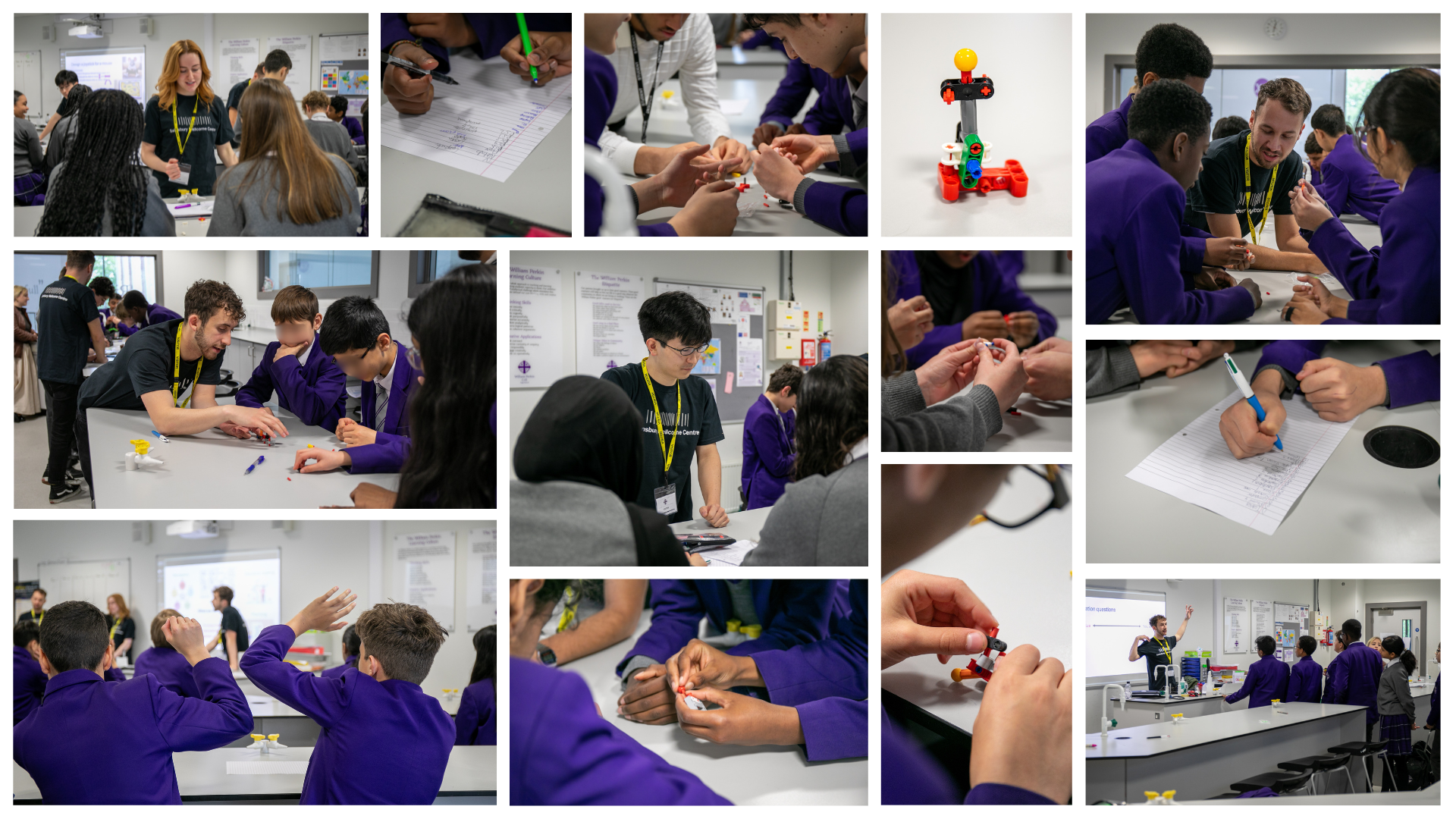
April 2024 - Entrepreneurialism students from Paris visit SWC
On 10 April, 39 Master's students studying entrepreneurialism at École Centrale Supélec (the engineering school of University Paris-Saclay), visited SWC. The purpose of the visit was to get a better understanding of the world of science, technology and business development.
Talks were given by SWC researchers and scientific staff Emmett Thompson, Peter Gordon, Jessica Broni-Tabi, on the processes of neuroscience research. SWC alum Matthew Phillips also gave a talk on his experience creating a startup following his PhD in neuroscience at SWC. Feedback from the session showed that students were keen to capitalise on their renewed understanding of neuroscience and interactions with neuroscientists to inform their future entrepreneurial endeavours.
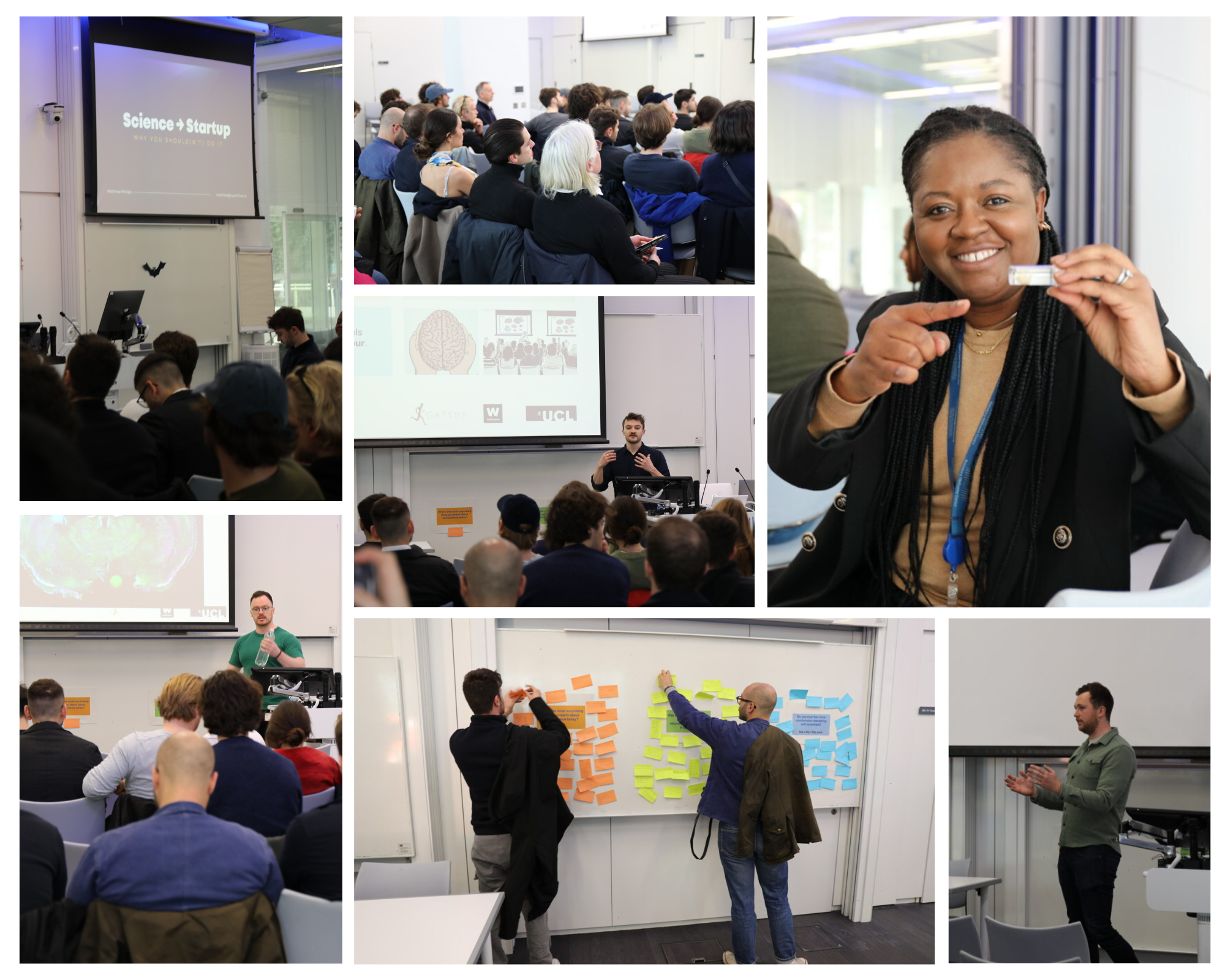
January 2024 to March 2024 - Neuronauts School Club
First organised in 2023 and led by SWC PhD students Svenja Nierwetberg, Jai Bhagat, and Dammy Onih, helped by teaching assistant Pip Coen, the 2024 Neuronauts School Club invited London secondary school students to the SWC. The School Club is part of the Neuronauts programme at SWC which is built on the principles of increasing accessibility, excitement, and career prospects in science.
Students met every other Saturday, focussing on coding and software design: students learnt to use Python (a high-level, general-purpose programming language) to build simple web or phone applications. The students also constructed drones and their projects were entered into the Big Bang Competition with one group nominated for The Civil Aviation Authority Future in Aviation Award.
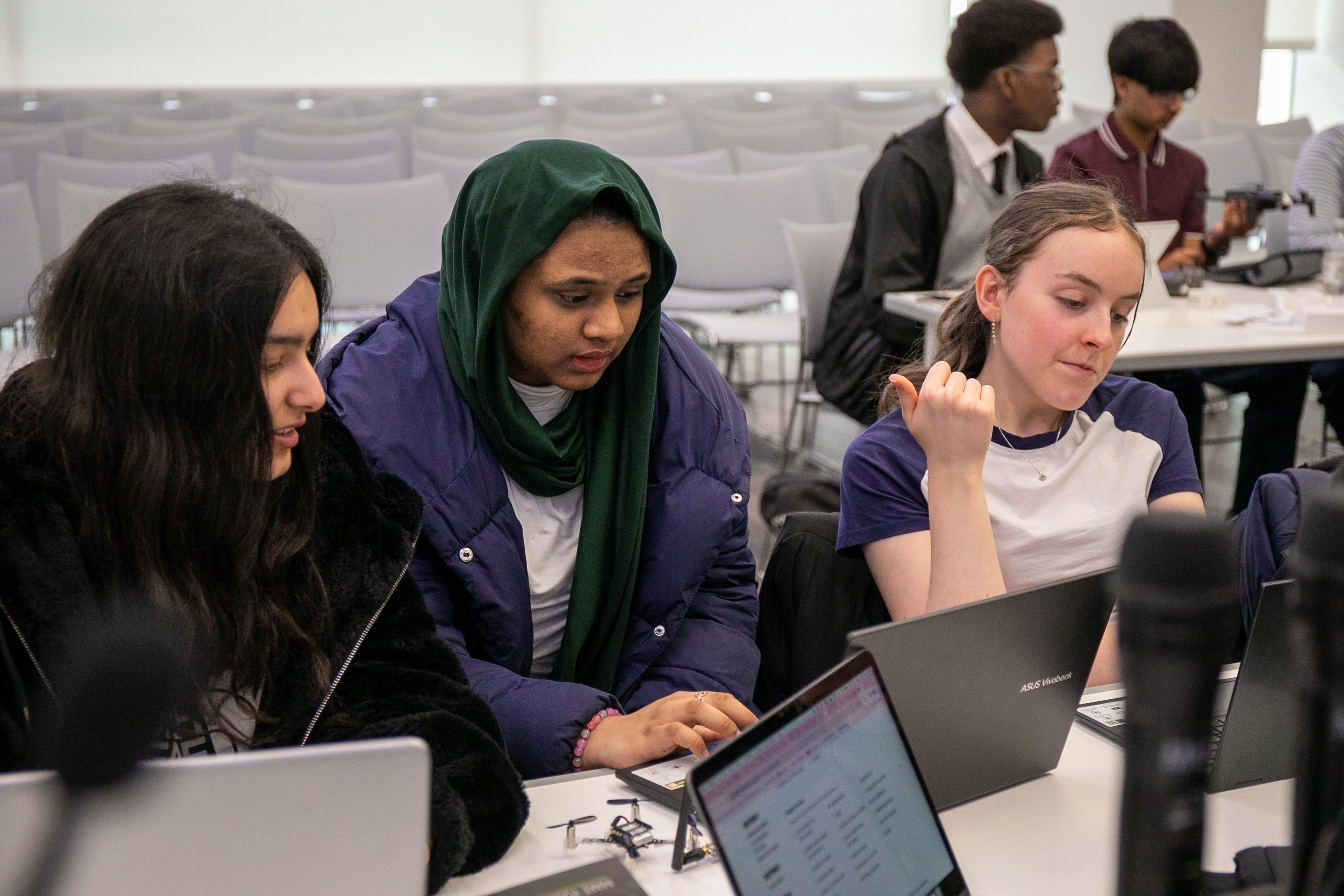
March 2024 - University College Utrecht students visit from The Netherlands
On 27 March, 28 students from University College Utrecht in The Netherlands visited SWC. GCNU PhD student Aaditya Singh and GCNU Research Fellow Brendan Bicknell gave talks on topics in theoretical and computational neuroscience, as well as machine learning. SWC PhD student Nicole Vissers gave a talk and video demonstration of her experiments, covering topics in systems and experimental neuroscience.
Talks were followed by a Q&A with the panel composed of Aaditya, Brendan, Nicole, and GCNU PhD student Kira Dusterwald. Students asked questions about the research areas discussed and on applying to PhD programmes, including how to choose a lab.
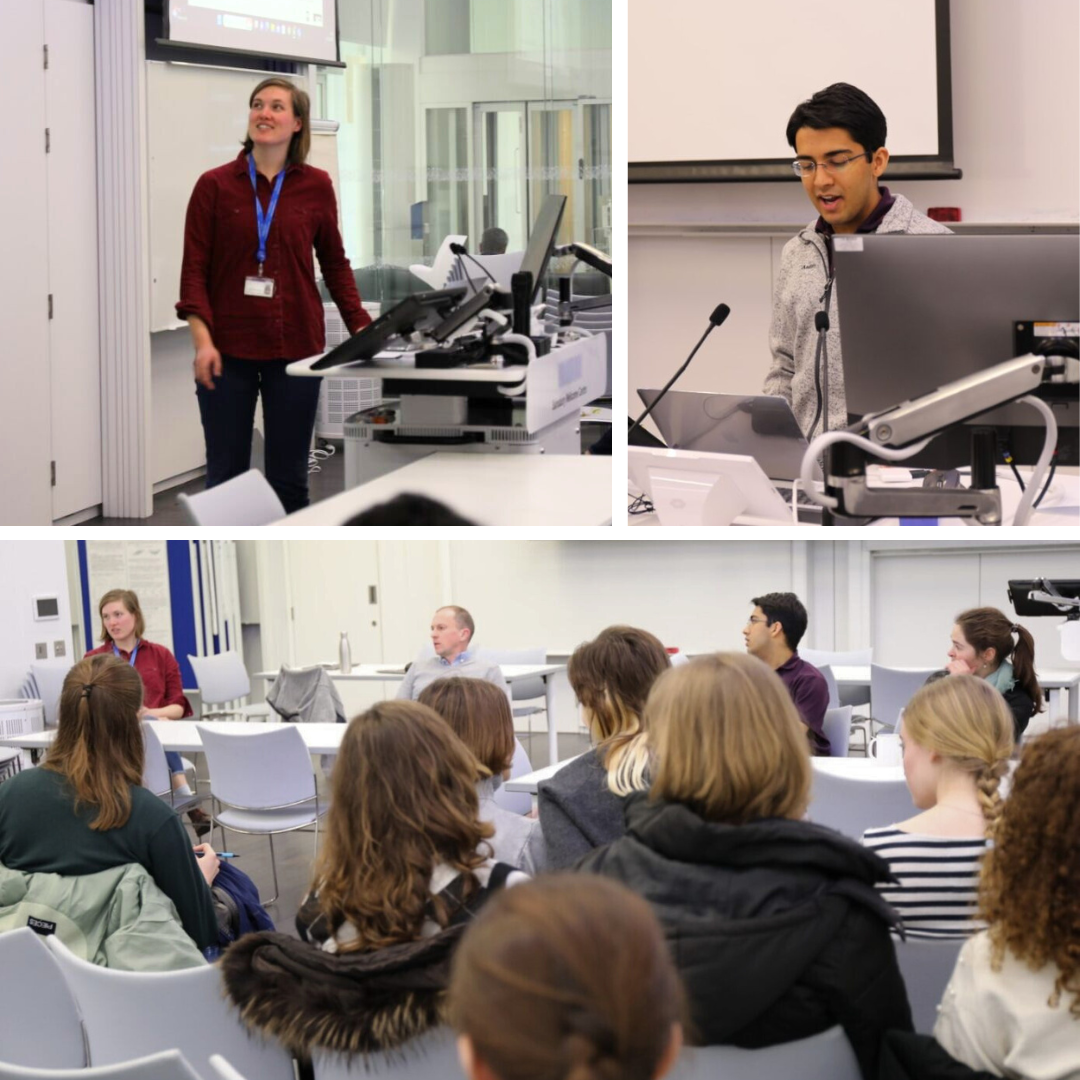
February 2024 – BNA Careers and Talent Recruitment Fair
We were delighted to partner with the British Neuroscience Association (BNA) on our first Careers and Talent Recruitment Fair on 22 February. The event, divided into morning and afternoon sessions, welcomed around 80 delegates and 20 representatives from organisations across academia and industry including UK DRI, Parkinson’s UK, and Miltenyi Biotec. Opening remarks by Laura Ajram (CEO, BNA) and Tom Otis (Chief Scientific Officer, SWC) set the stage for networking and one-on-one meetings, where representatives shared insights and expertise.
Attendees engaged in organic discussions, establishing meaningful connections. Irina Jurenka (Senior Staff Research Scientist, Google DeepMind) and Colby Benari (CEO, In2science UK) shared their career journeys in inspirational talks. During breaks, participants enjoyed refreshments while building professional relationships, which made for a dynamic and collaborative atmosphere. Read the full report
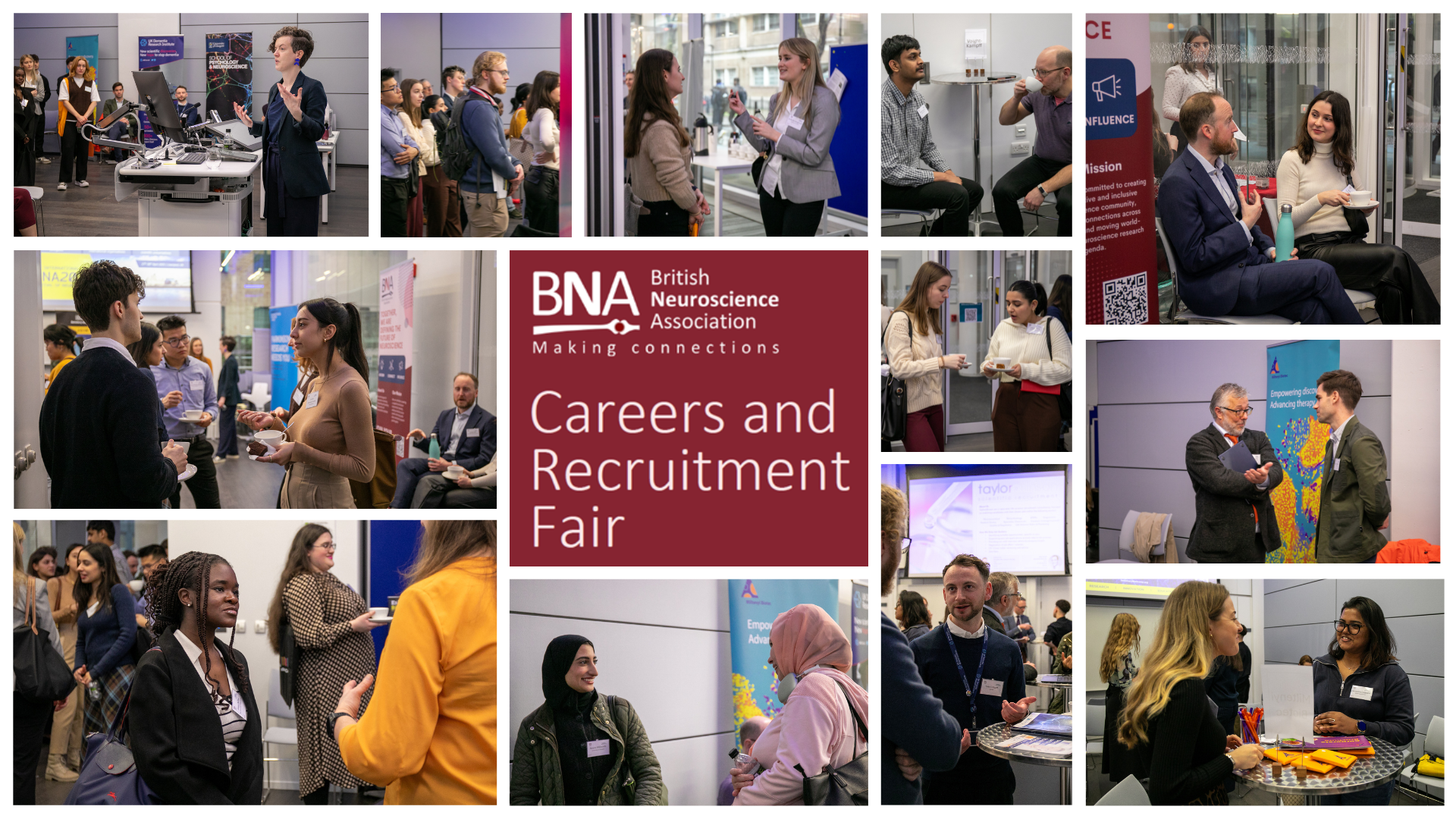
October 2023 - In2scienceUK students meet with SWC researchers
From 23 to 25 Oct, two Year 13 students from the In2scienceUK programme joined researchers in the Behrens lab to get a glimpse into what research looks like at SWC. Senior Research Fellow Diksha Gupta and PhD Students Beatriz Godinho and Chongyu (Xiao) Qin gave the students a tour of the building, including experimental rooms. The students also met with researchers in the Mrsic-Flogel, Erlich, Hofer, and Burgess labs, learned about Neuropixels, and participated in journal club.
Diksha, Beatriz, and Xiao shared that the three-day experience was extremely rewarding. With their expertise, they taught the students about reinforcement learning (RL) and how the Behrens lab uses the RL framework in their research. In addition to coding, the students had the chance to further learn about the nervous system through a Mindflex game and arm control demonstration.
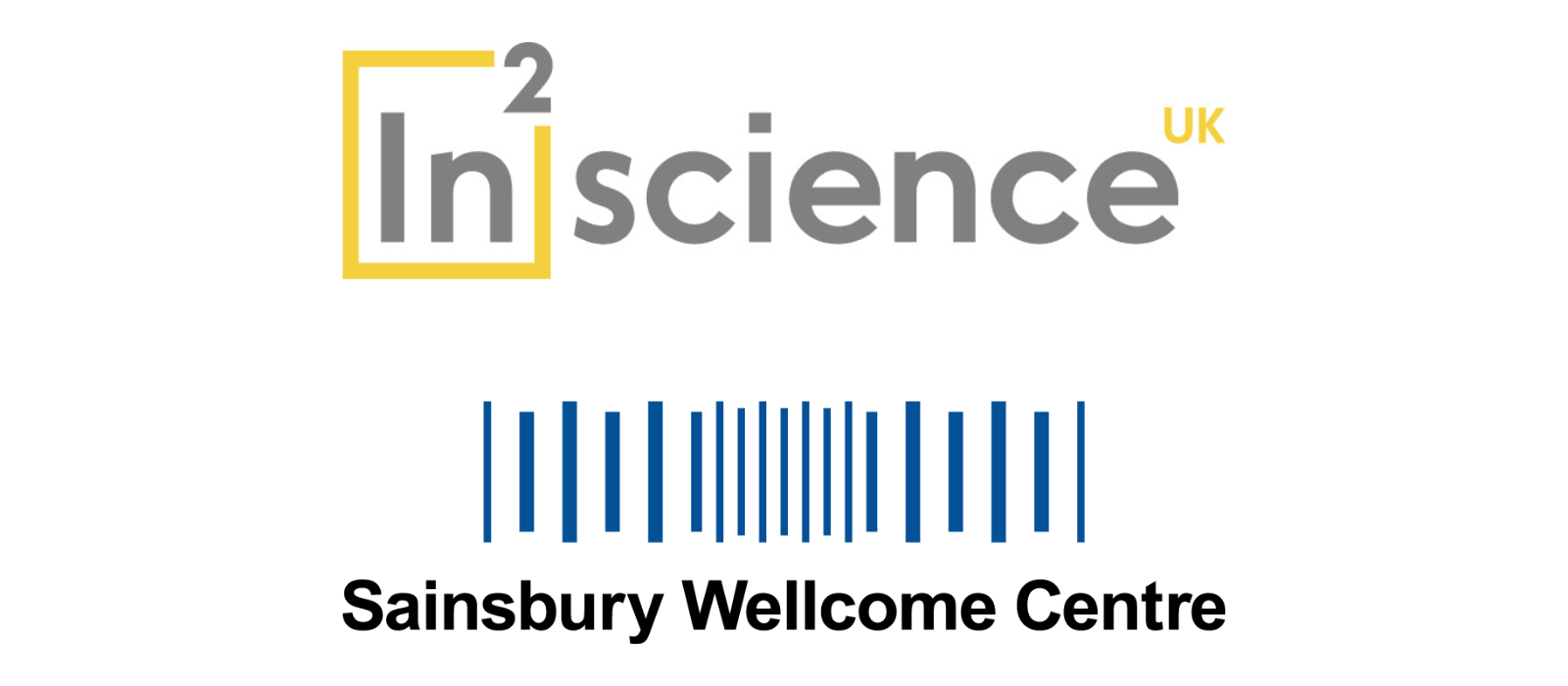
October 2023 - Biology Week #IAmABiologist Career Profiles
To celebrate Biology Week 2023, we supported the #IAmABiologist campaign by sharing career profiles of four SWC researchers. SWC Senior Research Fellow Loukia Katsouri as well as PhD Students Alice Koltchev, Dammy Onih, and Tom Hagley explained how they came to be neuroscientists at SWC and their advice for secondary school students interested in becoming biologists. The career profiles are formatted into posters and slides for secondary school teachers to share with their classes. Check out the profiles in our Teacher Resources page
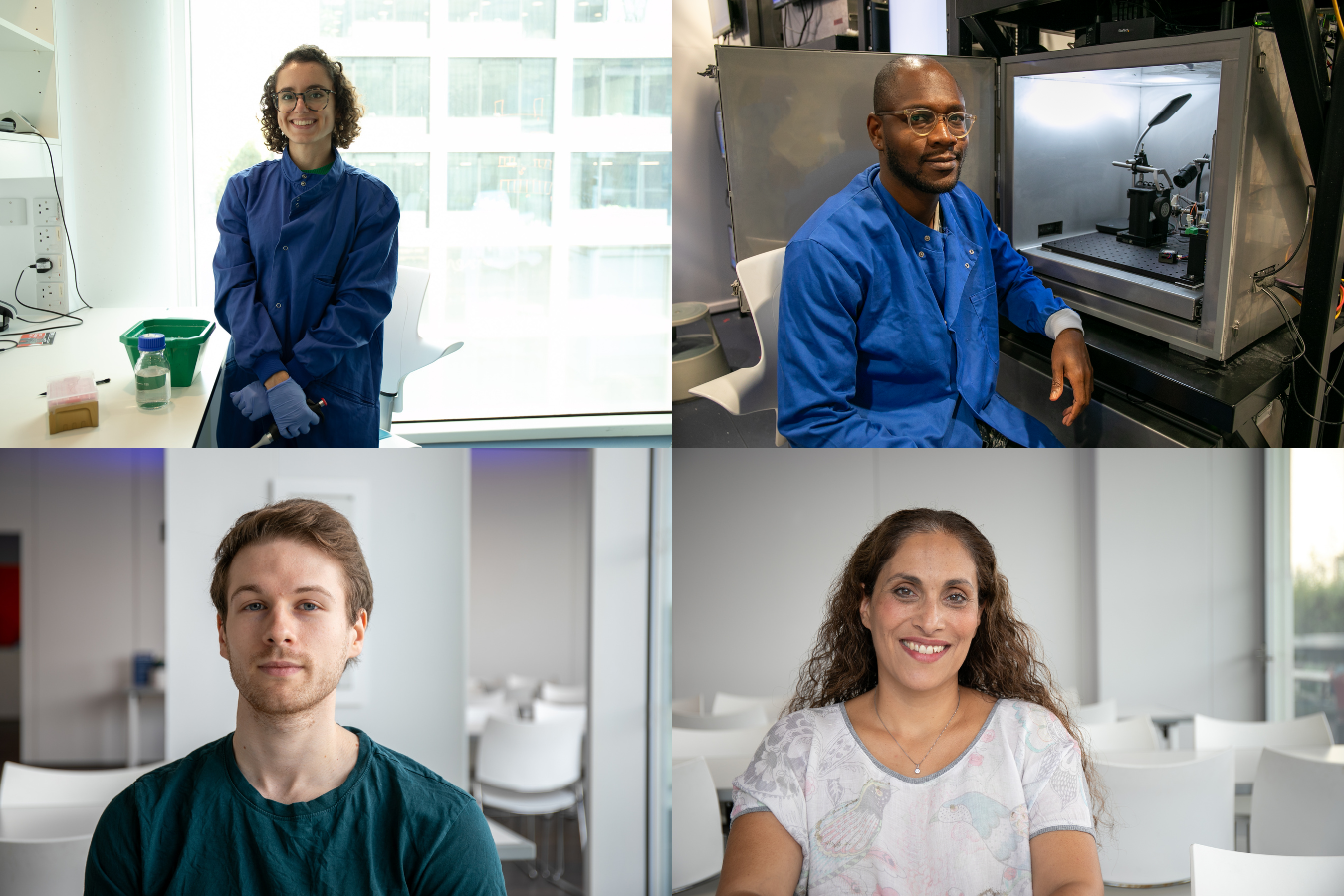
August 2023 - BrainCamp Kosovo
From 15 to 17 August, PhD alumni Egzona Morina and Federico Claudi led the sixth annual BrainCamp held at Pristina, Kosovo. 20 students from the ATOMI Institute aged 16-18 participated in lessons around artificial intelligence, neuroprosthetics, and brain computer interfaces. With the help of the EmotiBit, a wearable mini-computer with sensors, students were able to participate in experiments that used biofeedback, ranging from a closed loop monitoring and control of heart rate. They also had the opportunity to come up with their own project designs, one of which was playing songs based on how a person is feeling! Students also had the chance to discuss research papers on neural data, having been taught the fundamentals of neural encoding and decoding. SWC PhD students and postdocs have participated as teachers since the first BrainCamp Kosovo founded by Egzona Morina in 2018.
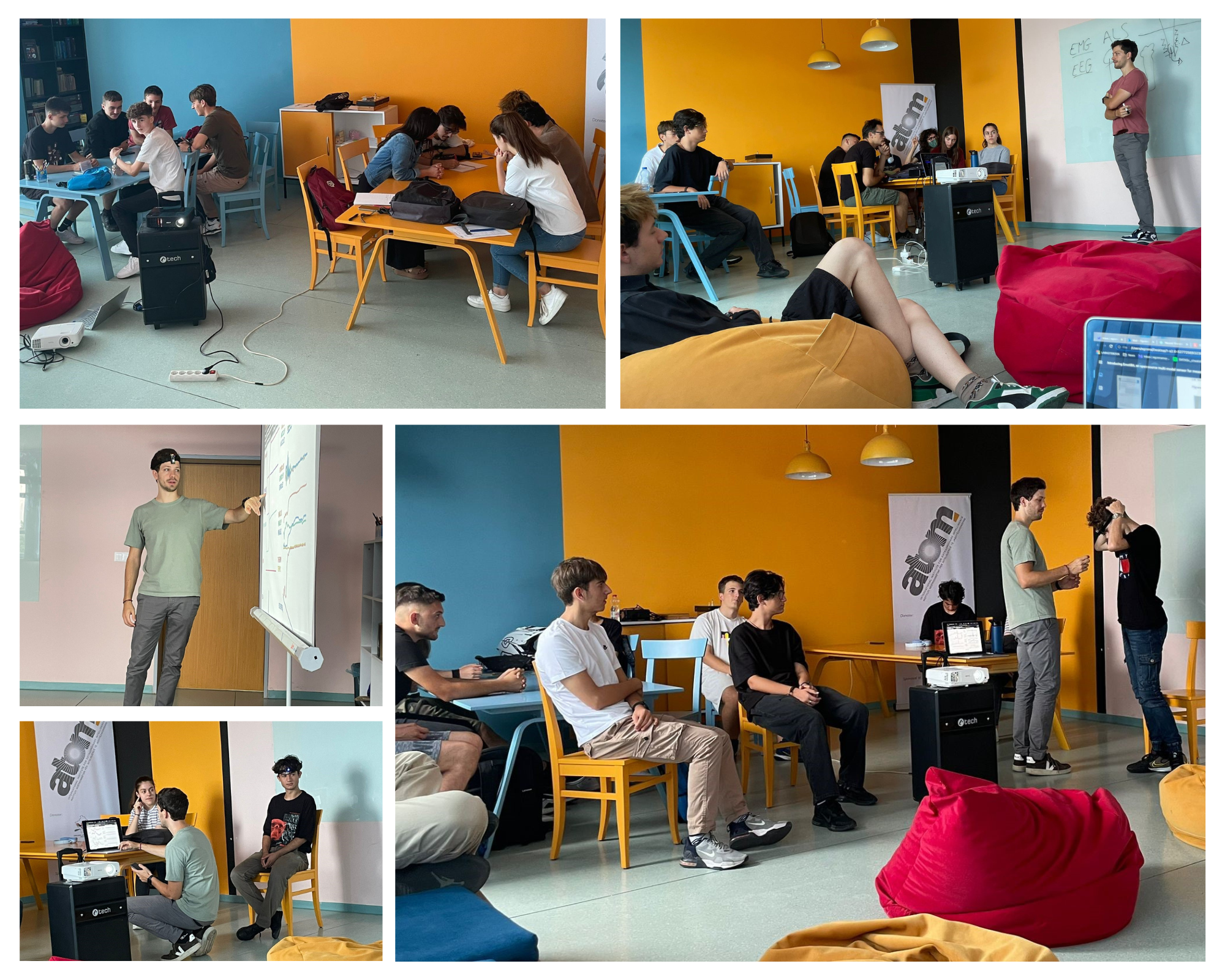
July 2023 - Neuronauts
From 10 to 14 July, 9 secondary school students (aged 14-15) from London participated in the Neuronauts 2023 summer camp, following on from the inaugural camp last summer. Hosted at SWC, the course this year was run by the Voight-Kampff Foundation team in collaboration with the Neuronauts team of SWC and GCNU PhD students. Neuronauts students learned about the fundamentals of technology, from electrons to AI, while building their own brain-shaped robot. They also had a chance to visit the labs and meet some of the neuroscientists at SWC. Find out more about Neuronauts
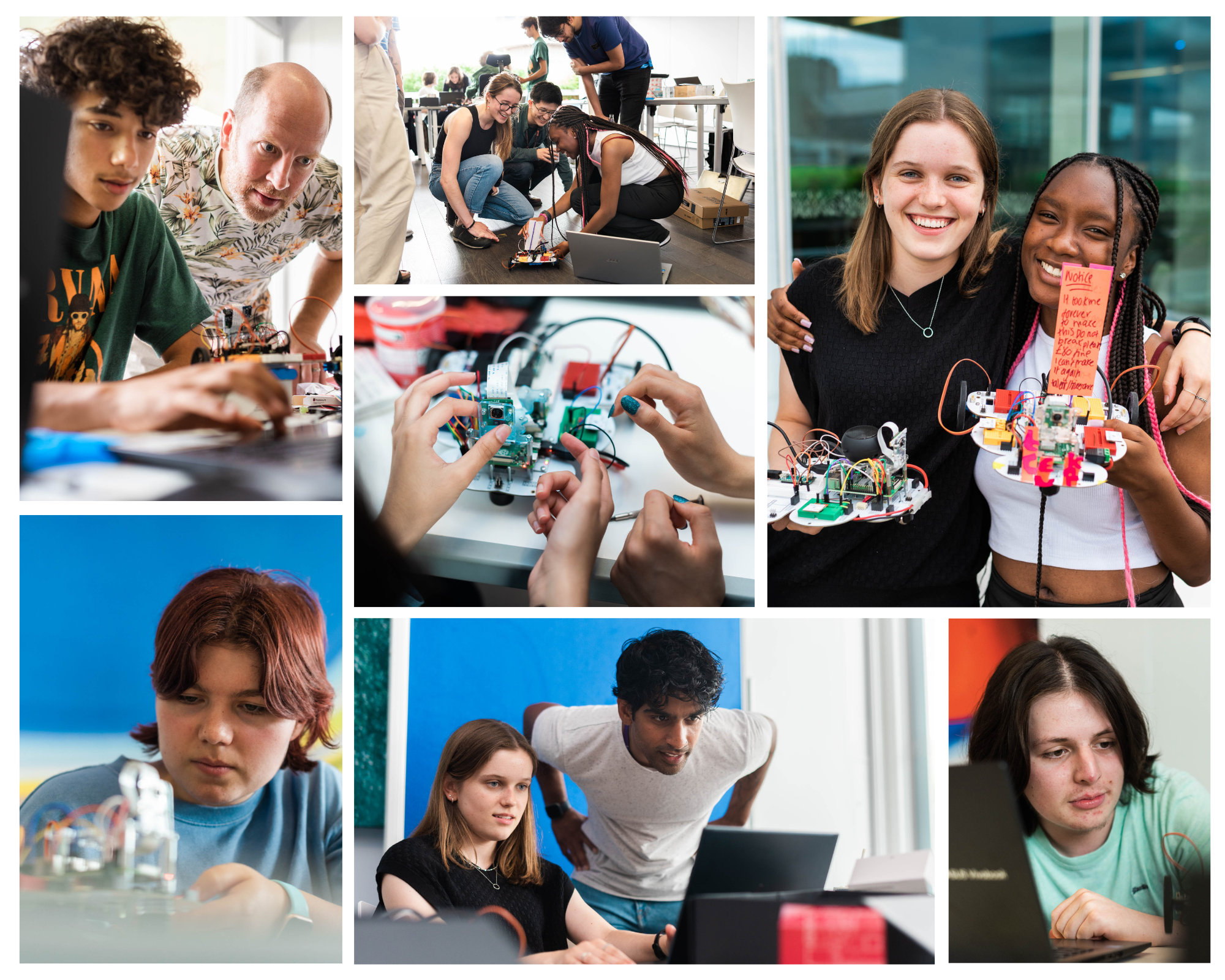
October 2022 to July 2023 - Neuronauts School Club
During the academic year 22/23, SWC PhD students Svenja Nierwetberg, Dammy Onih, and Jai Bhagat organised and led a Science Club for London secondary school students interested in continuing with electronics concepts learned in the Neuronauts 2022 summer camp. Students met every other Saturday from 12-4pm. After talks on fundamental neuroscience from PhD students Nicole Vissers and Zane Mitrevica, as well as SWC Research Fellow alum Fred Marbach, students continued with lessons on robotics, sensors, and the Bonsai visual programming language.
In January, students started brainstorming for a final project to submit to the Big Bang Fair competition and settled on designing a space station that is accessible for visually impaired astronauts. The School Club was also supported by PhD student Ella Svahn, and Neuronauts organisers Pip Coen and Danbee Kim. After GCSE exams and the competition, the students and organisers celebrated with a picnic in July. All students expressed interest in continuing with the School Club in the 2023-24 academic year.
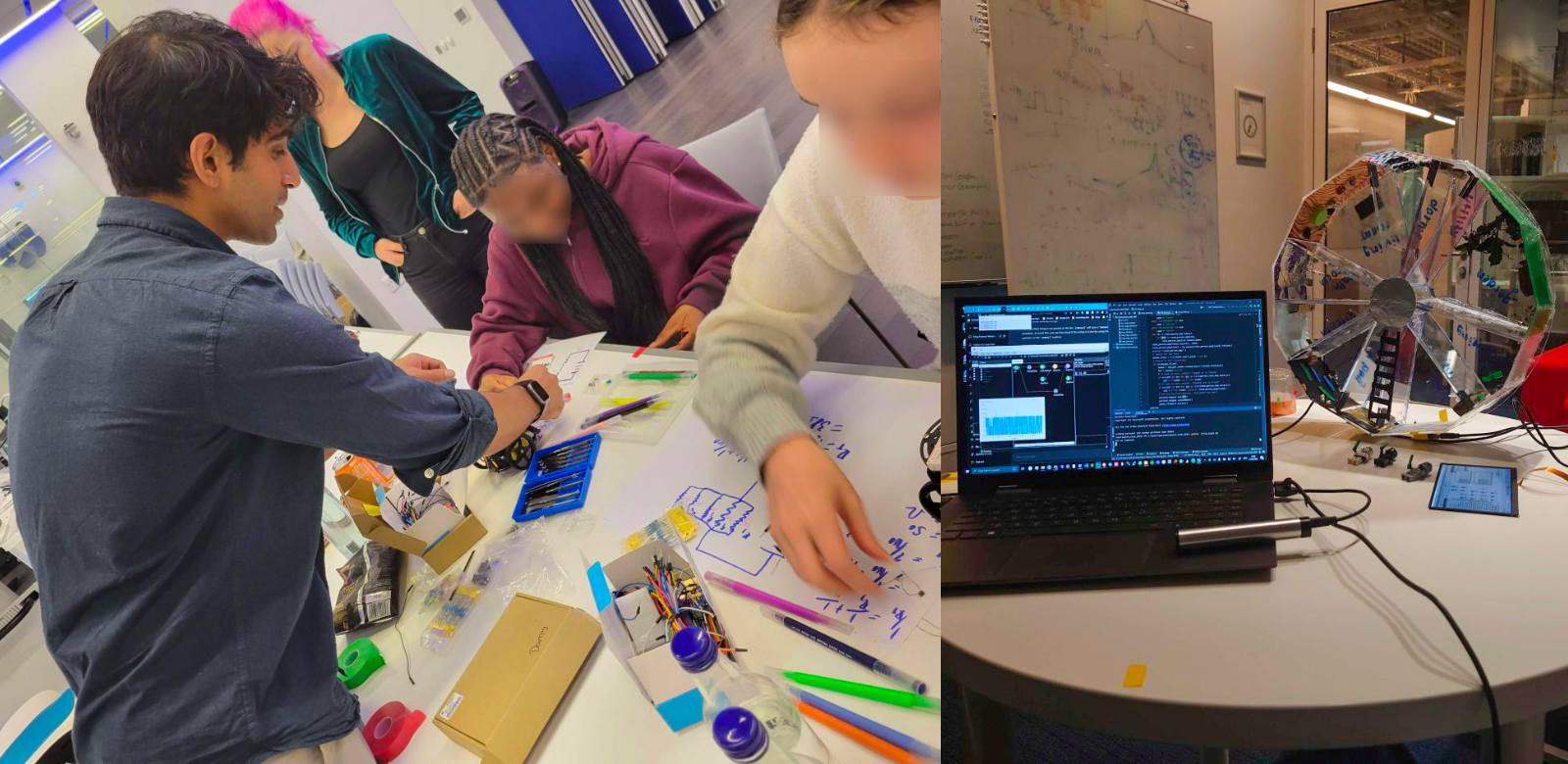
June 2023 - Hillcrest School Science Club win brain hat competition for SWC tour
Following the Big Bang Fair, Science Club students in Key Stage 3 at Hillcrest School, a secondary school in Birmingham, submitted a photo of their brain hats. The group were selected as the winners of our brain hat competition and will receive a tour of the SWC facilities and meet some of our scientists. Congratulations Hillcrest!
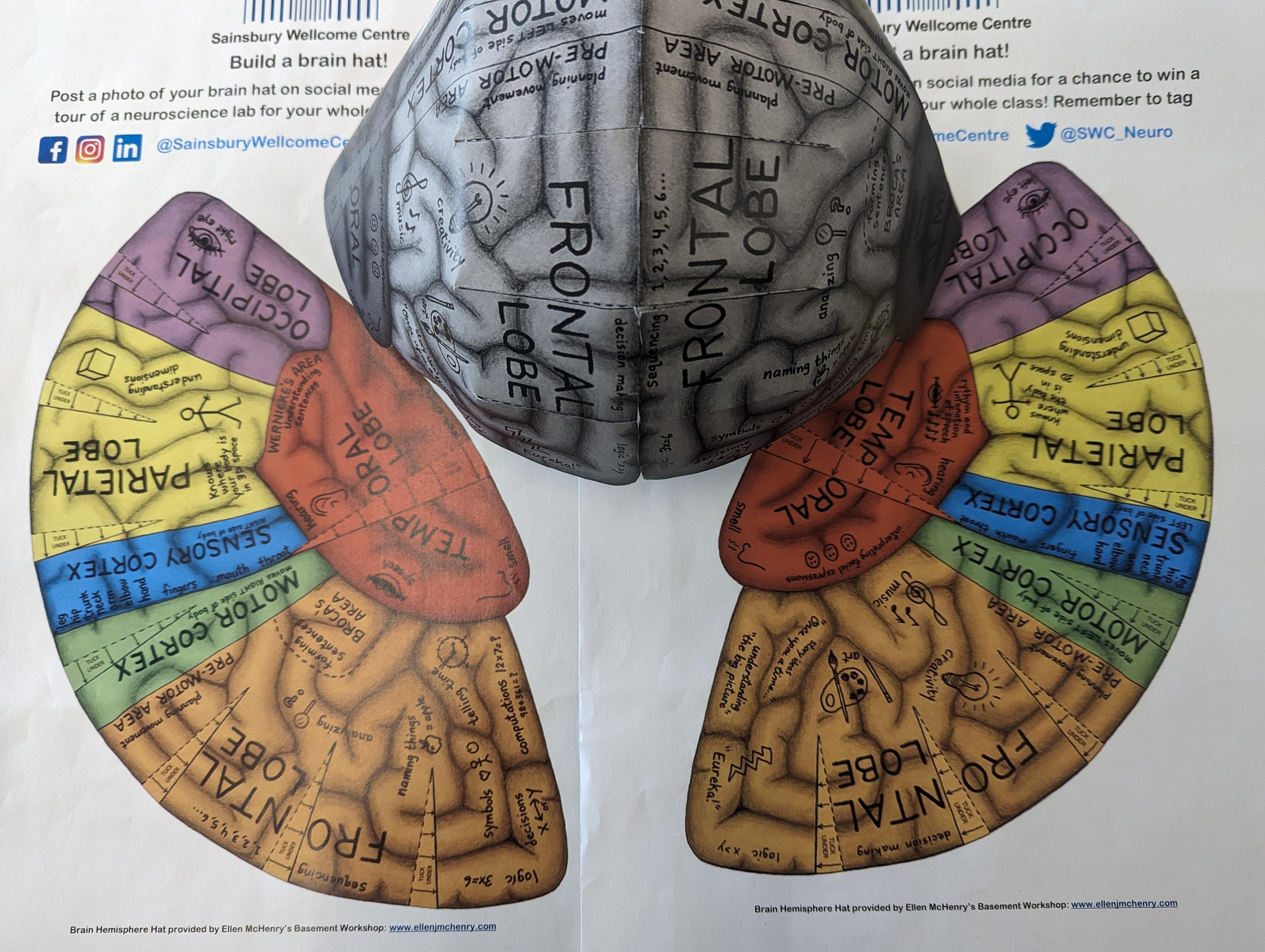
June 2023 - Big Bang Fair
From 21 to 23 June, we exhibited at The Big Bang Fair, an annual science fair in Birmingham. We met over 200 STEM teachers from secondary schools around the UK and had some great discussions about nurturing the next generation of neuroscientists. Many thanks to all our volunteers including Lauren Bennett, Naureen Ghani, Mohadesh Shafiei Kafraj, Haran Shani-Narkiss, and Julia Yin.
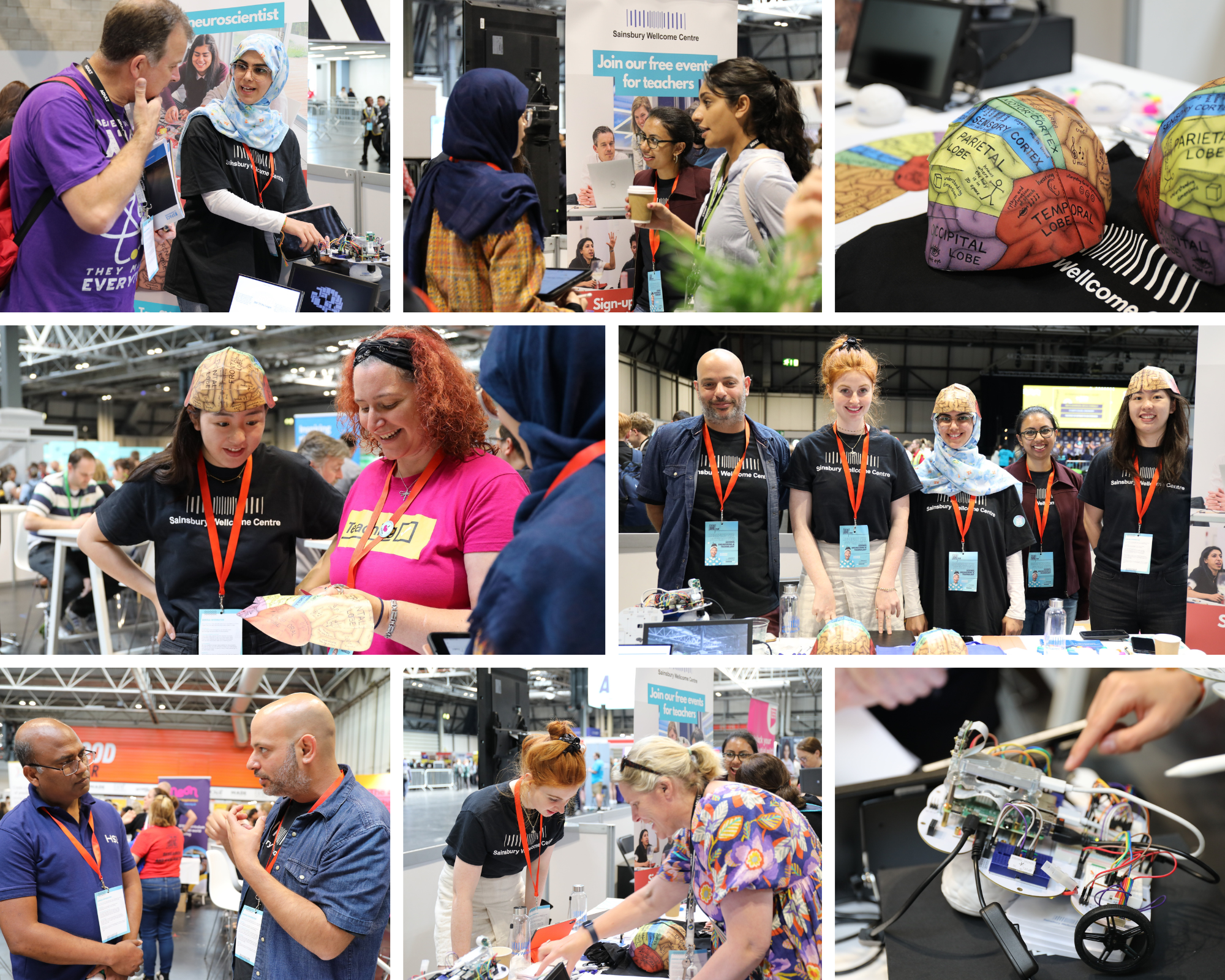
June 2023 – The SWC Lecture by Professor Stephen Reicher
We were delighted to host Professor Stephen Reicher from the University of St Andrews for this year's annual SWC Lecture. Live-illustrated by Alex Cagan, the lecture focused on what the Covid-19 pandemic taught us about the importance of creating positive social relations for an effective response.
We were pleased to welcome colleagues from across UCL, members of the local Fitzrovia community, and students taking part in the BNA Scholars, STEM Learning, and In2research programme.
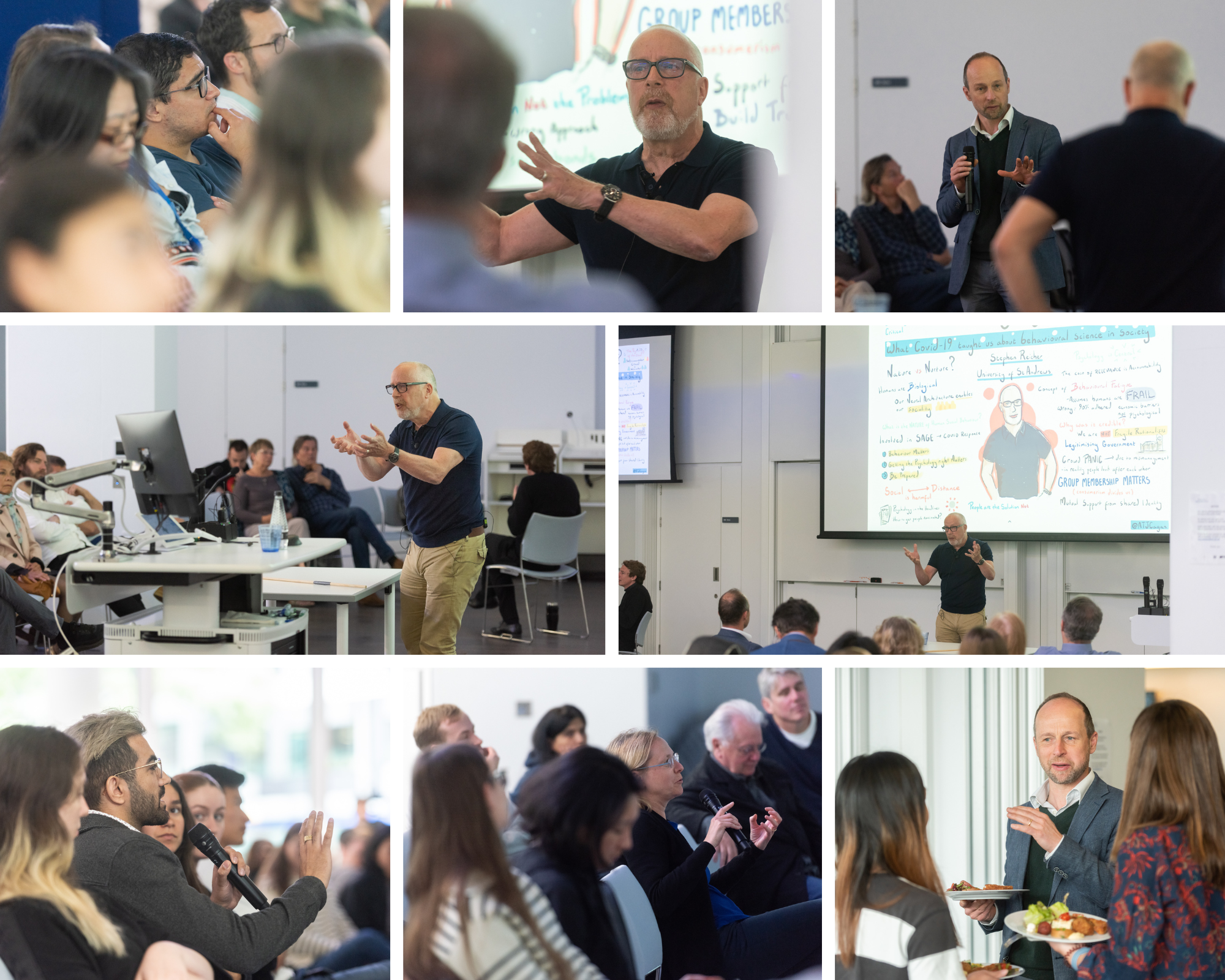
May 2023 – SWC participates in William Perkin School Founder's Day
On 5 May 2023, we visited the William Perkin CofE High School to celebrate their Founder’s Day dedicated to science. SWC Microscopy Specialist Peter Gordon and Histology Research Scientist Jessica Broni-Tabi engaged with Year 10 students on the important role chemistry plays in how scientists visualise neurons in the brain. Students looked through light microscopes at brain tissue from different species and asked questions to learn about histology and microscopy. Read the fully story
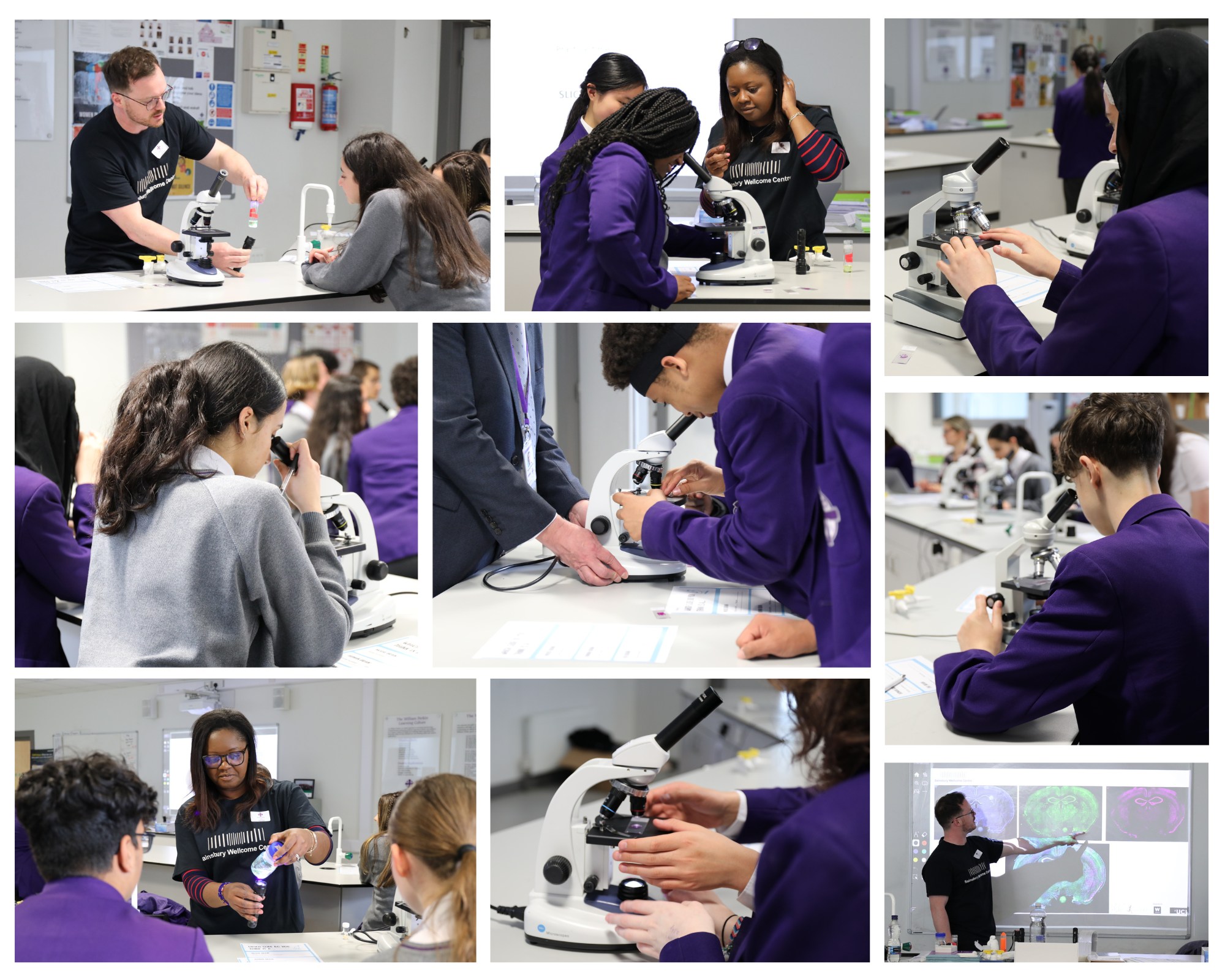
Spring 2023 – Brain workshops and vitrines survey
In March 2023, we hosted brain workshops for the local community where we discussed knowledge and interest in neuroscience in preparation for a new exhibition in our vitrines/window displays on Howland Street. Across four sessions, we met with Fitzrovia residents, local commuters, and regular passersby and worked with qualitative research specialist Curiouser to gather insights.
Following these initial sessions, SWC researchers and staff conducted surveys of passersby on Howland Street throughout April and May 2023. We spoke with over 220 people on knowledge of SWC, the existing vitrines, brain science, and more. Further engagement on the vitrines will follow in due course.
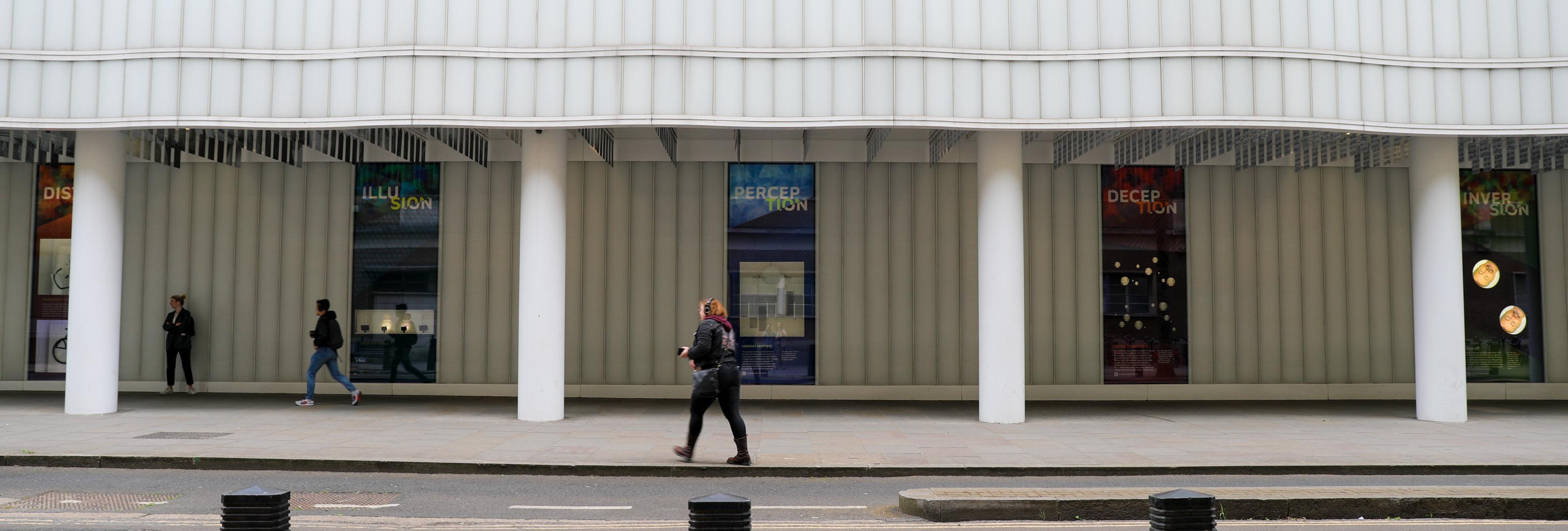
April 2023 – Impact of AI and Neuroscience on the Future of Education: Teachers Event
On 25 April, we hosted an event to help teachers better understand the role of AI in education. The event featured presentations and interactive workshops designed to help teachers explore the potential benefits and challenges of incorporating AI, including ChatGPT, into the classroom.
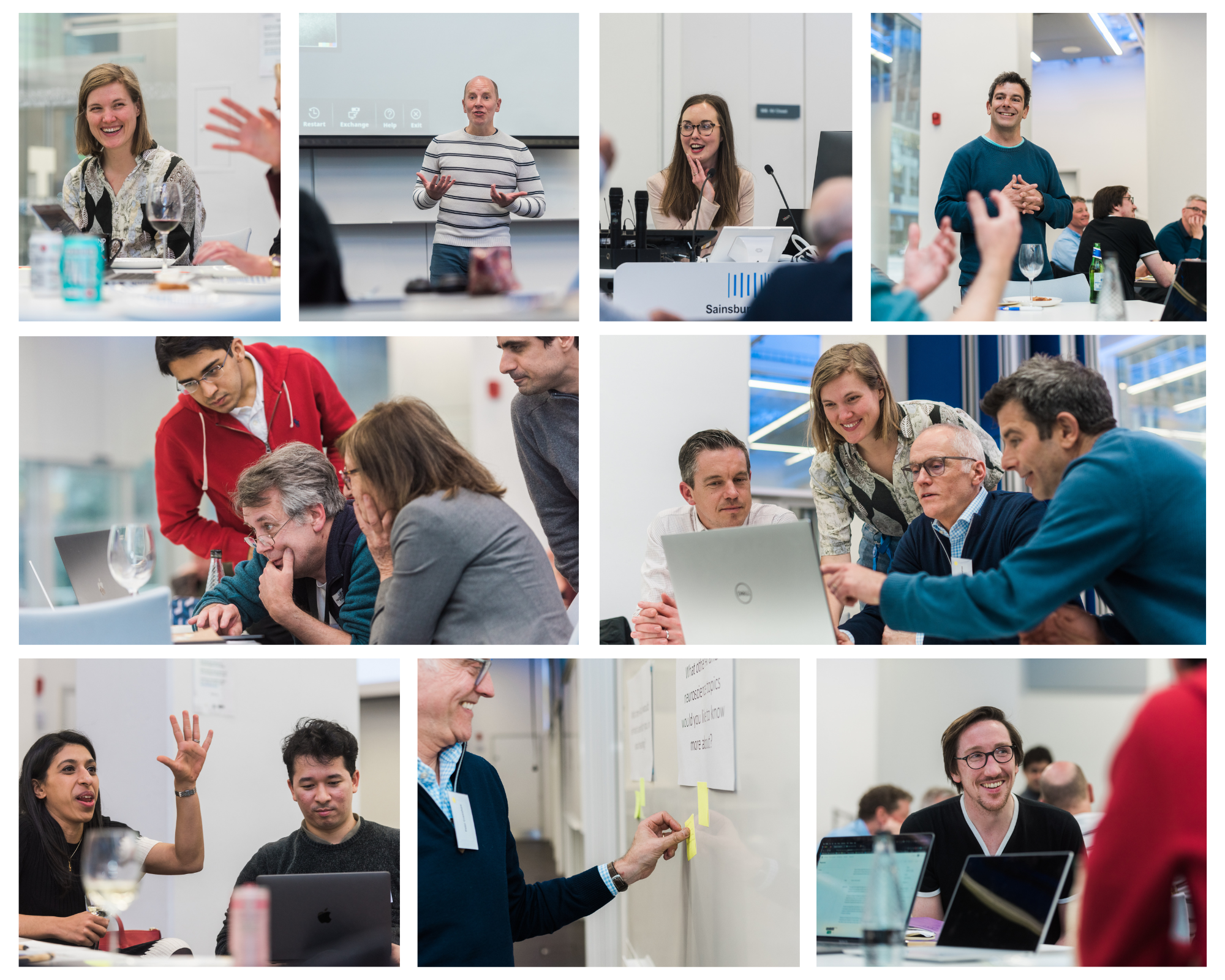
March 2023 - Brain Awareness Week
To celebrate Brain Awareness Week 2023, we shared three new articles featuring the views of SWC seminar speakers on topical questions in neuroscience. The questions centred around artificial and biological intelligence and how intelligence is defined in the context of behaviour. If you missed the articles on our social media channels, you can check them out below.
- How do you define intelligence in the context of behaviour?
- Will AI ever be as flexible as human intelligence?
- Will artificial general intelligence one day be conscious?
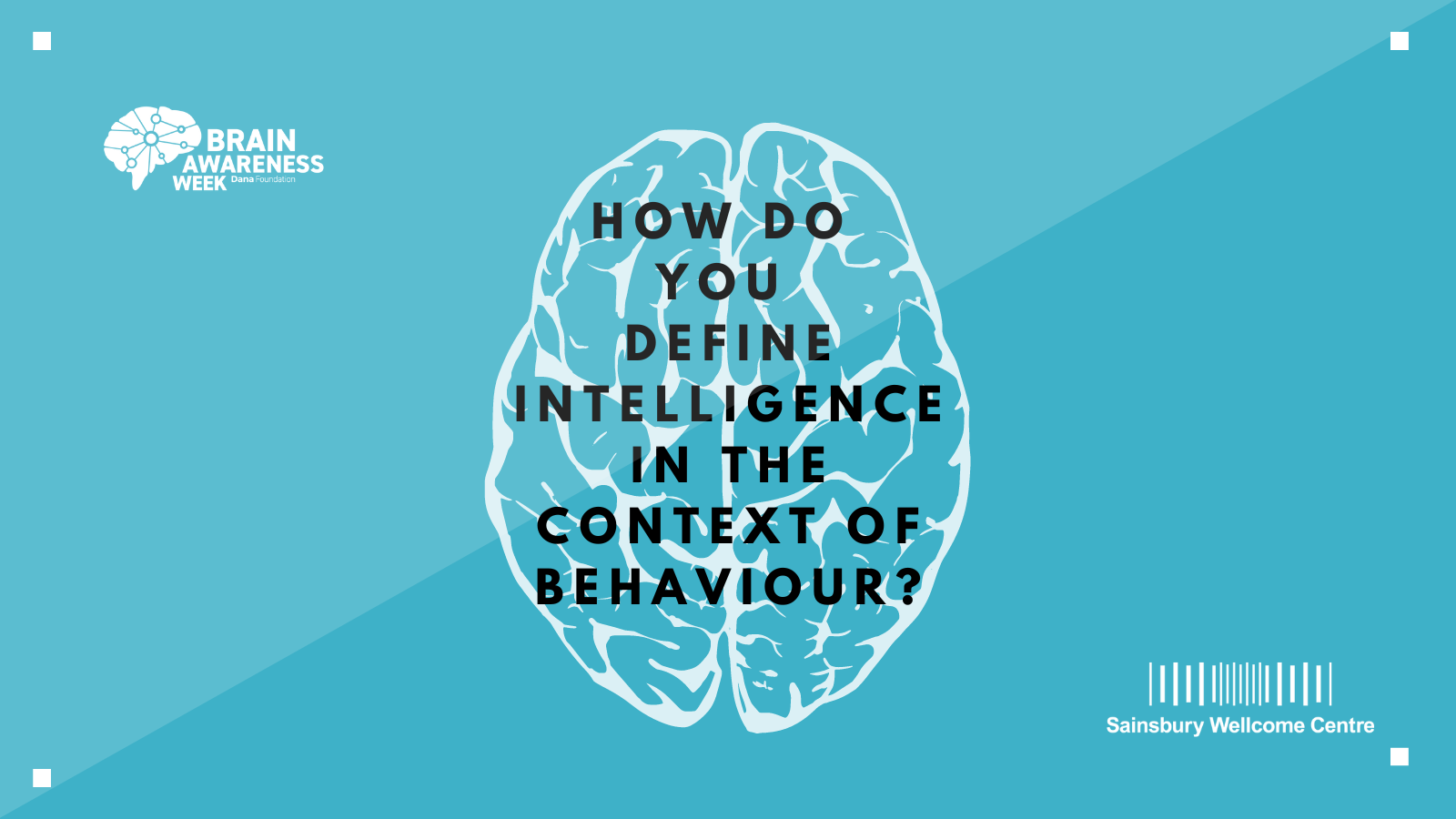
February 2023 – British Brain Bee
On 4 February, PhD students and researchers Jasvin Kaur, Beatriz Godinho, and William Walker (Gatsby Computational Neuroscience Unit) volunteered at the British Brain Bee Competition held at London Metropolitan University. They led engaging activities involving a human-human interface, cerebellar adaptation goggles, and a mind flex game.
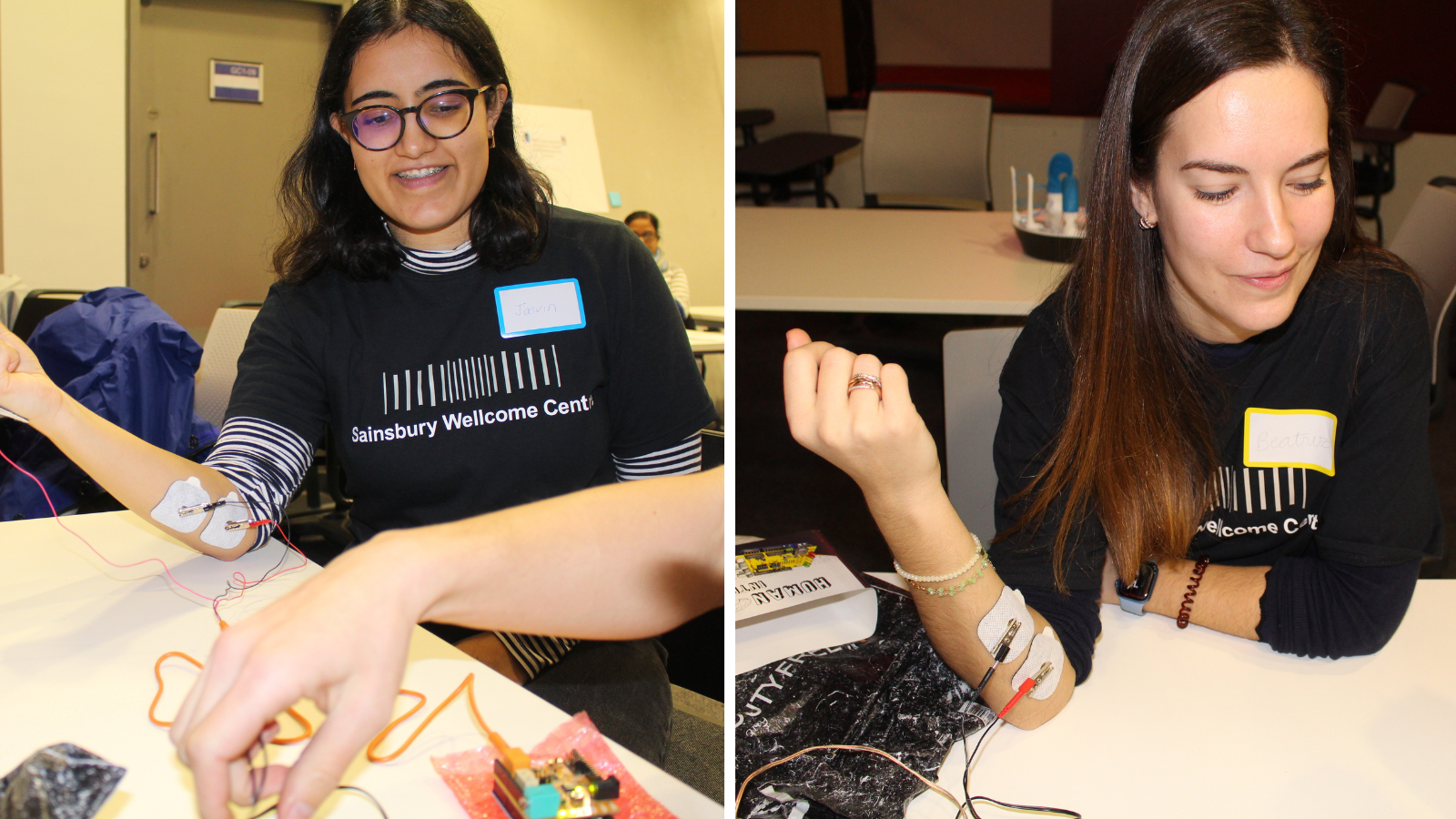
November 2022 – Big Bang Experience Day
On 21 November, we hosted a group of students from the Simon Balle School and Hills Road Sixth Form College, who were winners of the Big Bang Competition pre-pandemic. The students toured some of our facilities, including Advanced Microscopy and Fablab, and were able to interact with researchers and staff to get a glimpse of what goes on behind-the-scenes at a neuroscience research institute.
October 2022 – Biology Week #IAmABiologist Campaign
To celebrate Biology Week 2022, we shared microscopy videos of the brain and careers advice and tips across our social media channels. Our researchers also took part in the #IAmABiologist campaign by sharing photos of themselves in action to highlight the breadth of roles you can do working in bioscience. Check out their #IAmABiologist profiles
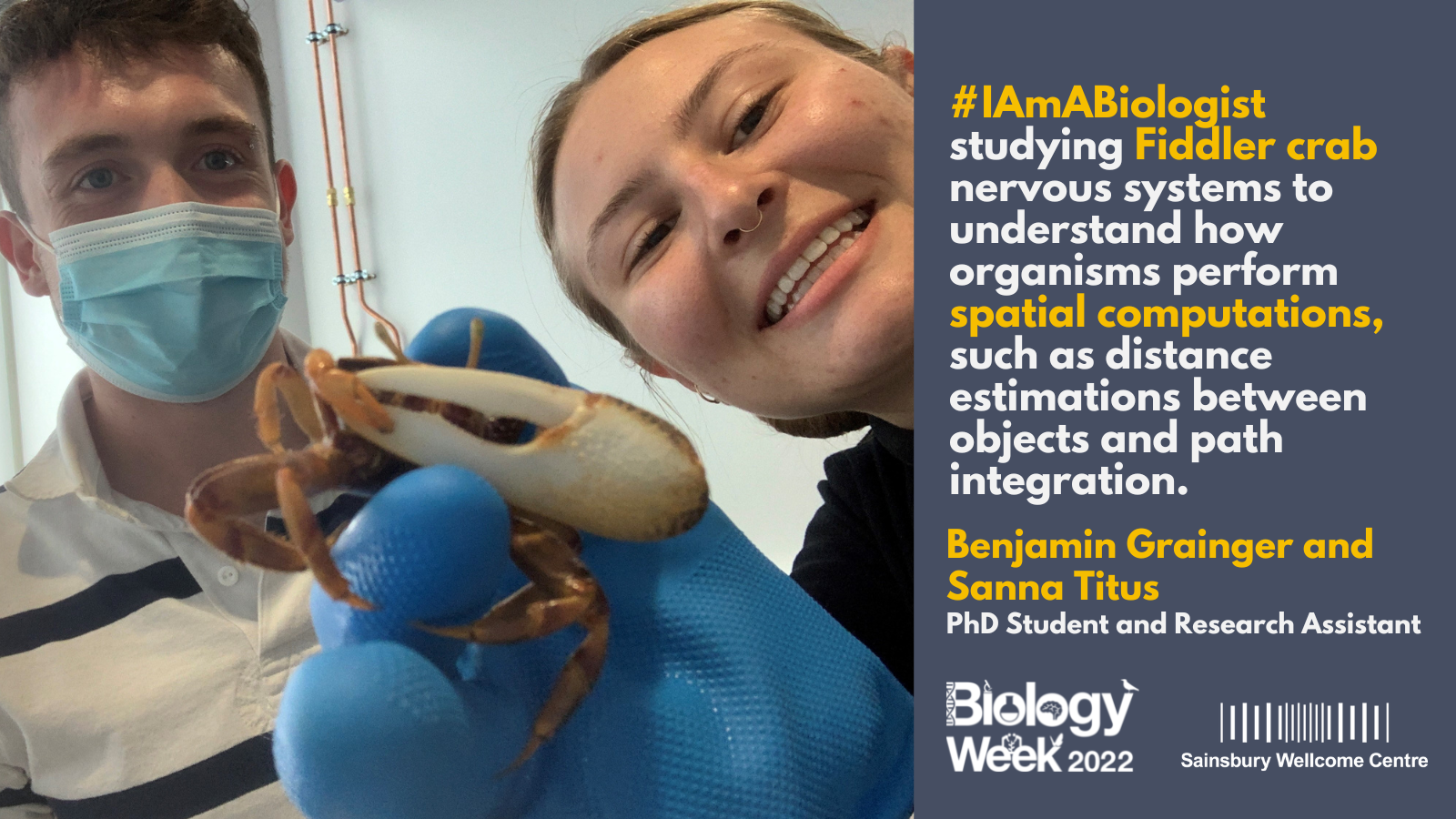
Find out more about Sanna Titus and Benjamin Grainger and PhDs in neuroscience.
August 2022 – BrainCamp Kosovo
SWC PhD students Peter Vincent, Sarah Olesen, Alice Koltchev, and Quentin Pajot-Moric led a neuroscience summer school in Kosovo called BrainCamp. Created by the Xheladin & Xhufe Morina Foundation and in partnership with ATOMI, the annual BrainCamp is geared toward high school students to teach them diverse fields of neuroscience – this year, spanning from theoretical and human behavioural studies of learning to instinctive hunting and escape behaviours in mice. SWC PhD students and postdocs have participated as teachers since the first BrainCamp Kosovo founded by SWC PhD alum Egzona Morina in 2018.
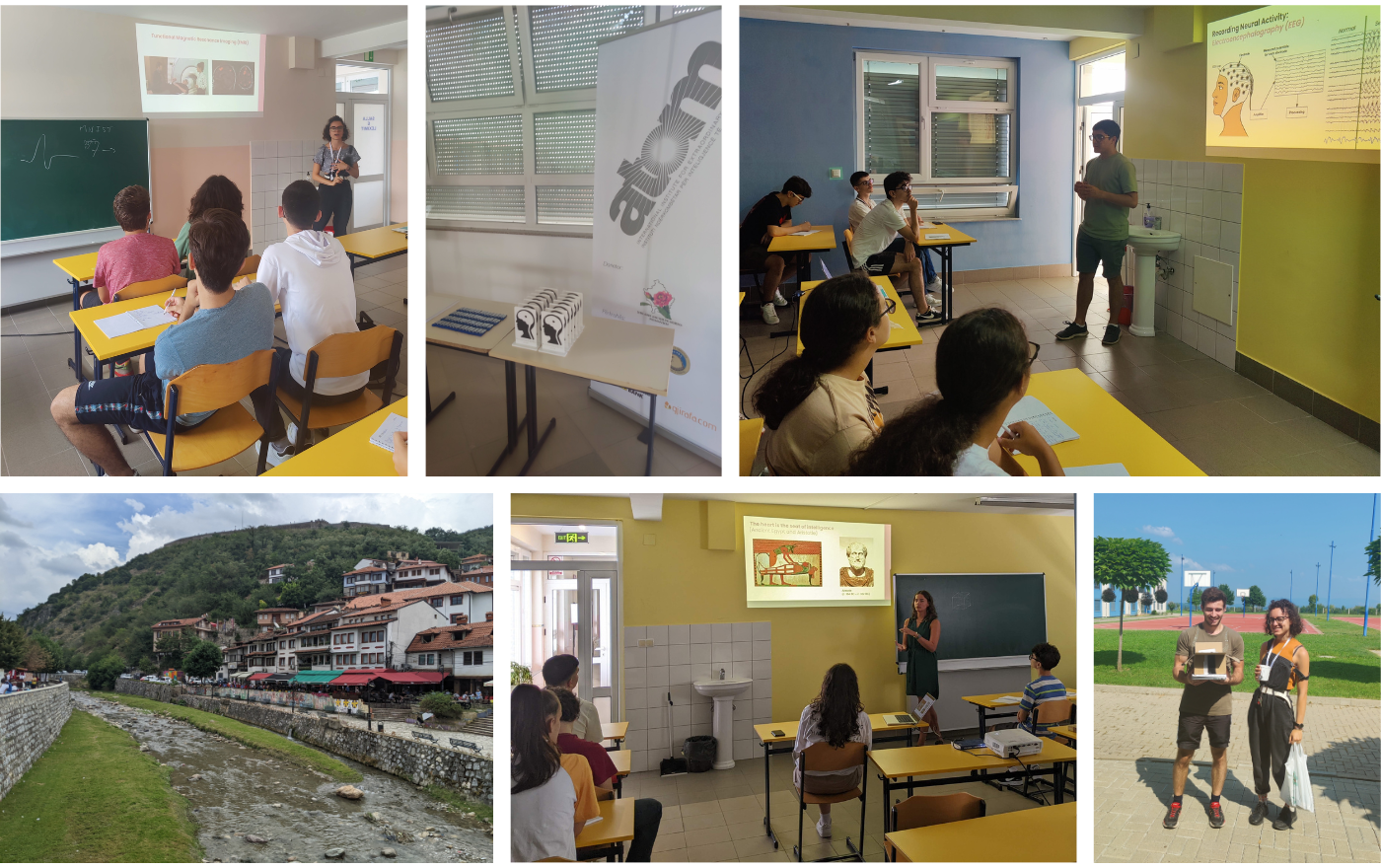
Image credit: Sarah Olesen and Peter Vincent
August 2022 – In2scienceUK students visit the SWC
From 15 to 19 August, Year 12 students from the In2scienceUK programme joined SWC Research Fellow Chryssanthi Tsitoura in the lab and helped with data analysis. The students enjoyed learning to validate cell counts obtained using the automatic cellfinder tool by manually counting cells expressing a fluorescent protein via rabies virus in whole-brain images. In the microscopy facility, the students also saw how mouse brains are mounted on the microscope and how the tissue is sliced and imaged.
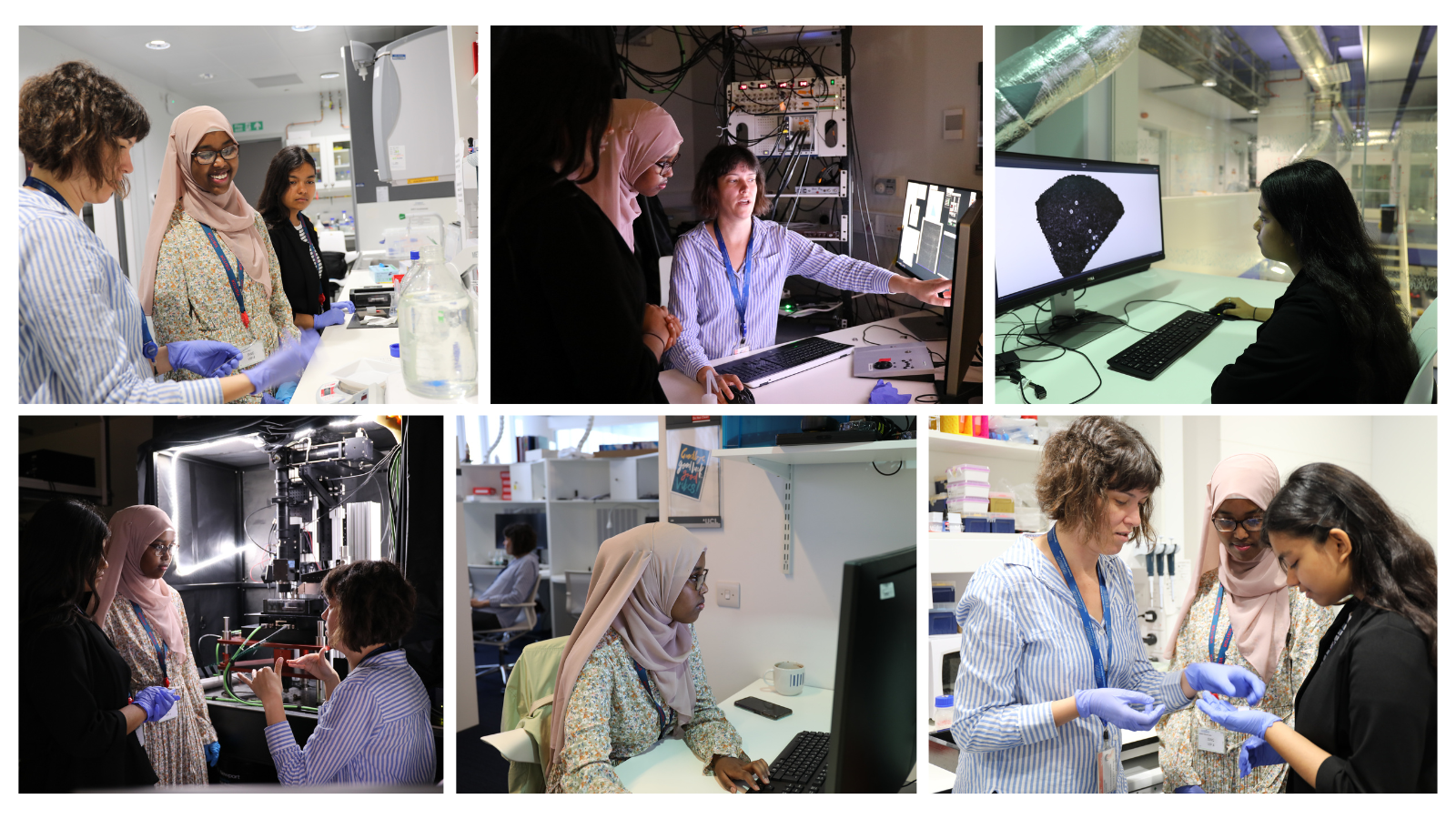
Summer 2022 – Neuronauts
We were excited to host a summer camp for London secondary students (aged 14-16) in July and August 2022. Students learned fundamentals in engineering, computer science, and neuroscience. The camp equipped students to build their own “neurokit” and they underwent a hands-on interactive curriculum to understand how the brain communicates with the body, the physics behind common electronic devices, and analysis of data in programming languages. Find out more about the fully funded camp and reflections from the organisers on this summer
The deadline for applying to Neuronauts 2022 has now passed and applications are closed. If you are interested in attending next year's course or smaller, similarly themed sessions that may take place over Fall 2022 and Spring 2023, please email Neuronauts@ucl.live.ac.uk or jai.bhagat.21@ucl.ac.uk
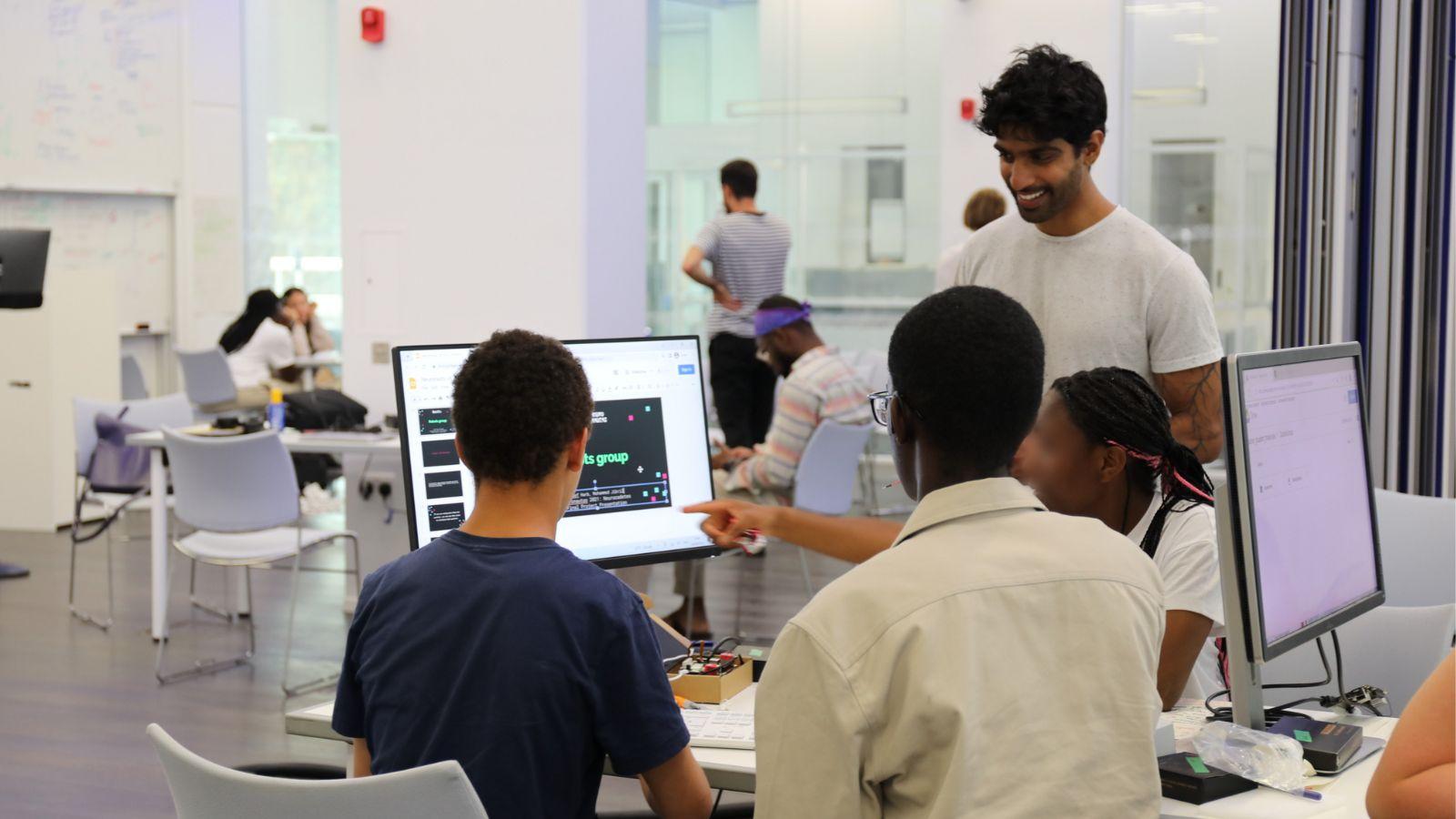
June 2022 – The SWC Lecture by Professor Emily Murphy
We were delighted to host the annual SWC Lecture in-person again this year for the first time since the start of the pandemic. Professor Emily Murphy, University of California Hastings College of the Law, spoke about a simple but radical idea she calls Collective Cognitive Capital: that we can and should be using brain and behavioural science to evaluate public policy decisions by how they affect the cognitive and emotional functioning of the people. The lecture was also live-illustrated by Alex Cagan. The SWC was proud to welcome colleagues across UCL and members of the broader London community, including students taking part in the Social Mobility Foundation and In2research programmes. Watch the full recording of the lecture on YouTube
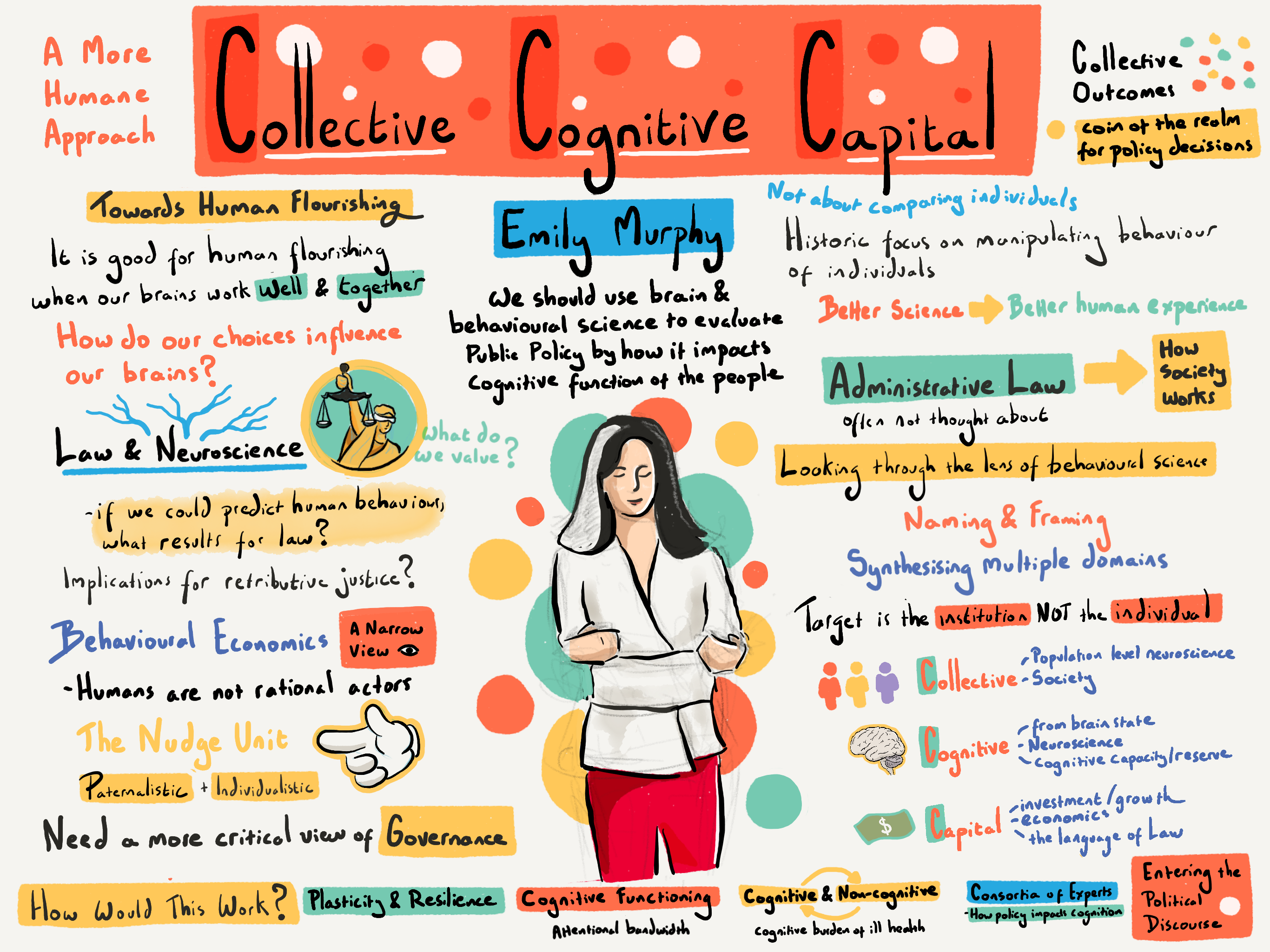
Image credit: Alex Cagan
May 2022 – Social Mobility Foundation Careers Carousel
On 26 May, Zane Mitrevica, PhD student in the Murray lab, participated in the online Social Mobility Foundation Careers Carousel to speak with secondary students interested in careers in STEM. She shared what got her into neuroscience, her routine as a neuroscientist including the highs and lows, and the skills she uses on a daily basis. Zane also discussed the reasons we use mice in neuroscientific research, during which the students were excited to hear about her experiments in detail. Read more of stories from our PhD students
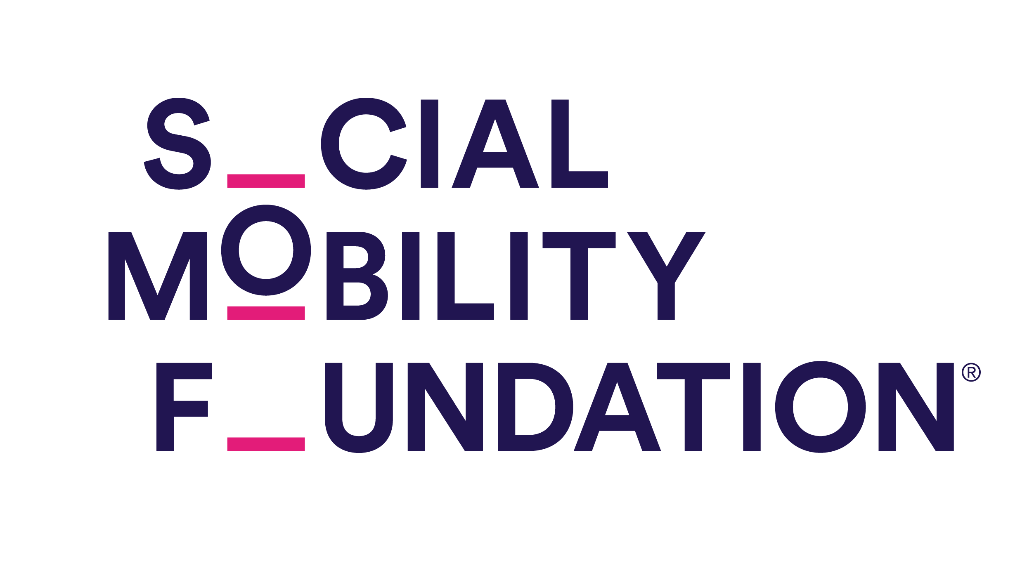
May 2022 – SWC visits William Perkin High School
On 6 May, we participated in Big Bang at School by visiting the William Perkin CofE High School to share our enthusiasm for neuroscience with students. PhD students, researchers, and staff prepared hands-on activities to engage students. These included a cerebellar adaptation experiment, Mindflex game, arm control demonstration, and more. We look forward to future visits to London schools!
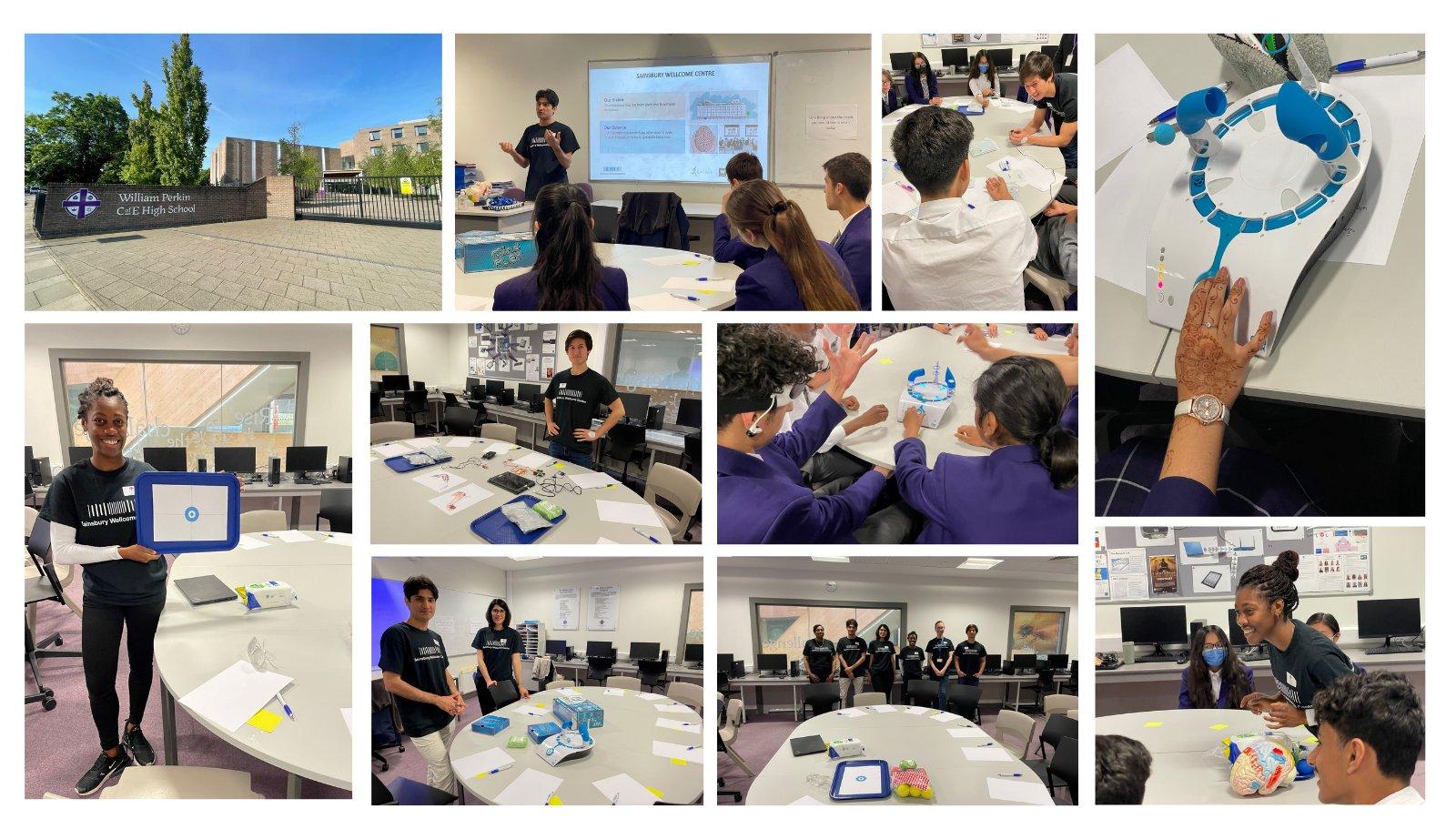
April 2022 – Baytree Centre visits SWC
On 5 April, we hosted a careers event for young people from the Baytree Centre, a social inclusion charity for women and girls based in Brixton, South London. Following an opening talk, the students had chance to tour our facilities and meet with PhD students, researchers and Professional and Scientific staff to learn about different careers in neuroscience.
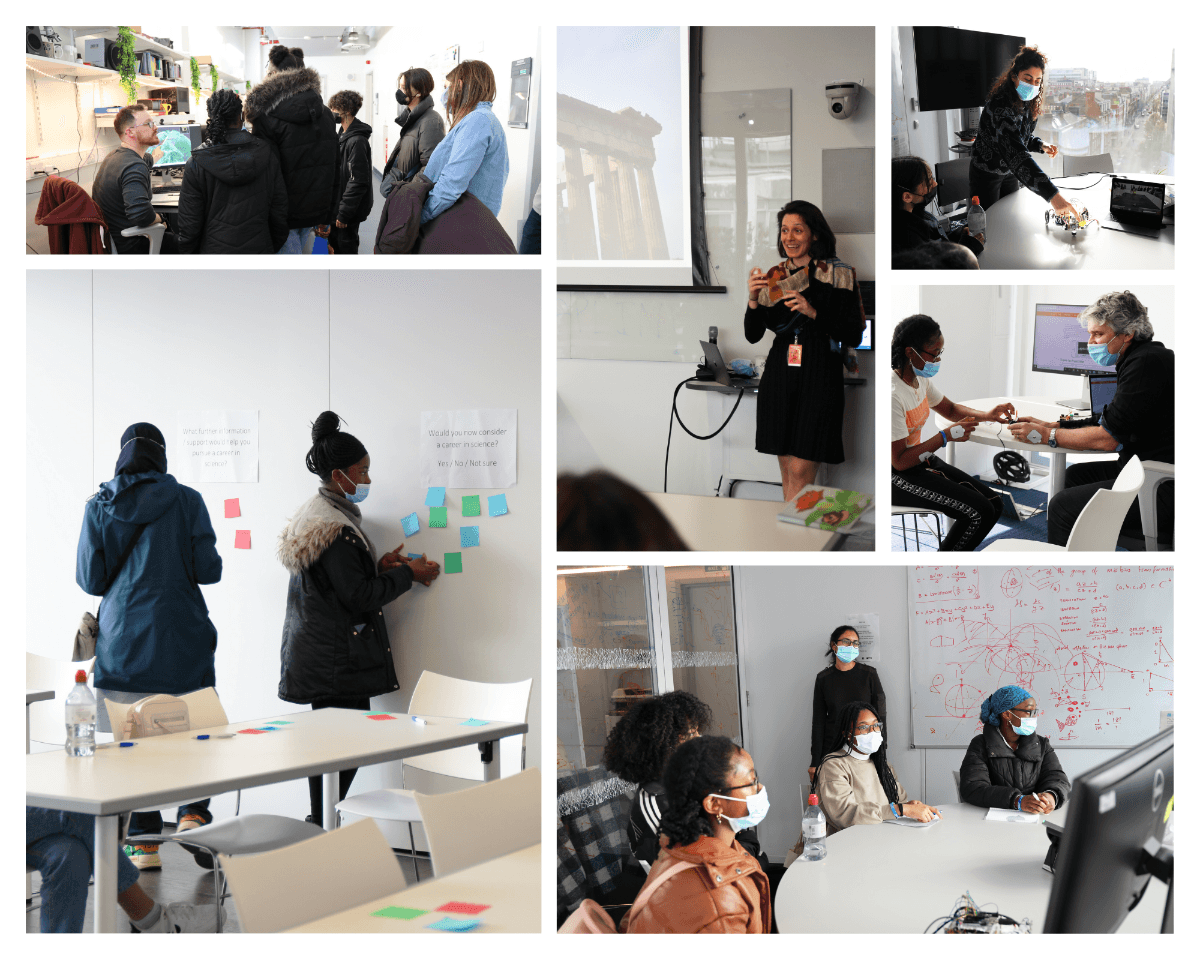
April 2022 – In2research Away Day
On 2 April, we hosted the first In2research Away Day, where In2research participants met face-to-face after a successful online mentoring programme. Along with networking opportunities, participants enjoyed a keynote talk from Dr Mark Richards, Senior Teaching Fellow, Imperial College London, and a workshop led by Simon To from Students’ Union UCL. Read the full story

Image credit: Amanda Summons Creative
March 2022 – Brain Awareness Week
Every March, Brain Awareness Week helps foster public enthusiasm and support for neuroscience.
To celebrate this year, we launched a range of activities including a virtual scavenger hunt in our facilities, neuroscience polls and images of the brain. The virtual scavenger hunt provides clues to equipment in our Advanced Microscopy, Neurobiological Research Facility, Advanced Manufacturing FabLab, and MakerSpace that enables neuroscience research. Neuroscience polls invite participants to join the conversation on various topics with leading neuroscientists. Our images of the brain showcase the behind-the-scenes wonders of conducting experimental neuroscience research.
September 2021 – Biology Week Neuroscience Quiz
In support of Biology Week, a yearly celebration organised by the Royal Society of Biology, we launched our 2021 Neuroscience Quiz. To help get their brains prepared, participants were encouraged watch our animation on YouTube about how neuroscientists are discovering the way the brain gives rise to behaviour, and read our blog post on 13 fascinating facts about the brain from leading neuroscientists.
In addition to sharing with our social media followers, several local schools in Camden took part in the quiz, which was also made available on the education resource platform Tes. The quiz was further shared through our partners including the Social Mobility Foundation, In2science and Nuffield. Thanks to all who took part and you can check-out the results of this challenge here!
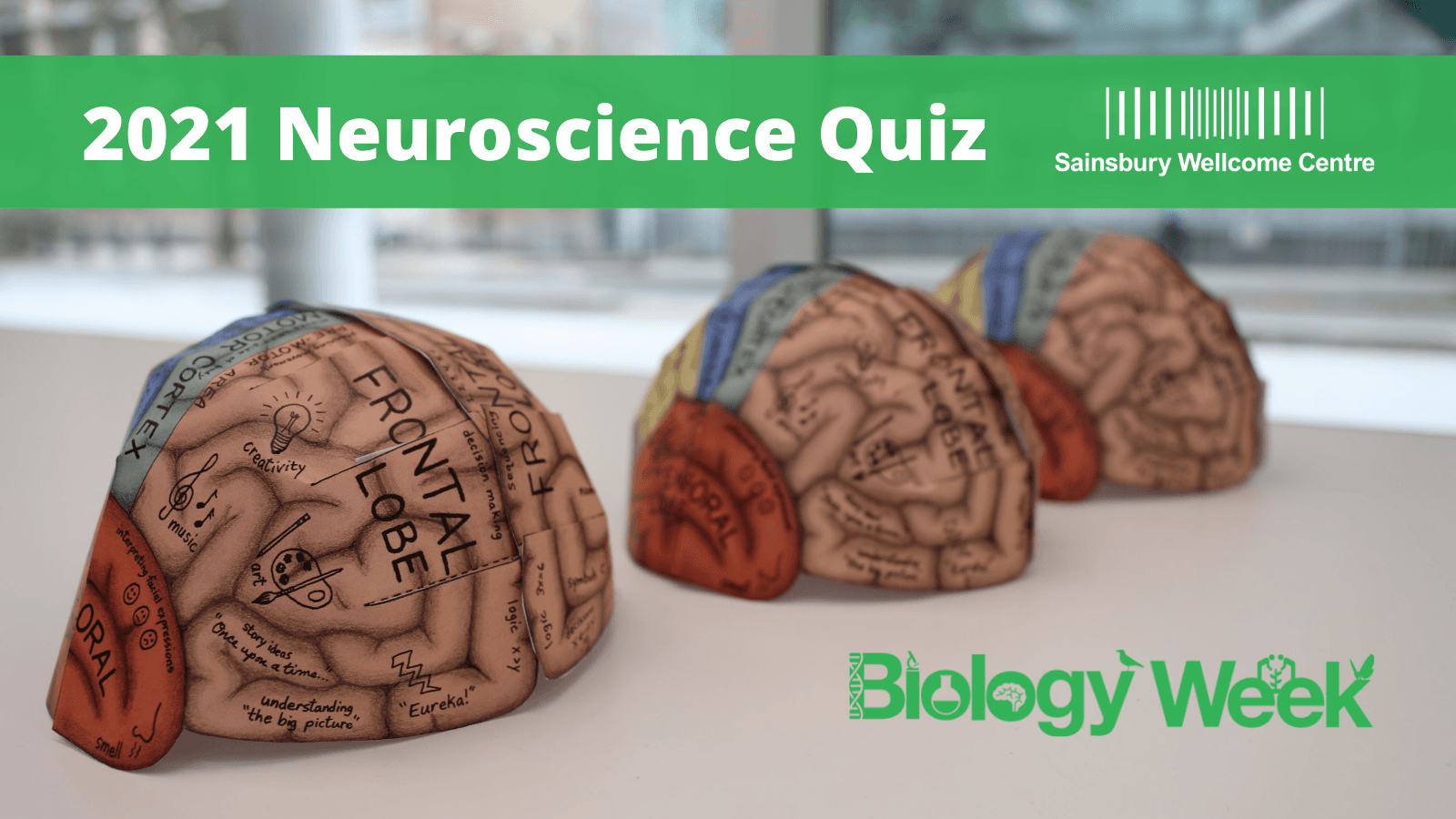
May 2021 – Social Mobility Foundation Careers Carousel
On 25 May 2021, Ali Haydaroglu and Nicole Vissers, PhD students at the Sainsbury Wellcome Centre, took part in an online event organised by the Social Mobility Foundation for secondary school students interested in career options available within the Biology and Chemistry sectors. The college students were given the opportunity to question Ali and Nicole about their experiences in neuroscience and their advice on the skills required to succeed in the sector.
Ali and Nicole shared their fascination with studying the complexity of the brain. They also discussed their favourite parts of doing a PhD, the requirements to get into neuroscience and the types of career option available after a PhD. Read more about pursuing a PhD in neuroscience

March 2021 - Brain Awareness Week
Brain Awareness Week (BAW) is a global campaign that takes place every March to foster public enthusiasm and support for neuroscience. While we were unable to host in-person activities for BAW this year, we shared our science online through launching new content on our website and across social media (Twitter, LinkedIn, Facebook and Instagram).
On March 15 we launched a new video answering one of the questions our neuroscientists often get asked: is it true, you only use 10% of your brain? Share our video to help us dispel this myth!
Also as part of our BAW 2021 activities, Nicole Vissers, PhD student, Hofer lab, shared her journey in science so far and her advice to those interested in pursuing a PhD in neuroscience. Read more in this Q&A.
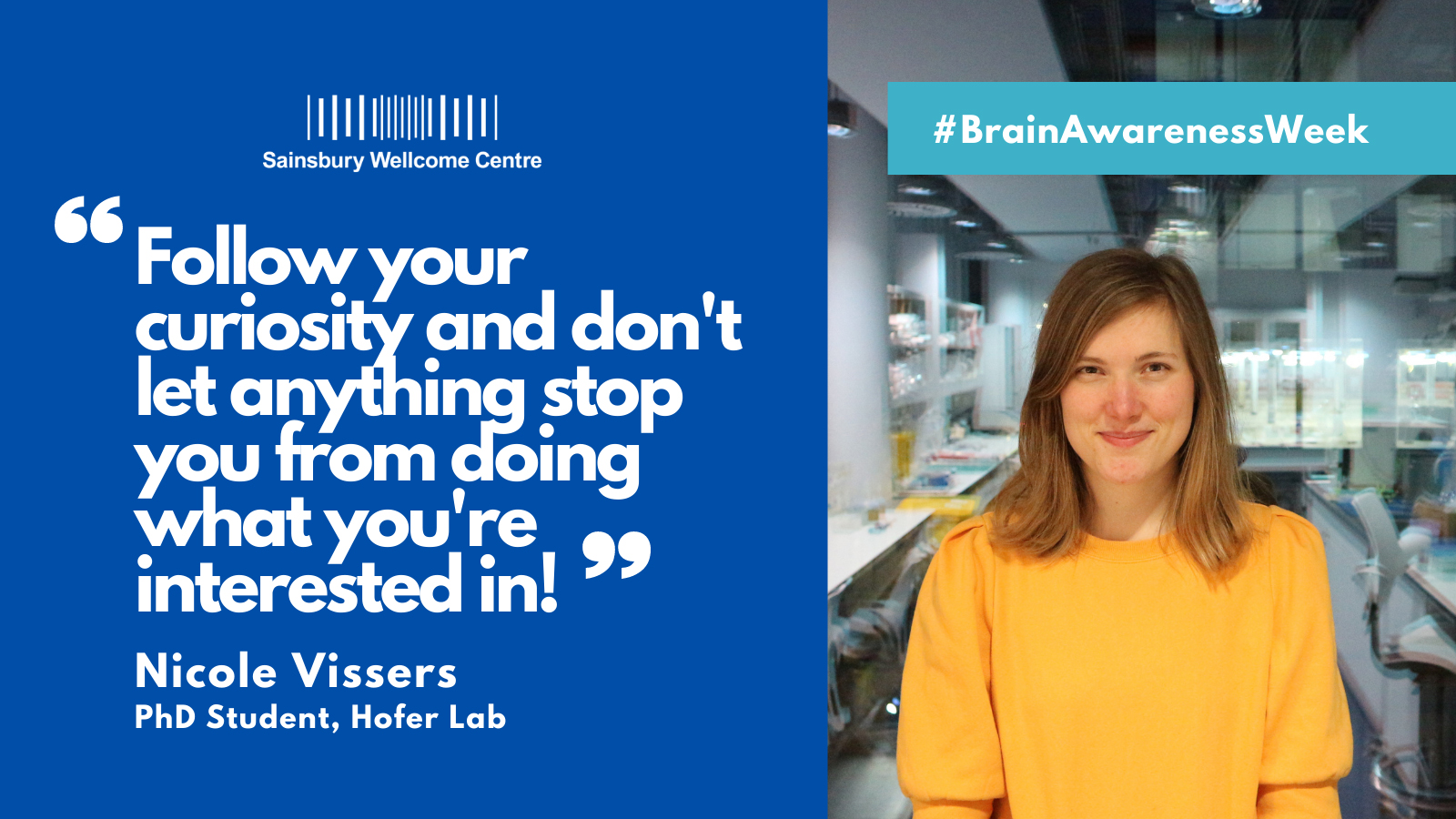
April 2020 - The Sainsbury Wellcome Centre Health and Engagement Award at the Big Bang Competition
After the unfortunate cancellation of the Big Bang Fair in March 2020, the SWC was delighted to award two groups of students competing in the Big Bang Competition with the Sainsbury Wellcome Centre Health and Engagement Award. The winning teams were from the Simon Balle All-Through School in Hertfordshire and the Hills Road Sixth Form College in Cambridge. The Simon Balle students’ project, entitled “Can Teeny Changes Change the Canteen”, attempted to make their school healthier through nudge psychology. The students from Hills Road designed a device to better diagnose and treat repetitive strain injury in their ‘smart glove’ project. Read more about the students and the award here.
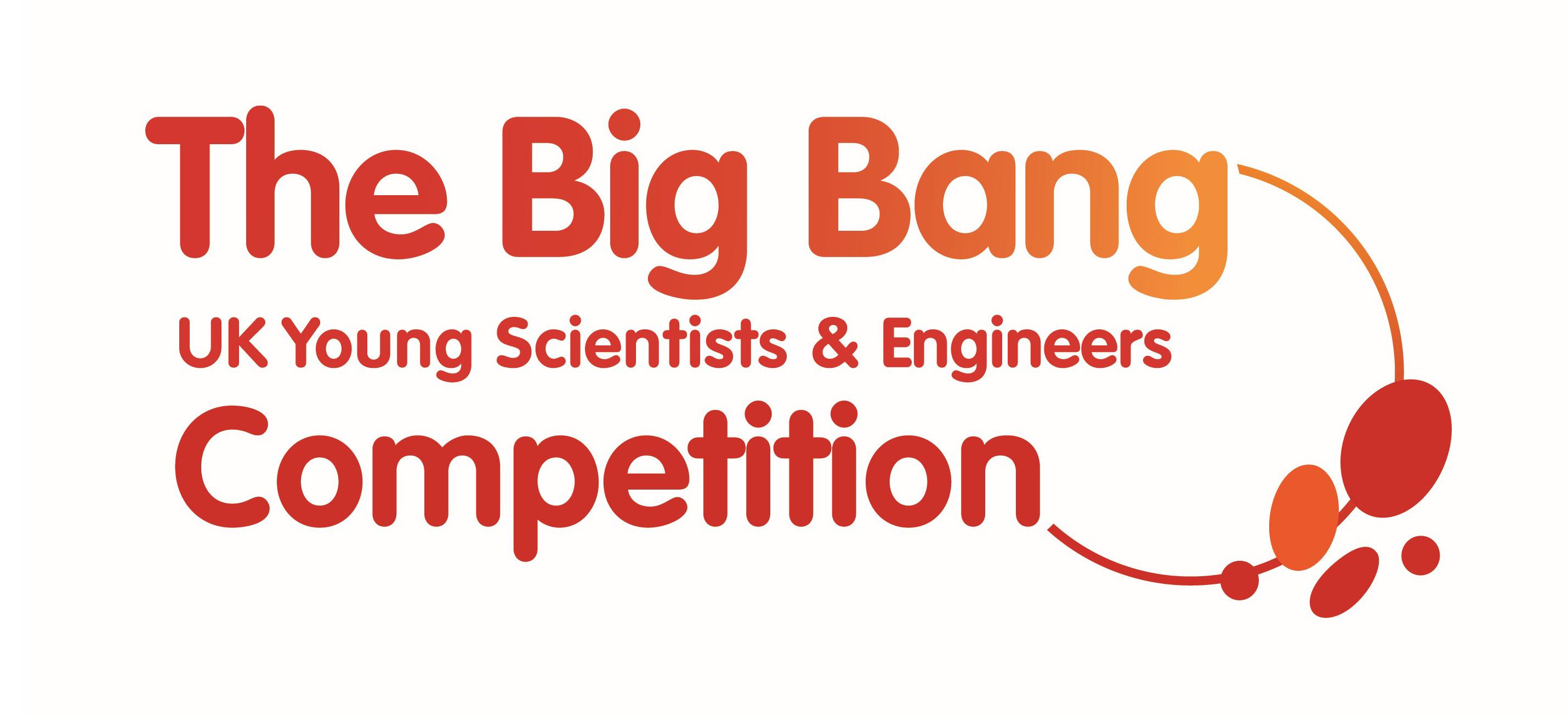
January 2020 - Sonja Hofer visits LAE Tottenham
On 16 January, SWC Group Leader Sonja Hofer visited the London Academy of Excellence Tottenham to talk to year 13 students about neuroscience and the scientific process. After giving a lecture to the entire year group, Sonja was joined for lunch by six university-bound students intending to study science and medicine.
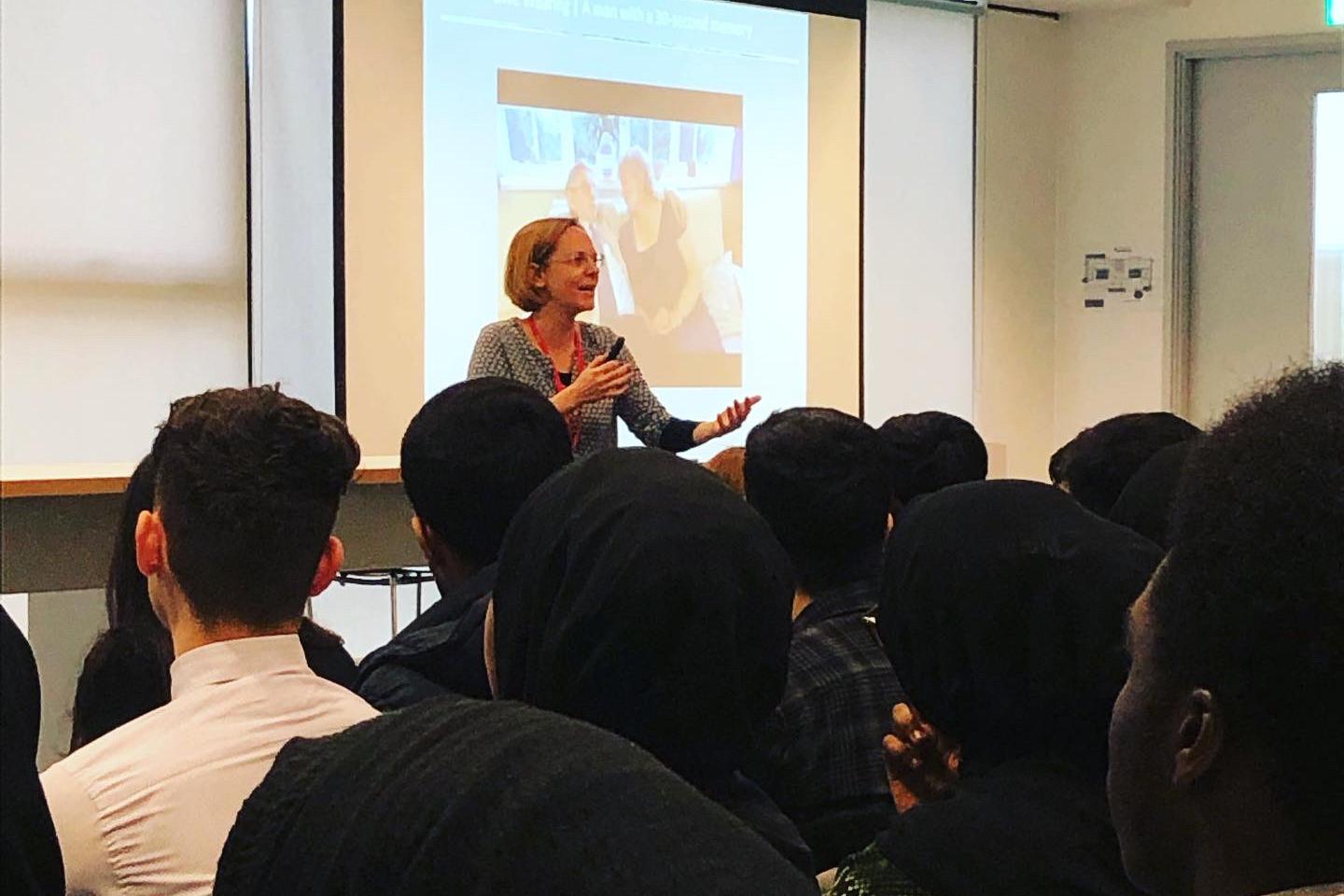
December 2019 - SWC Annual Lecture, by Professor Alice Roberts
On 6 December 2019 Professor Alice Roberts visited the SWC to give a lecture entitled ‘The Origins of Culture: Archaeological evidence for the emergence of modern human behaviour’ as part of the centre’s SWC Annual Lecture series. Alice is a biological anthropologist, television presenter, and professor of public engagement. The SWC was proud to welcome colleagues across UCL and members of the broader London community, including students working with the Social Mobility Foundation.
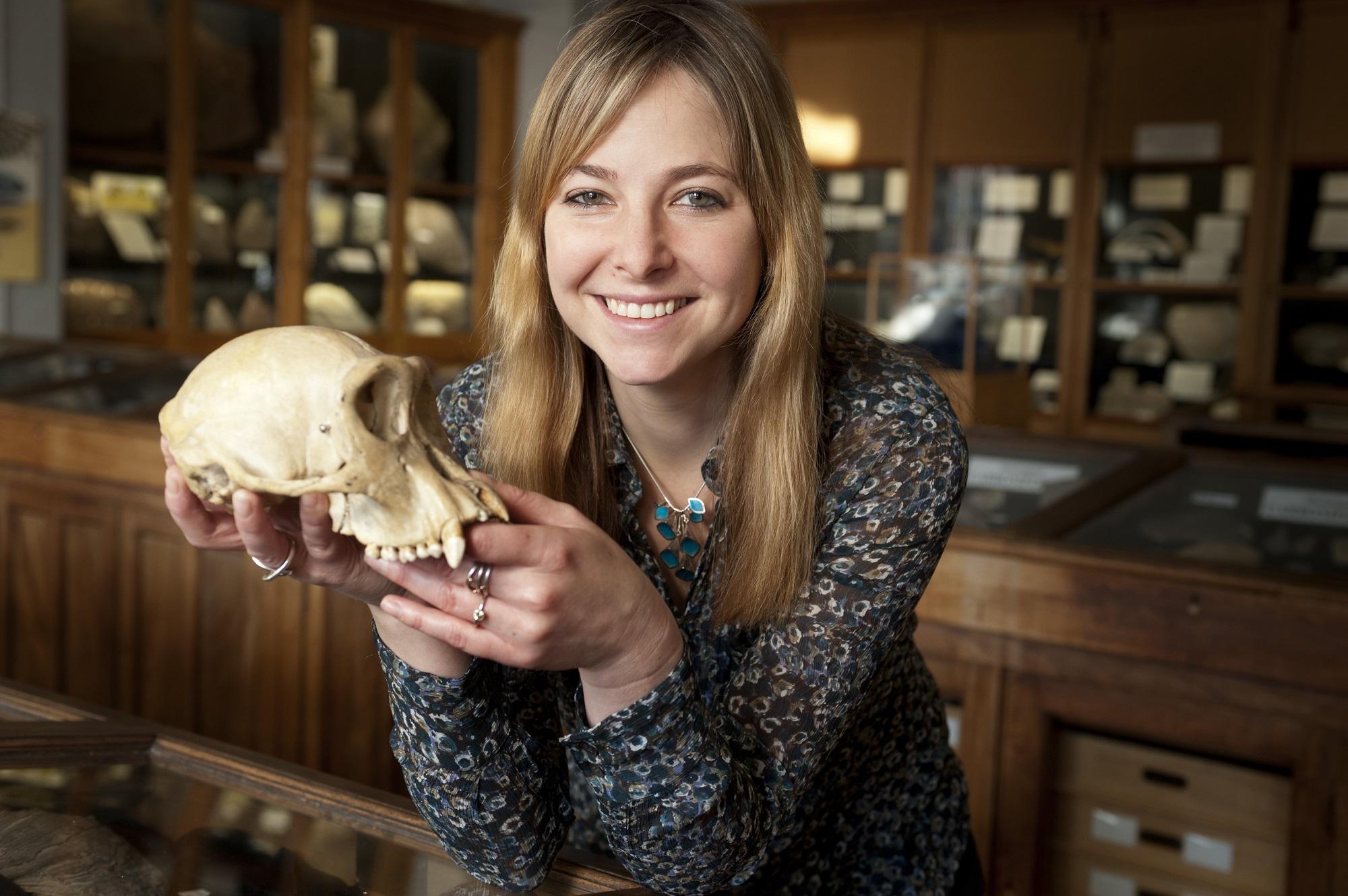
Image credit: University of Birmingham
October 2019 - Experimental Stories Workshop
The Sainsbury Wellcome Centre played host to a workshop co-organised by Wellcome and the BBC. Over two days of brainstorming, top researchers and radio producers collaborated on pitches for radio shows or miniseries focusing on communicating science.
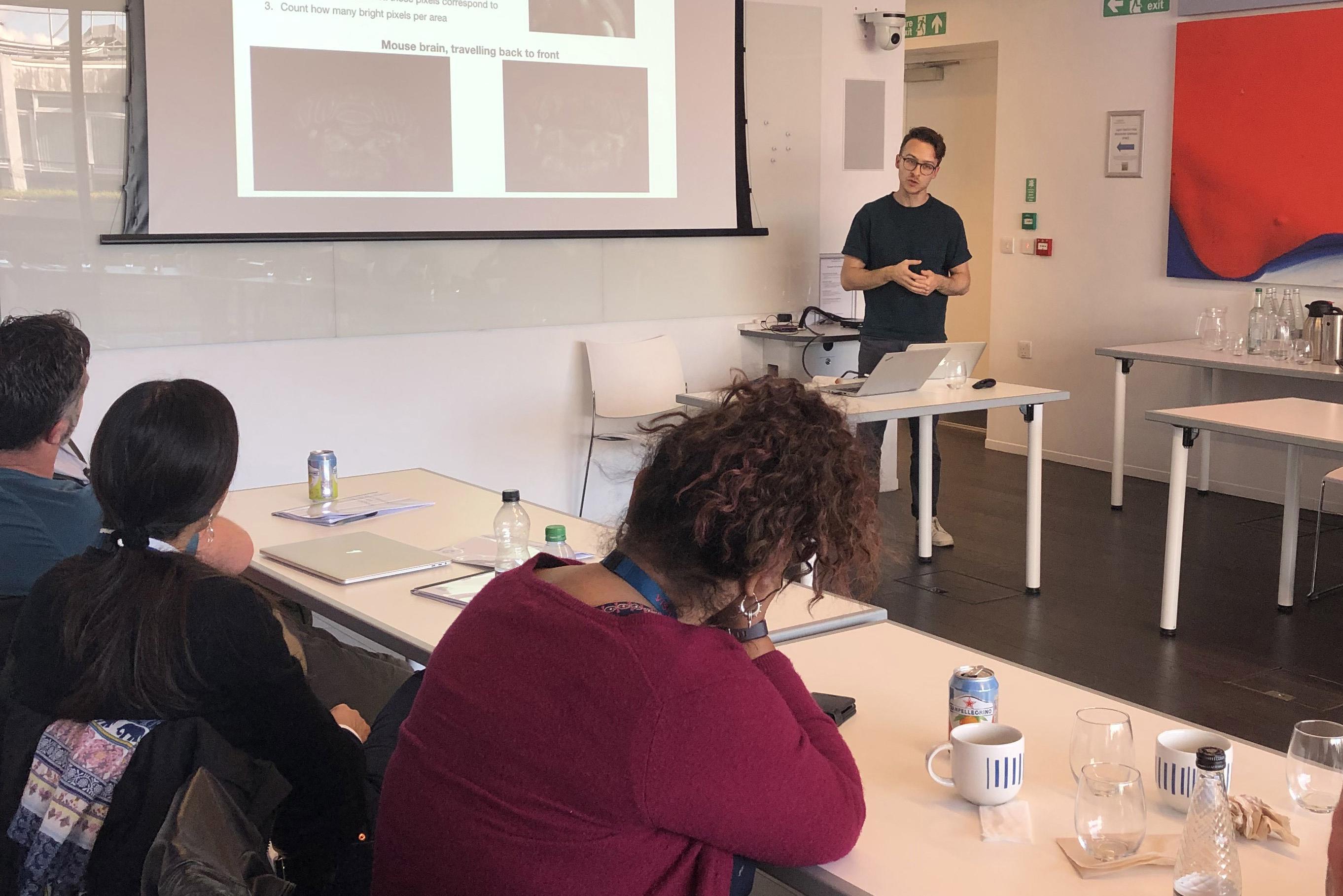
Spring 2019 - Dear Neuroscience
The SWC hosted a series of ‘Dear Neuroscience’ events where artists, crafters, parents and neuroscientists joined forces to co-create explorations of neuroscience "in the wild". Neuroscience research today focuses heavily on studying nervous systems in sterile and predictable environments, but brains evolved in the messy, unpredictable world full of the unknown and the unexpected.
Neuroscience now has the technology to complement laboratory research with fieldwork, which we believe to be crucial for understanding the human mind. “Dear Neuroscience” provided the opportunity for artists, crafters and parents of young children, who have each refined a highly motivated and skillfully observant relationship with wild neural phenomena, to share their questions, insights, and hopes with the neuroscience community.
Find out more about the Dear Neuroscience Touch and Proprioception Event on Friday 24 May
May 2019 - Big Bang @ School Event
On 10 May 2019, SWC PhD students, researchers and staff engaged in a Big Bang @ School Event at William Perkin High School in Greenford, West London. Year 10 students took part in an interactive neuroscience quiz debunking common myths about the brain and then rotated through three different activities including a robot demonstration, a microfluidics exercise and the chance to control someone else's arm with their brain!
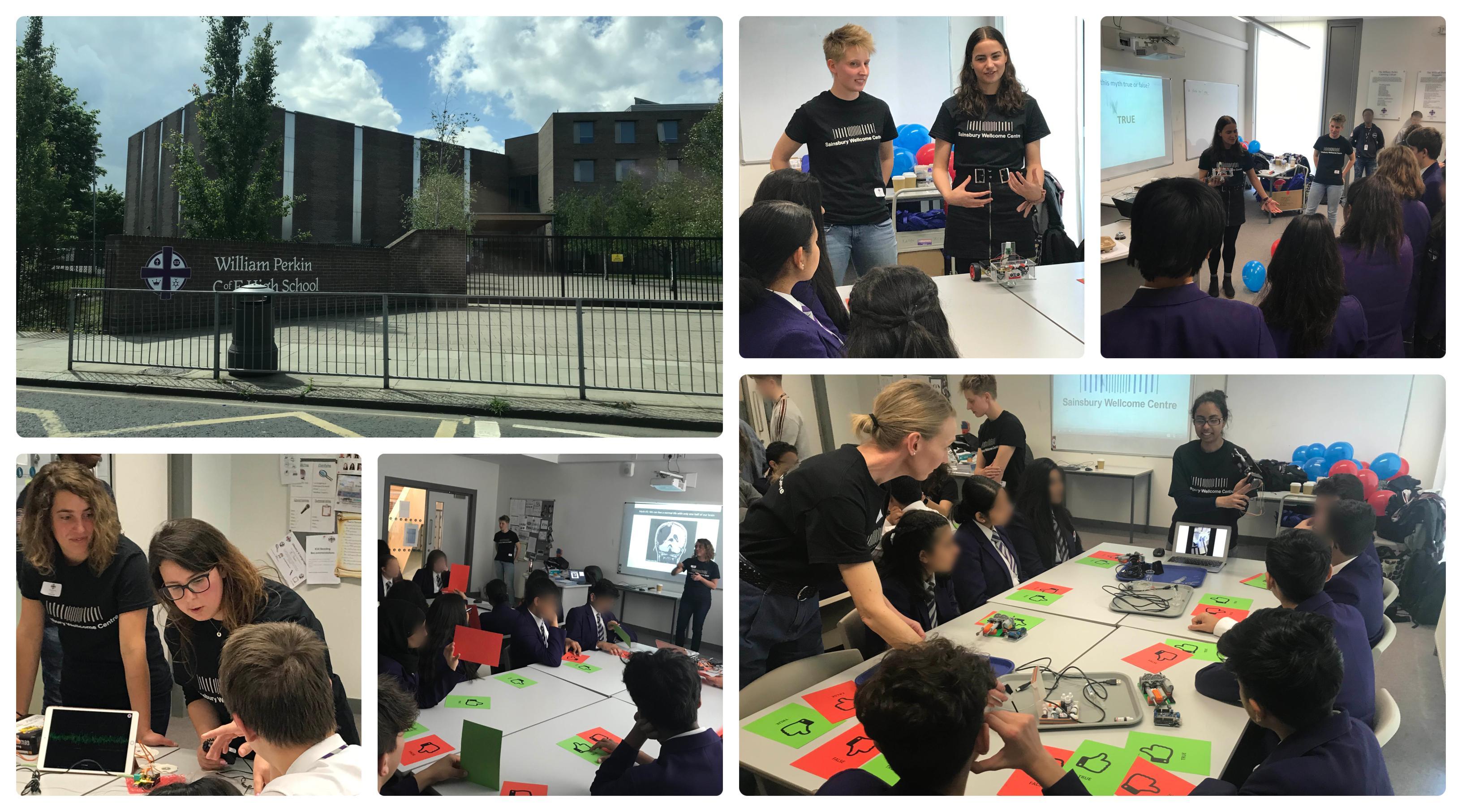
March 2019 - Brain Awareness Week
As part of Brain Awareness Week (March 11-17, 2019) we launched an animation on the research questions we focus on at the Sainsbury Wellcome Centre. We also shared 13 fascinating facts about the brain from leading neuroscientists and 5 common myths about neuroscience.
January 2019 - Westminster Kingsway Lab Tour
A-Level Psychology and Biology students from local college Westminster Kingsway visited the Sainsbury Wellcome Centre in January for a lab tour. Following an introductory neuroscience talk, the students met with researchers, visited the labs, the microscopy facility and the fabrication workshop. They also had the chance to see and hear the electrical activity from their brain when tensing their arm muscle and tried out controlling someone else's arm with their brain!
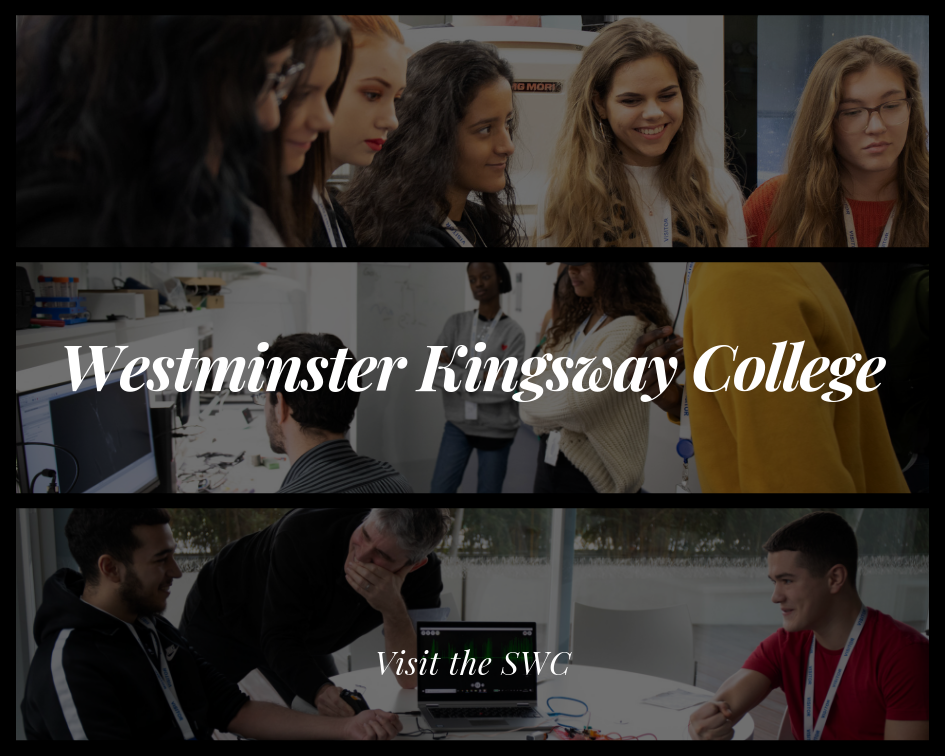
December 2018 - Public Lecture, by Professor Daniel Dennett
American philosopher, writer and cognitive scientist Professor Daniel Dennett gave the SWC Public Lecture 2018 titled 'Answering the Hard Question by Composing the Inner Witness'. Over 140 people attended this lecture including local students on the Social Mobility Foundation programme. Read more
September 2018 - New Scientist Live
The SWC exhibited a range of interactive demonstrations at New Scientist Live this year including visual illusions, Flavour SenseNation activities, a VR demo and jelly brain dissections. Find out more about our stand.
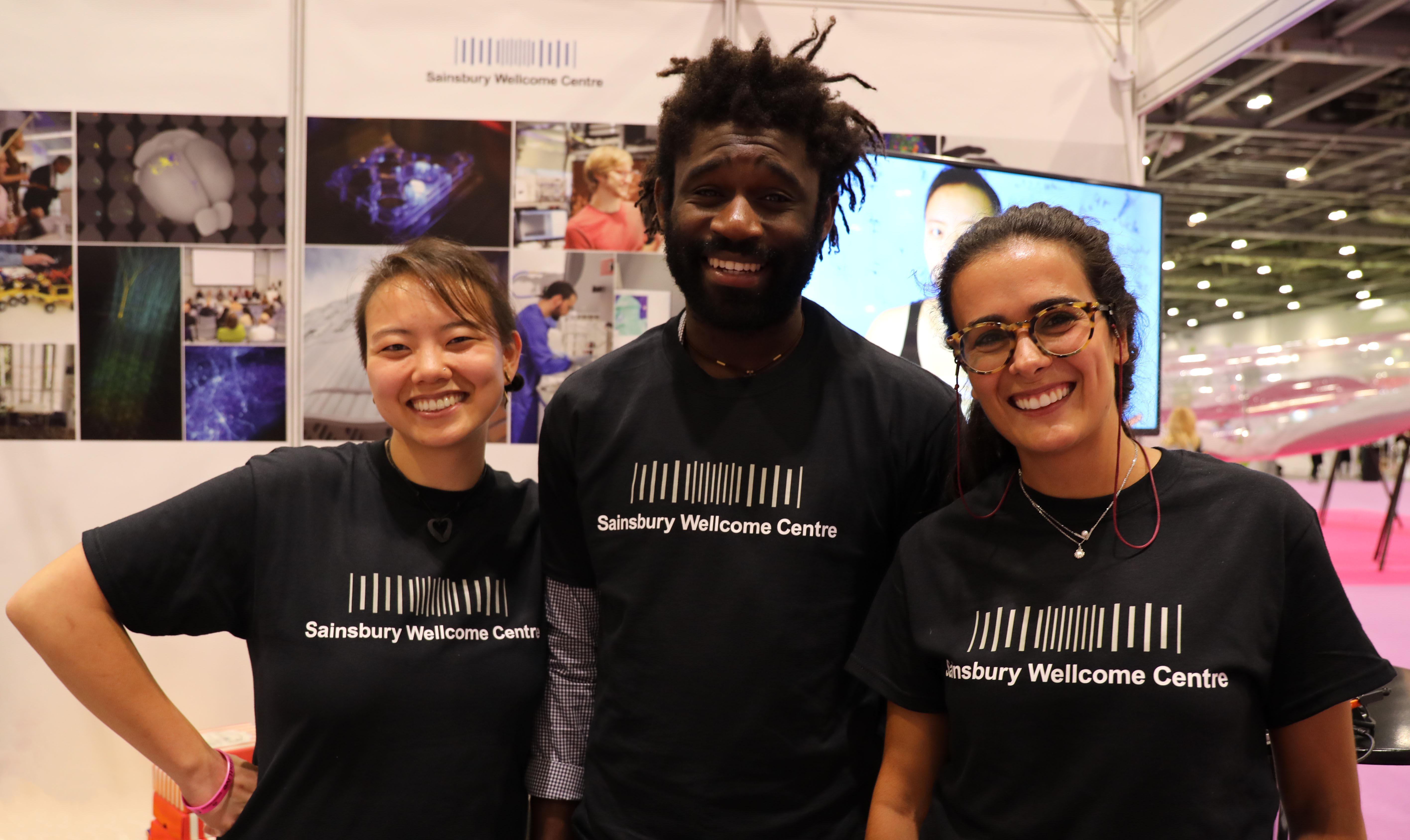
July 2018 - Social Mobility Foundation Tour
The SWC recently hosted a group of students from the Social Mobility Foundation programme, which is open to students across the UK who are eligible for Free School Meals, or will be the first generation in their families to attend university having attended a school with a significant proportion of pupils on FSM, and who are predicted at least ABB at A-Level and have obtained at least five A grades at GCSE.
After a short talk on how the brain works, the students were taken on tours of the different labs in the building and shown demonstrations on anatomy, innate behaviour, virtual reality (VR) and advanced manufacturing. Finally, they attended lunch with students, staff and researchers at the SWC where discussions continued.
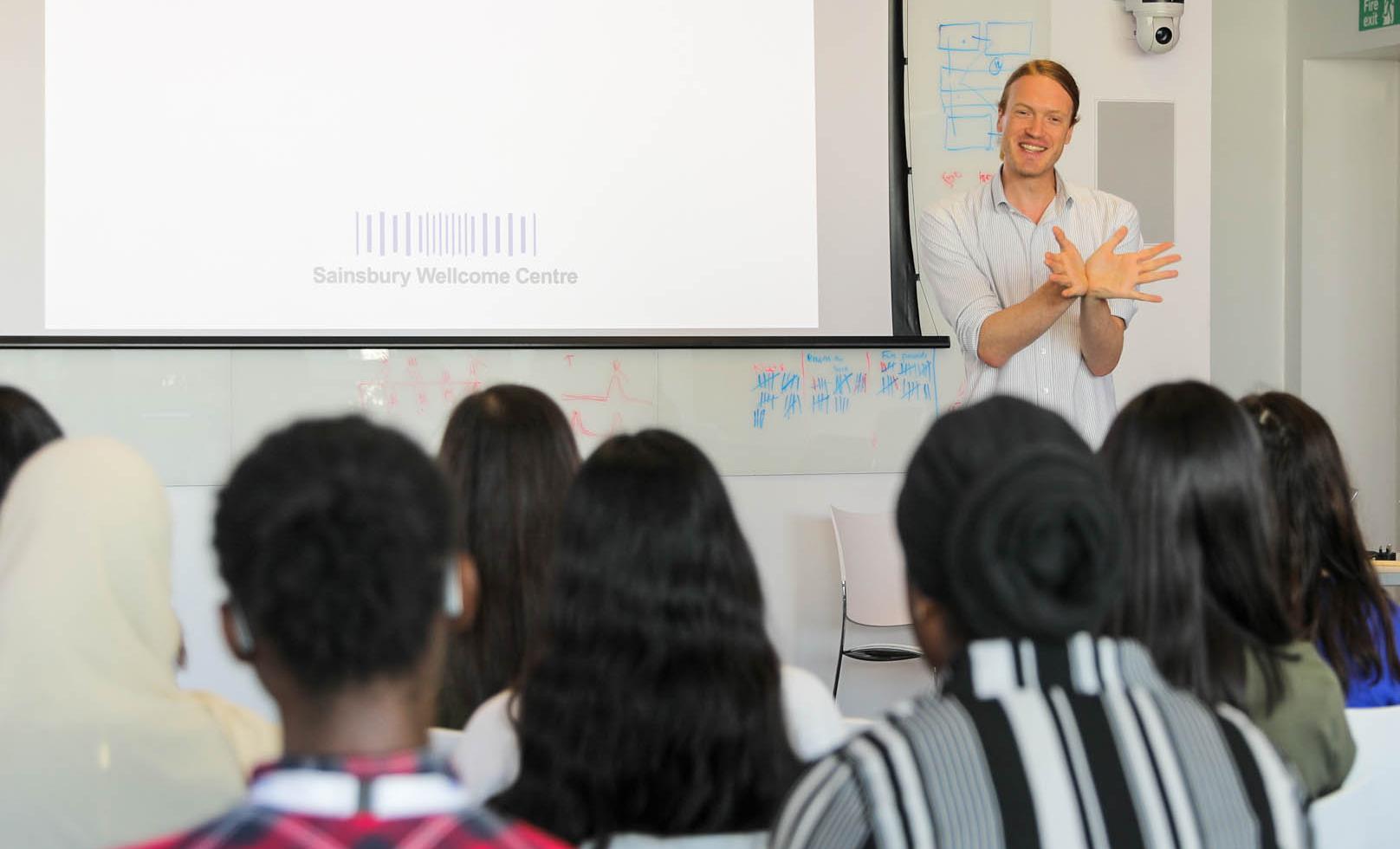
June 2018 - Orchestrating the Brain
In collaboration with FitzFest, a local community music and culture festival, the Sainsbury Wellcome Centre was pleased to present ‘Orchestrating the brain’ a stimulating workshop exploring the fusion of music and neuroscience.
The vision behind the event sprung from conversations between musicians and neuroscientists and the shared concepts of neurons in the brain functioning like instruments in an orchestra, but with one perplexing difference – as far as we know, there is no ‘conductor’ in the brain.
Through a series of interactive exercises, musicians and neuroscientists worked together to delve into the connections between music and neuroscience and even attempted to play brain activity data generated by the SWC researchers as if they were notes on a player piano.
After a lively panel discussion, both musicians and neuroscientists were left with a many more questions to explore including: Why is it easier to remember words when set to music? Do certain notes have specific effects on brainwave frequencies and emotions? Which (if any) animals respond emotionally to music?
April 2018 - Brain Camp Kosovo
A group of five PhD students from the SWC led a week-long intensive neuroscience programme in Kosovo with the goal of motivating and inspiring young people to invest their time in science.
Thanks to the Kosovan Ambassador to the UK, the SWC collaborated with ATOMI, an organization that identifies and supports children with extraordinary intelligence (IQ 140 and above, 99.6 percentile rank – top 0.4% of the population).
The week long programme was a great success and also gave the students a chance to ask the SWC some challenging questions on the brain including: Why do we sleepwalk? What is synaesthesia? What happens when we have anxiety or panic attacks? What happens when we experience adrenaline? How plastic is the mature brain? Where do memories get stored and how are they retrieved? Are there differences between an average person’s brain and Einstein’s brain? How does the brain represent the passing of time?
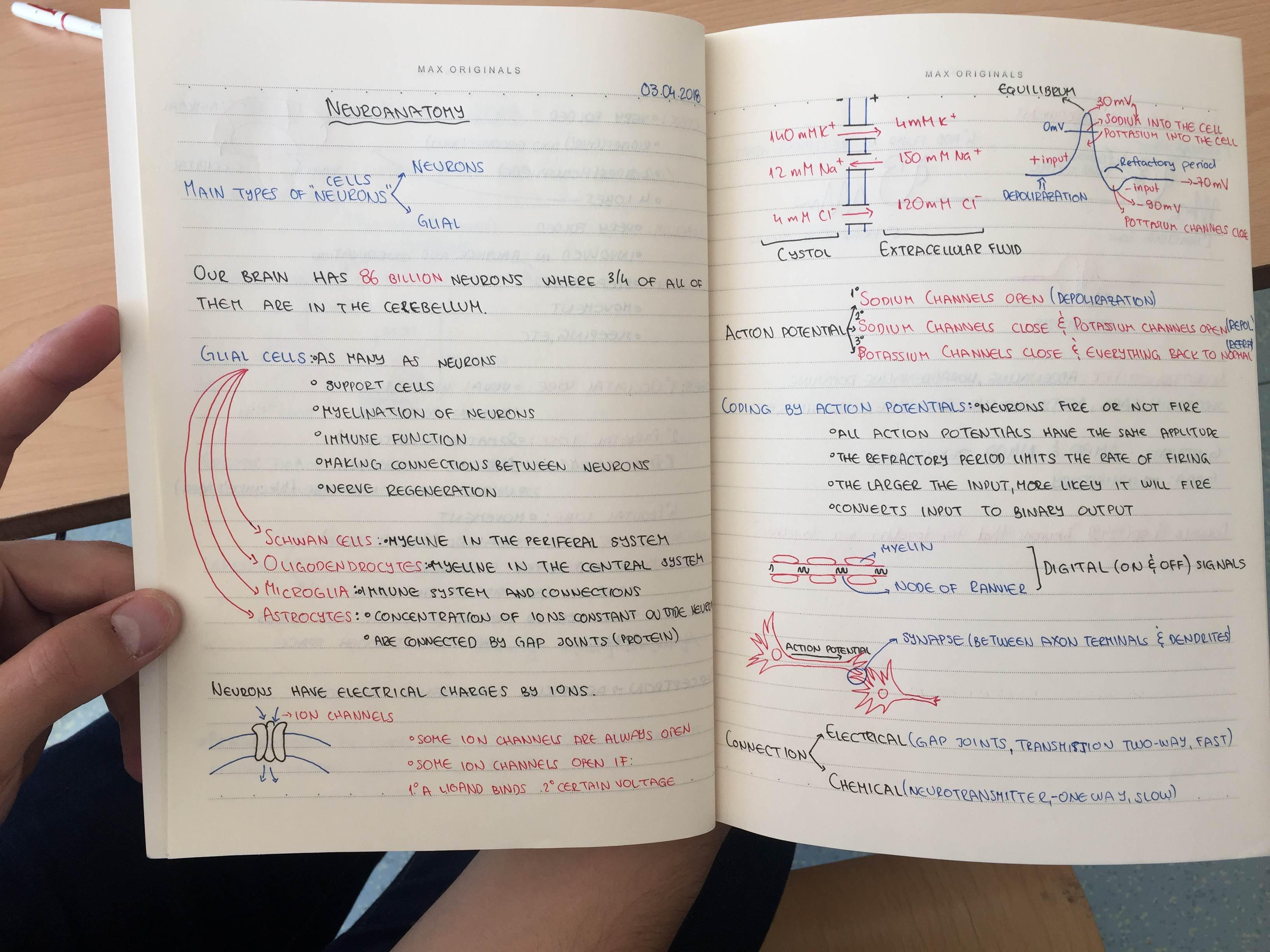
March 2018 - Brain Bee
The SWC was pleased to host the London Brain Bee championship during Brain Awareness Week 2018. The Brain Bee competition brings together secondary school students aged 14-19 and aims to inspire and motivate participants to learn more about the brain and explore potential careers in neuroscience.
After a welcome session, where the SWC launched the first of a series of Neuropeople videos, offering advice to students interested in neuroscience, the students completed a multiple choice quiz on a range of topics including: intelligence, emotion, memory, sleep, vision, hearing, sensation and a number of neurological conditions including Alzheimer’s, Parkinson’s, stroke, schizophrenia, epilepsy, depression and addiction.
There was also a series of practical demonstrations over lunchtime including a jelly brain dissection, visual illusions and an interactive activity exploring the hidden science behind our appreciation of food. These were followed by some fascinating talks on careers in neuroscience.
Finally, the excitement continued with a nail-biting "spelling bee" style final round. After as tense tie-breaker for the top place, the final results were announced and the winners went through to the National Brain Bee competition.
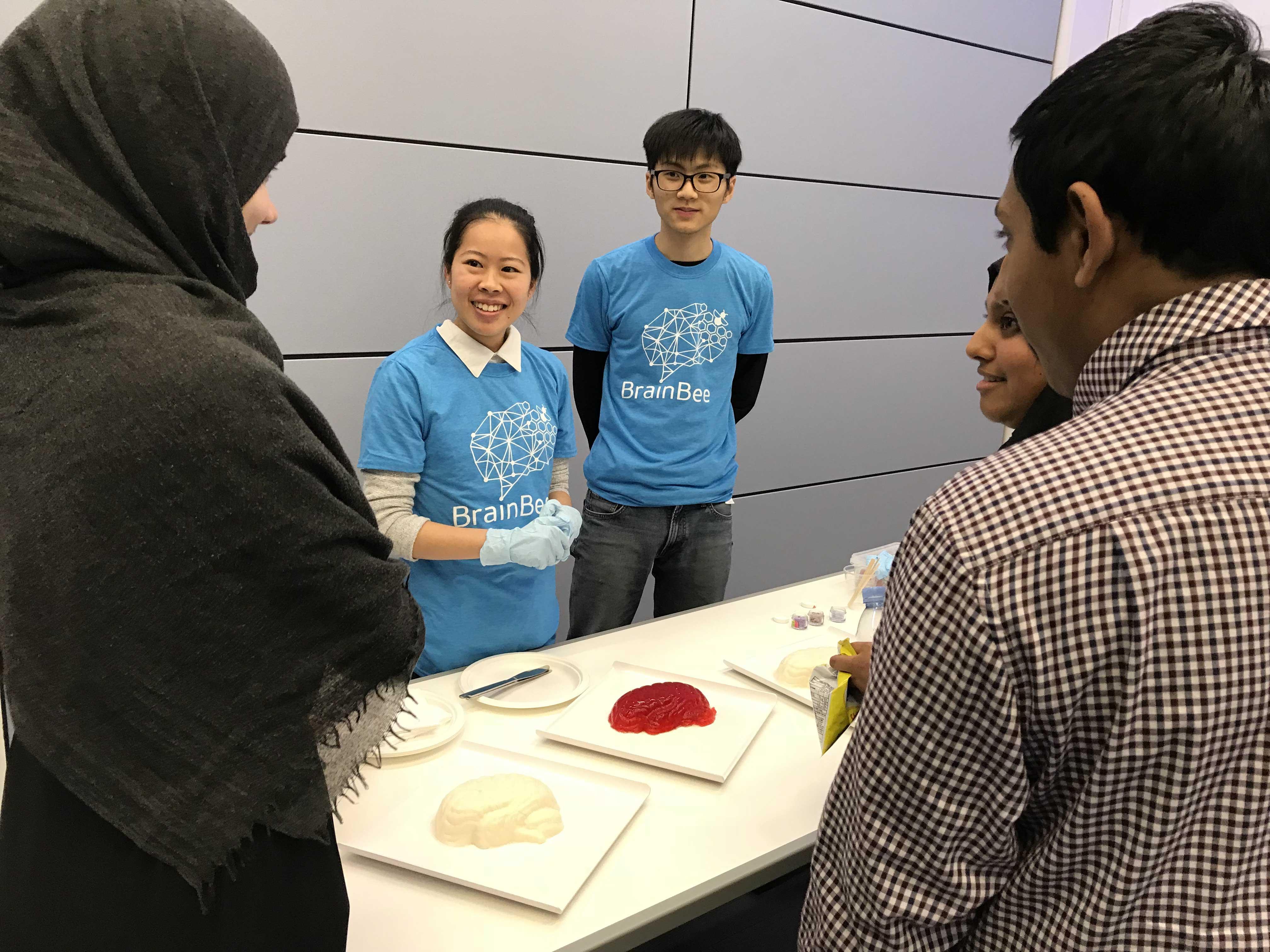
March 2018 - Neuropeople
The recent boom in allegations of ‘fake news’ has driven trust in experts to an all-time low. To try to encourage more confidence back into the scientific community, the SWC created a series of ‘Neuropeople’ videos where neuroscientists were asked questions on free will, brain hacks, advice for those interested in neuroscience and the future of the field.
The films featured experts from the SWC, Gatsby Computational Neuroscience Unit, King's College London, Imperial College London and the Francis Crick Institute and are all available on our YouTube channel.
November 2017 - SWC Annual Lecture, by Professor Frans de Waal
Professor Frans de Waal captivated attendees of the 2017 SWC Annual Lecture on Animal Emotions and Empathy. Open to all, including local secondary school students, Professor de Waal gave a fascinating history of the study of emotions followed by an enlightening discussion of empathy, consolation and emotional contagion.
September 2017 - New Scientist Live
The SWC exhibited at New Scientist Live 2017, sharing our science with an engaged and curious audience of over 30,000 people. Our stand included anatomy and VR demonstrations along with a video on what neural circuits are and some of the techniques we use at the SWC to try to understand them.
March 2017 - Brain Awareness Week
As part of BAW - a global campaign to increase public awareness of the progress and benefits of brain research - children from years 5 and 6 of All Souls Primary School in Fitzrovia visited the SWC to find out more about how the brain works. The children took part in a range of hands-on activities including jelly brains and an electrophysiology experiment.
March 2017 - Rewired: the Brain, Art and Innovation
Members of the SWC Public Engagement Network took part in an inspiring evening featuring connections between neuroscience, art and health. Group leader Dr Adam Kampff presented a talk on enhancing intelligence with virtual reality, while others engaged audience members with our research, using a QR code web link on one of our squeezy brains.
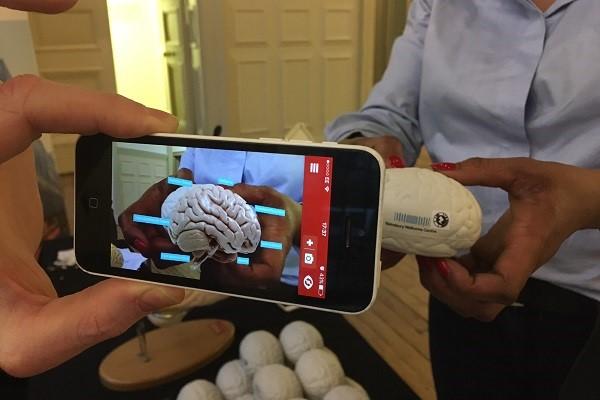
December 2016 - SWC Annual Lecture, by Sir David Attenborough
Sir David Attenborough gave the inaugural Annual Lecture on 7 December 2016 at the Sainsbury Wellcome Centre. His talk 'Beauty and The Beasts' focused on the aesthetic sensation in birds.
Over 140 people attended this public event, including local community members from Fitzrovia as well as secondary school groups from Camden.
You can see part of the lecture on our YouTube channel.
December 2016 - SWC Lab Tour for Schools
Students from the UCL Academy and Regent High School visited the SWC and were given a tour of the laboratories ahead of hearing from a number of post docs and group leaders about the research they do and how it is relevant.